Laird Connectivity 4X90200 RF Transceiver Module User Manual 4790 User s Manual
AeroComm Corporation RF Transceiver Module 4790 User s Manual
Contents
- 1. Users Manual 1
- 2. Users Manual 2
Users Manual 2
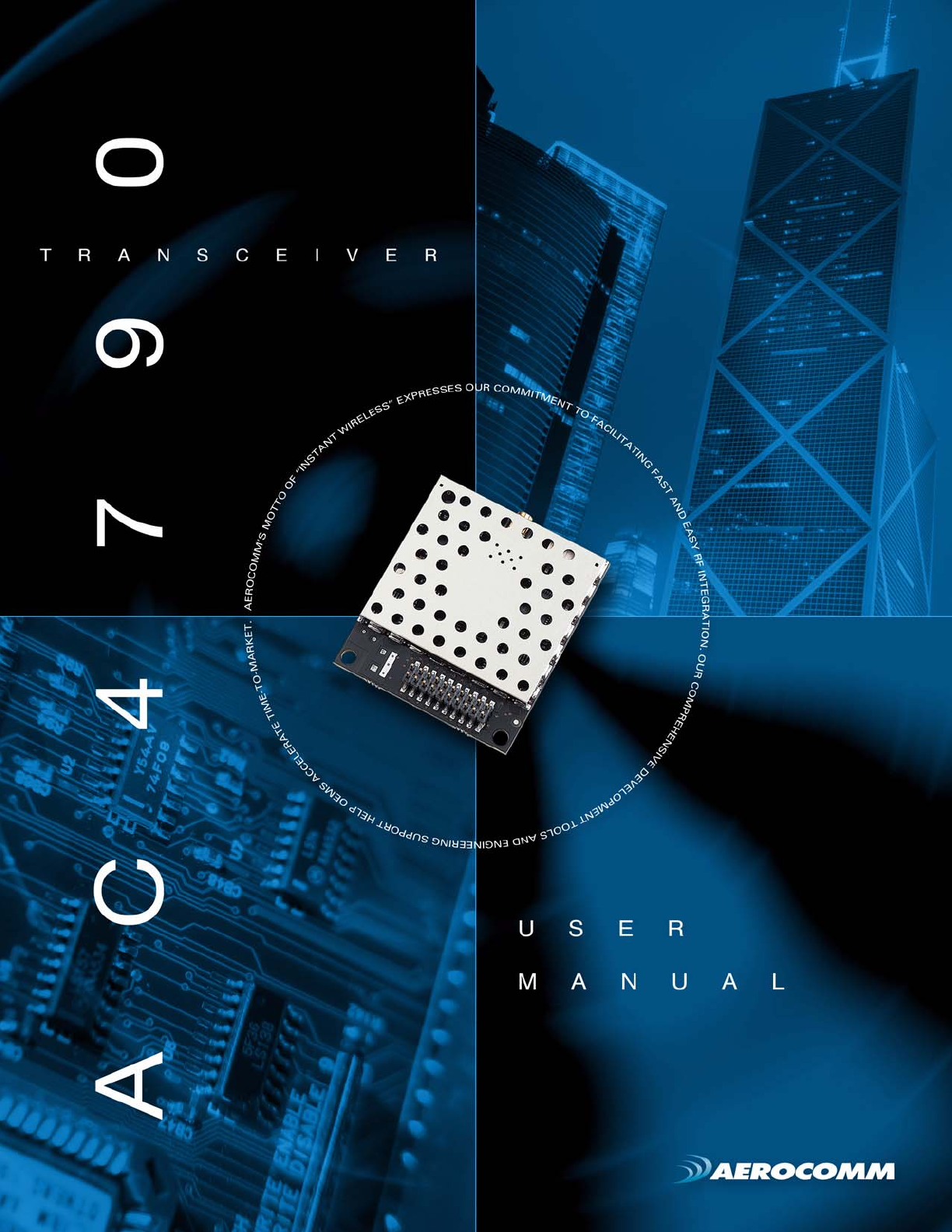
VERSION 1.7

Contents
AC4790 TRANSCEIVER MODULE 1
AC4790 features 1
Overview 1
SPECIFICATIONS 3
Pin Definitions 5
Electrical Specifications 7
THEORY OF OPERATION 8
Masterless Architecture 8
Modes of Operation 8
Transmit Mode 8
Receive Mode 9
Command Mode 10
API CONTROL 11
API Transmit Packet 12
API Send Data Complete 12
API Receive Packet 12
SERIAL INTERFACE 14
Serial Communications 14
Asynchronous Operation 14
Parity 14
OEM Host Data Rate 15
Serial Interface Baud Rate 15
Interface Timeout / RF Packet Size 16
Flow Control 17
Half Duplex / Full Duplex 17
System Timing & Latency 17
System Throughput 18
Random Backoff 18
Networking 19
Max Power 20
HARDWARE INTERFACE 21
Pin Definitions 21
Generic I/O 21
TXD & RXD 21
CTS 21
RTS 21
Test / 9600 Baud 22
RSSI 22
UP_Reset 23
Command/Data 23
AD In 23
Session Status 23
CONFIGURING THE AC4790 24
AT Commands 24
On-the-Fly Control Commands 25
Command Descriptions 27
EEPROM PARAMETERS 32
DIMENSIONS 36
Mechanical Drawings 36
ORDERING INFORMATION 40
Product Part Number Tree 40
Developer Kit Part Numbers 40
COMPLIANCY INFORMATION 41
AC4790-1x1 41
Agency Identification Numbers 41
Approved Antenna List 41
FCC / IC Requirements for Modular Approval 42
OEM Equipment Labeling Requirements 42
Antenna Requirements 43
Warnings required in OEM Manuals 43
Channel Warning 43
APPENDIX I - SAMPLE POWER SUPPLY 44
Bill of Materials 44
Schematic 45
PCB Layout 45
APPENDIX II - 5V TO 3.3V LEVELS 47
Voltage Level Conversion IC’s 47
Passive Resistor Voltage Divider 47
APPENDIX III - API 48
Polling Network 48
Addressed Transmit API 49
Broadcast Transmit API 49
Receive API 50
Normal Receive Mode (non-API) 51
Daisy Chain / Repeater Network 51
Loopback Repeater 52
Time Division Multiple Access Network 53
APPENDIX IV - API TIMING DIAGRAMS 54
Timing Diagrams 54

DOCUMENT INFORMATION
Copyright © 2007 AeroComm, Inc. All rights reserved.
The information contained in this manual and the accompanying software programs are copyrighted and all rights are
reserved by AeroComm, Inc. AeroComm, Inc. reserves the right to make periodic modifications of this product without
obligation to notify any person or entity of such revision. Copying, duplicating, selling, or otherwise distributing any
part of this product or accompanying documentation/software without the prior consent of an authorized
representative of AeroComm, Inc. is strictly prohibited.
All brands and product names in this publication are registered trademarks or trademarks of their respective holders.
This material is preliminary
Information furnished by AeroComm in this specification is believed to be accurate. Devices sold by AeroComm are
covered by the warranty and patent indemnification provisions appearing in its Terms of Sale only. AeroComm makes
no warranty, express, statutory, and implied or by description, regarding the information set forth herein. AeroComm
reserves the right to change specifications at any time and without notice.
AeroComm’s products are intended for use in normal commercial and industrial applications. Applications requiring
unusual environmental requirements such as military, medical life-support or life-sustaining equipment are specifically
not recommended without additional testing for such application.
Limited Warranty, Disclaimer, Limitation of Liability
For a period of one (1) year from the date of purchase by the OEM customer, AeroComm warrants the OEM
transceiver against defects in materials and workmanship. AeroComm will not honor this warranty (and this warranty
will be automatically void) if there has been any (1) tampering, signs of tampering; 2) repair or attempt to repair by
anyone other than an AeroComm authorized technician.
This warranty does not cover and AeroComm will not be liable for, any damage or failure caused by misuse, abuse,
acts of God, accidents, electrical irregularity, or other causes beyond AeroComm’s control, or claim by other than the
original purchaser.
In no event shall AeroComm be responsible or liable for any damages arising: From the use of product; From the loss
of use, revenue or profit of the product; or As a result of any event, circumstance, action, or abuse beyond the control
of AeroComm, whether such damages be direct, indirect, consequential, special or otherwise and whether such
damages are incurred by the person to whom this warranty extends or third party.
If, after inspection, AeroComm determines that there is a defect, AeroComm will repair or replace the OEM transceiver
at their discretion. If the product is replaced, it may be a new or refurbished product.

DOCUMENT INFORMATION
Revision Description
Version 1.0 2/21/05 - Initial Release Version
Version 1.1 3/4/05 - Updated Session Count Truth Table
Version 1.2 4/26/05 - Updated Transmit Mode Section
Version 1.3 3/17/06 - Corrected API Send Data Complete. Added Australian
Channels. Added 1x1 documentation. Added Appendices I - IV.
Version 1.4 6/25/06 - Updated API Section. Added Serial Communications.
Added Max Power backup EEPROM byte - address 0x8E.
Added Product ID EEPROM bytes - addresses 0x90 - 0x9F.
Updated Compliancy Information. Updated Appendices I - IV.
Version 1.5 8/3/06 - Added Table of Contents.
Version 1.6 1/9/07 - Updated Approved Antenna List. Updated Agency
Identification numbers.
Version 1.7 7/8/07 - Updated Approved Antenna List. Updated Agency
Identification numbers.

www.aerocomm.com
AC4790 TRANSCEIVER MODULE
1
The compact AC4790 900MHz transceiver can replace miles of cable in harsh industrial environments. Using field-proven
FHSS technology which needs no additional FCC licensing in the Americas, OEMs can easily make existing systems wireless
with little or no RF expertise.
AC4790 FEATURES
NETWORKING AND SECURITY
• Masterless: True peer-to-peer, point-to-multipoint, point-to-point
• Retries and Acknowledgements
• API Commands to control packet routing and acknowledgement on a packet-by-packet basis
• Frequency Hopping Spread Spectrum for security and interference rejection
• Customizable RF Channel number and system ID
• Dynamic link analysis, remote radio discovery
• Software controlled sensitivity
• Hardware Protocol Status monitoring
• Two generic input and output digital lines and integrated ADC functions
EASY TO USE
• Continuous 76.8 kbps RF data stream
• Software selectable interface baud rates from 1200 bps to 115.2 kbps
• Low cost, low power and small size ideal for high volume, portable and battery powered
applications
• All modules are qualified for Industrial temperatures (-40°C to 80°C)
• Advanced configuration available using AT commands
OVERVIEW
The AC4790 is a member of AeroComm’s ConnexRF OEM transceiver family. The AC4790 is a cost effective, high
performance, frequency hopping spread spectrum transceiver; designed for integration into OEM systems operating
under FCC part 15.247 regulations for the 900 MHz ISM band.
AC4790 transceivers operate in a Masterless architecture. The unique feature of this architecture is its dynamic
Session extension and Collision Avoidance mechanism, which uses a proprietary scoring system to promote
contention free communication and ensure that each node has fair access to the network. This instinctive dynamic
peer-to-peer networking architecture enables several transceiver pairs to carry on simultaneous conversations on the
same network.
To boost data integrity and security, the AC4790 uses AeroComm’s field-proven FHSS technology featuring optional
Data-Encryption Standards (DES). Fully transparent, these transceivers operate seamlessly in serial cable
replacement applications. Communications include both system and configuration data via an asynchronous TTL or
optional RS-485 serial interface for OEM Host communications. Configuration data is stored in an on-board EEPROM

AC4790 TRANSCEIVER MODULE
2
and most parameters can be changed on the fly. All frequency hopping, synchronization, and RF system data
transmission/reception is performed by the transceiver.
This document contains information about the hardware and software interface between an AeroComm AC4790
transceiver and an OEM Host. Information includes the theory of operation, specifications, interface definition,
configuration information and mechanical drawings. The OEM is responsible for ensuring the final product meets all
appropriate regulatory agency requirements listed herein before selling any product.
Note: Unless mentioned specifically by name, the AC4790 modules will be referred to as the “radio” or “transceiver”.
Individual naming is used to differentiate product specific features. The host (PC/Microcontroller/Any device to which
the AC4790 module is connected) will be referred to as “OEM Host”.
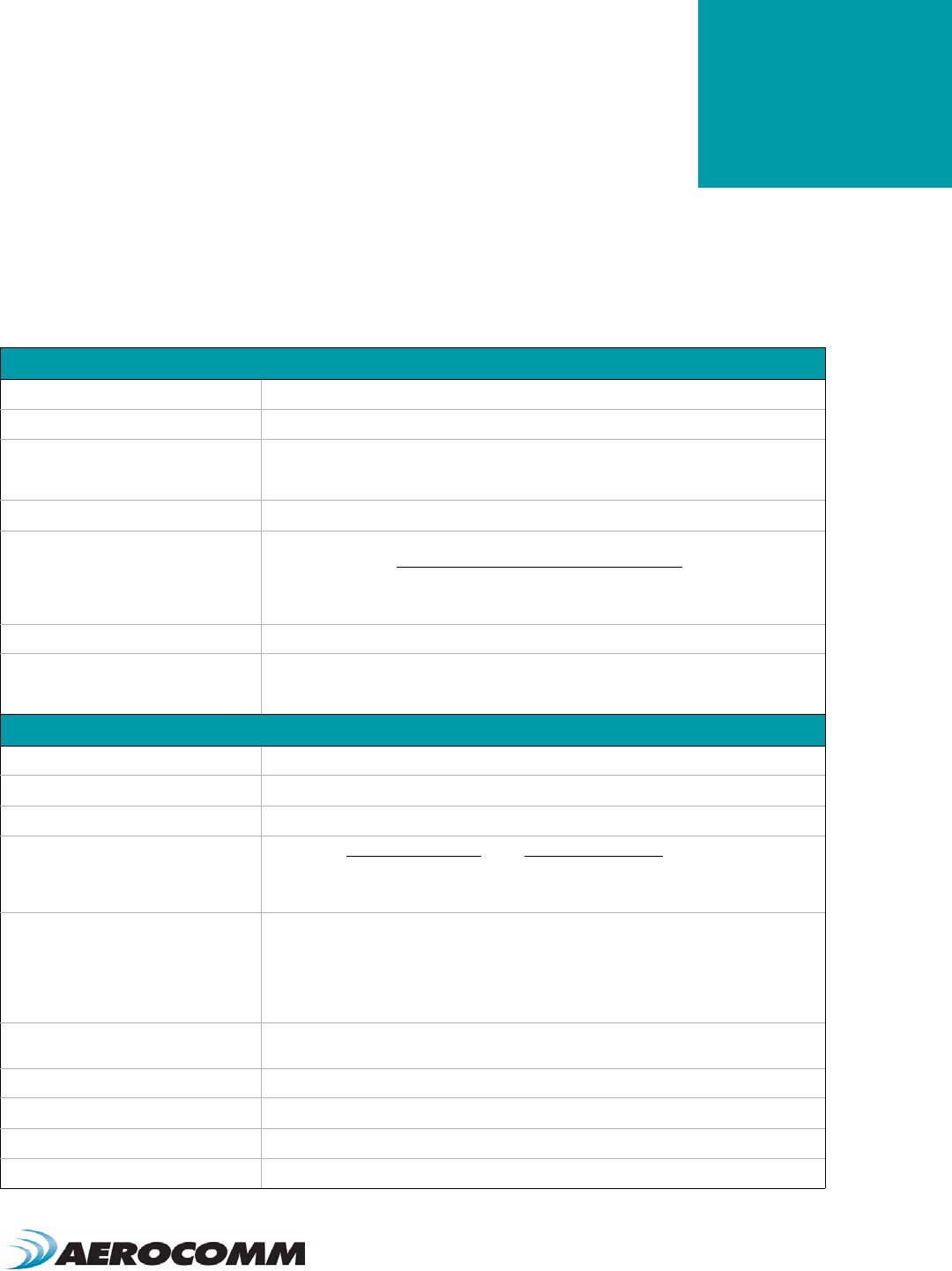
www.aerocomm.com
SPECIFICATIONS
2
Table 1: AC4790 Specifications
General
20 Pin Interface Connector Molex 87759-0030, mates with Samtec SMM-110-02-S-D
RF Connector Johnson Components 135-3711-822
Antenna AC4790-1x1: Customer must provide
AC4790-200: MMCX Connector or integral antenna
AC4790-1000: MMCX Connector
Serial Interface Data Rate Baud rates from 1200 bps to 115,200 bps
Power Consumption (typical) Duty Cycle (TX=Transmit; RX=Receive)
10%TX 50%TX 100%TX 100%RX
AC4790-1x1: 33mA 54mA 80mA 28mA
AC4790-200: 38mA 68mA 106mA 30mA
AC4790-1000: 130mA 650mA 1300mA 30mA
Channels 3 Channel Sets comprising 56 total channels
Security One byte System ID. 56-bit DES encryption key.
Interface Buffer Size Input/Output:256 bytes each
Transceiver
Frequency Band 902 – 928 MHz
RF Data Rate 76.8 kbps fixed
RF Technology Frequency Hopping Spread Spectrum
Output Power Conducted (no antenna) EIRP (3dBi gain antenna)
AC4790-1x1: 10mW typical 20mW typical
AC4790-200: 100mW typical 200mW typical
AC4790-1000: 743mW typical 1486mW typical
Supply Voltage AC4790-1x1: 3.3V, ±50mV ripple
AC4790-200: 3.3 – 5.5V, ±50mV ripple
AC4790-1000*: Pin 10: 3.3 – 5.5V ±50mV ripple
Pin 11: 3.3 ±3%, ±100mV ripple
* Pins 10 and 11 may be tied together, provided the supply voltage never falls below 3.3 V and is
capable of supplying 1.5 A of current.
Sensitivity -100dBm typical @ 76.8kbps RF Data Rate
-110dBm typical @ 76.8kbps RF Data Rate (AC4490LR-200/AC4490LR-1000)
EEPROM write cycles 20000
Initial Transceiver Sync time/Hop period 25ms / 50 ms
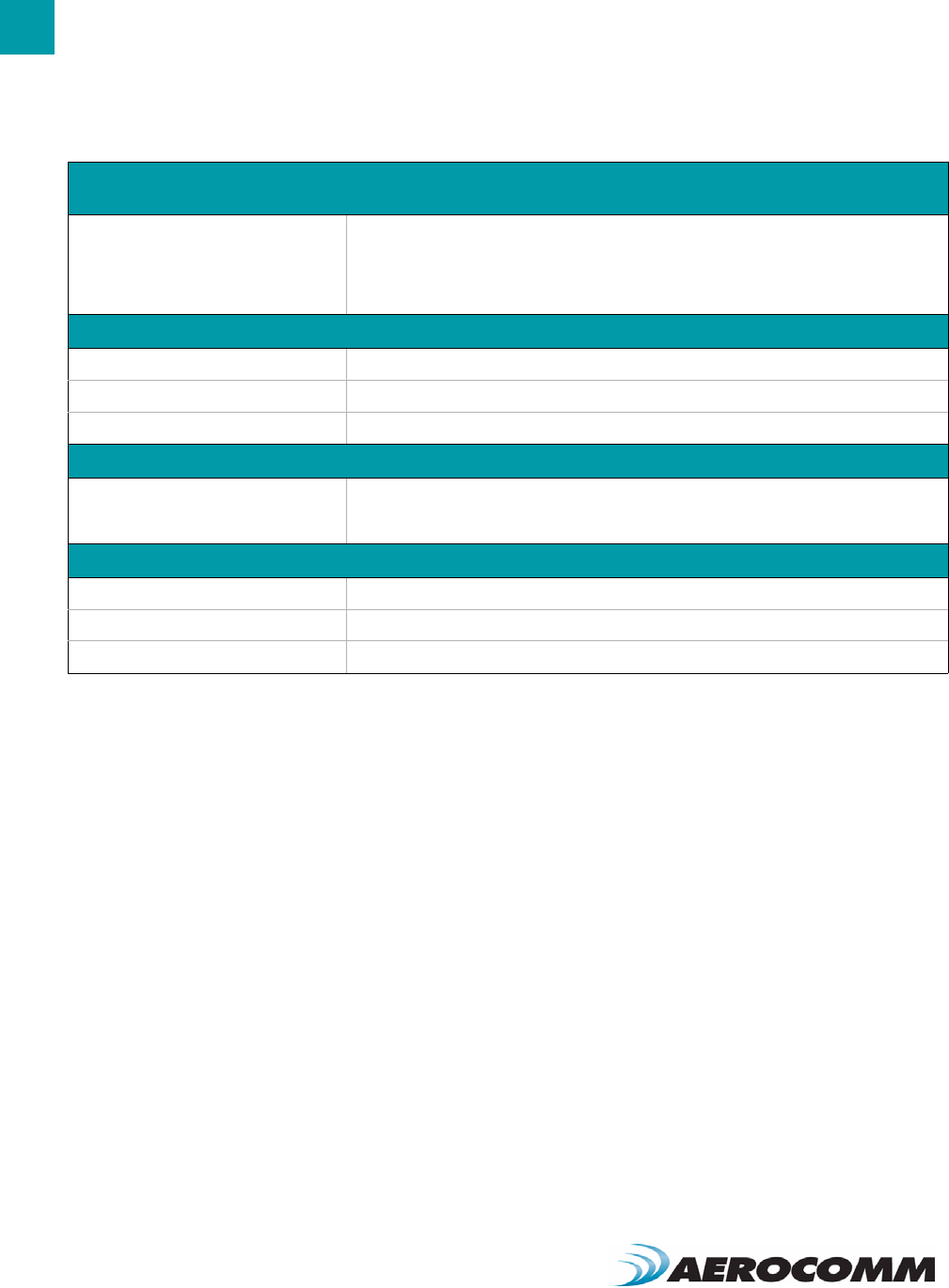
SPECIFICATIONS
4
Transceiver (Cont’d)
Range, Line of Site (based on 3dBi gain
antenna)
AC4790-1x1: Up to 1 mile
AC4790-200: Up to 4 miles
AC4790LR-200: Up to 8 miles
AC4790-1000: Up to 20 miles
AC4790LR-1000: Up to 40 miles
Environmental
Temperature (Operating) -40°C to 80°C
Temperature (Storage) -50°C to +85°C
Humidity (non-condensing) 10% to 90%
Physical
Dimensions Transceiver with MMCX Connector: 1.65” x 1.9” x 0.20”
Transceiver with Integral Antenna: 1.65” x 2.65” x 0.20”
AC4790-1x1: 1.00” x 1.00” x 0.162”
Certifications
AC4790-200A AC4490-200/AC4490LR-200 AC4790-1000
FCC Part 15.247 KQLAC4490-100 KQL4x90-200 KQLAC4490
Industry Canada (IC) 2268C-AC4490 2268C-4x90200 2268C-AC44901000
Table 1: AC4790 Specifications
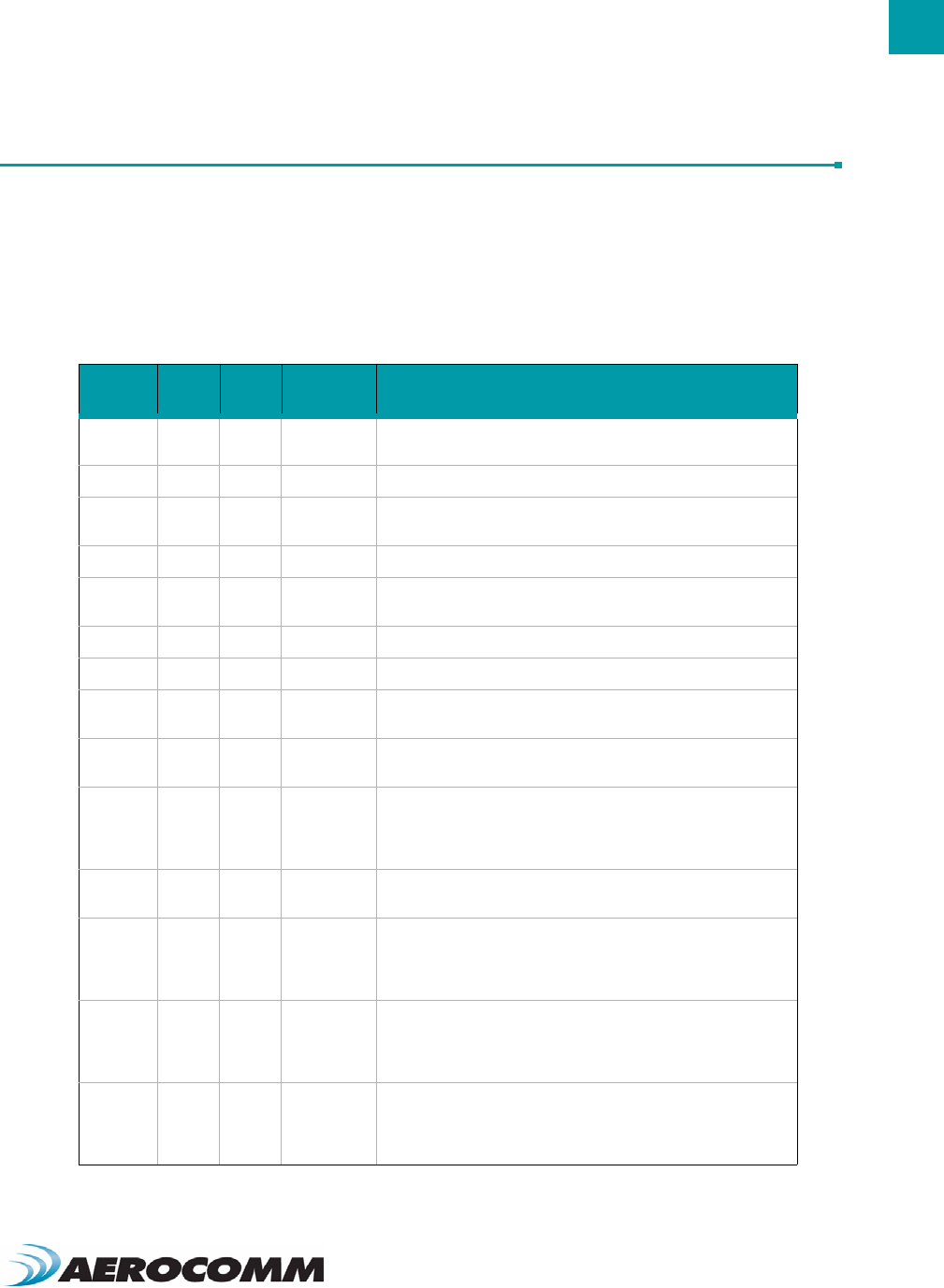
5
SPECIFICATIONS
www.aerocomm.com
PIN DEFINITIONS
The AC4790 has a simple interface that allows OEM Host communications with the transceiver. The table below
shows the connector pin numbers and associated functions. The I/O direction is with respect to the transceiver. All
outputs are 3.3VDC levels and inputs are 5VDC TTL (with the exception of AC4790-1x1 and AC4790-1000 transceivers
which have 3.3V inputs). All inputs are weakly pulled High and may be left floating during normal operation (with the
exceptions listed for the AC4790-1x1).
Table 2: AC4790 Pin Definitions
Module
Pin
1x1
Pin Type Signal
Name Function
1 4 O GO0 Session status if Protocol Status is enabled. Otherwise, generic
output.
2 6 O TXD Transmitted data out of the transceiver
I/O RS485 A
(True)1
Non-inverted RS-485 representation of serial data
3 7 I RXD Data input to the transceiver
I/O RS485 B
(Invert) 1
Mirror image of RS-485 A
4 52GI0 Generic Input pin
5 3 GND GND Signal Ground
6 O Do Not
Connect
Has internal connection, for AeroComm use only.
7 9 O CTS Clear to Send – Active Low when the transceiver is ready to accept
data for transmission.
8102IRTS Request to Send – When enabled in EEPROM, the OEM Host can
take this High when it is not ready to accept data from the
transceiver. NOTE: Keeping RTS High for too long can cause data
loss.
919 OGO1 Received Acknowledge status pin if Protocol Status is enabled.
Otherwise, generic output.
10 2PWR VCC1 AC4790-1x1: 3.3V, ±50mV ripple
AC4790-200: 3.3 – 5.5V, ±50mV ripple (Pin 10 is internally
connected to Pin 11)
AC4790-1000: 3.3 – 5.5V, ±50mV ripple
11 11 PWR VCC2 AC4790-1x1: 3.3V, ±50mV ripple
AC4790-200: 3.3 – 5.5V, ±50mV ripple (Pin 11 is internally
connected to Pin 10)
AC4790-1000: 3.3V ±3%, ±100mV ripple
12 23 ITest Test Mode – When pulled logic Low and then applying power or
resetting, the transceiver’s serial interface is forced to a 9600, 8-N-1
rate. To exit, the transceiver must be reset or power-cycled with Test
Mode logic High.
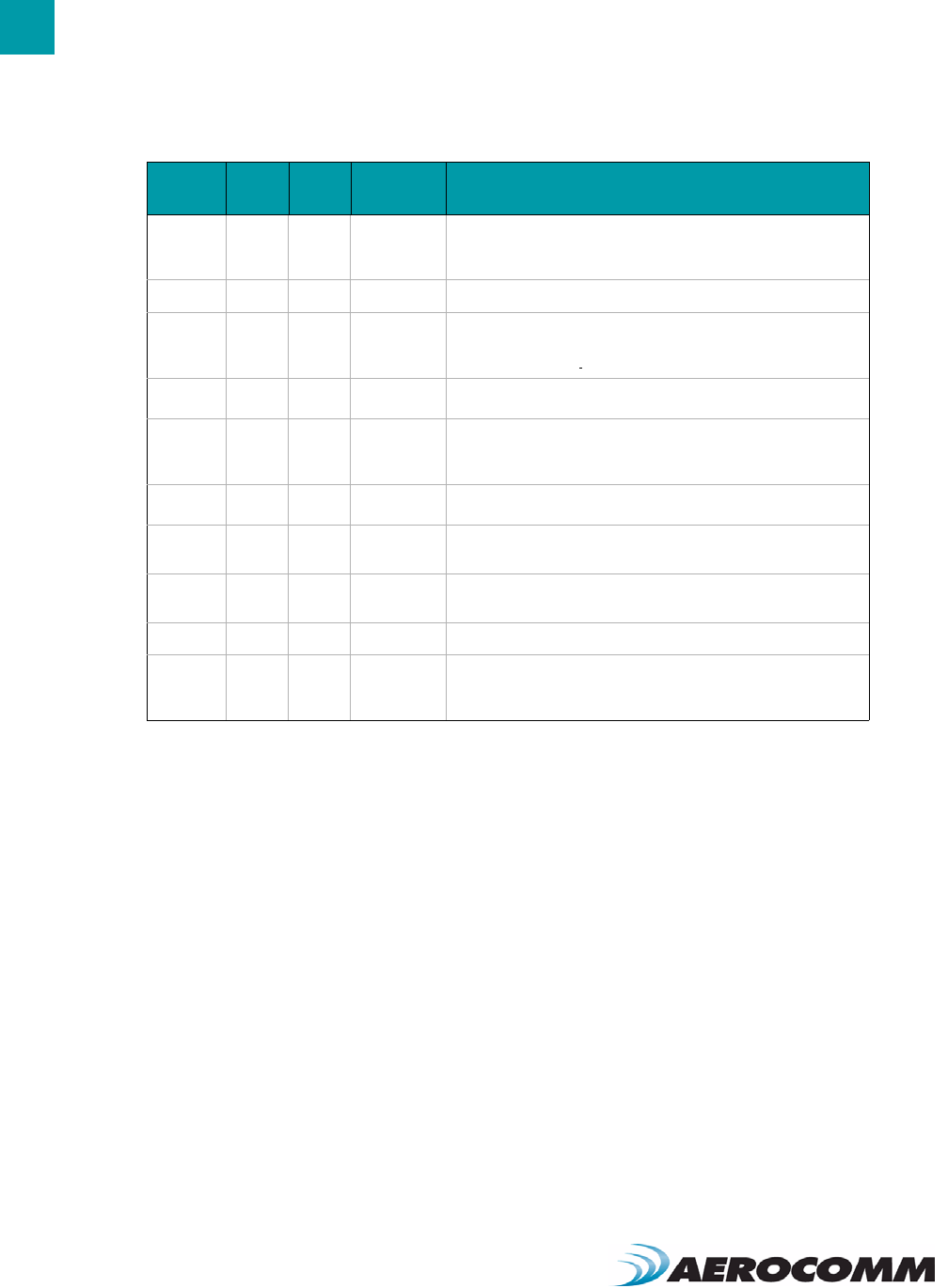
SPECIFICATIONS
6
13 12 ORSSI Received Signal Strength - An analog output giving an instantaneous
indication of received signal strength. Only valid while in Receive
Mode.
14 212IGI1 Generic Input pin
15 16 IUP_RESET RESET – Controlled by the AC4790 for power-on reset if left
unconnected. After a stable power-on reset, a logic High pulse will
reset the transceiver.
16 13 GND GND Signal Ground
17 17 ICMD/Data When logic Low, the transceiver interprets OEM Host data as
command data. When logic High, the transceiver interprets OEM
Host data as transmit data.
18 153IAD In 10 bit Analog Data Input
19 1,8,20
24-28
N/C Do Not
Connect
Has internal connection, for AeroComm use only.
20 18 OSession
Status
When logic Low, the transceiver is in Session
N/A 14 RF RF Port RF Interface
N/A 22 IReset Active Low version of UP_RESET. If RESET is used, UP_RESET
should be left floating and if UP_RESET is used, RESET should be
left floating.
1. When ordered with a RS-485 interface (not available on the AC4790-1x1).
2. Must be tied to VCC or GND if not used. Should never be permitted to float.
3. If used, requires a shunt 0.1μF capacitor at pin 15 followed by a series 1k resistor.
Table 2: AC4790 Pin Definitions
Module
Pin
1x1
Pin Type Signal
Name Function
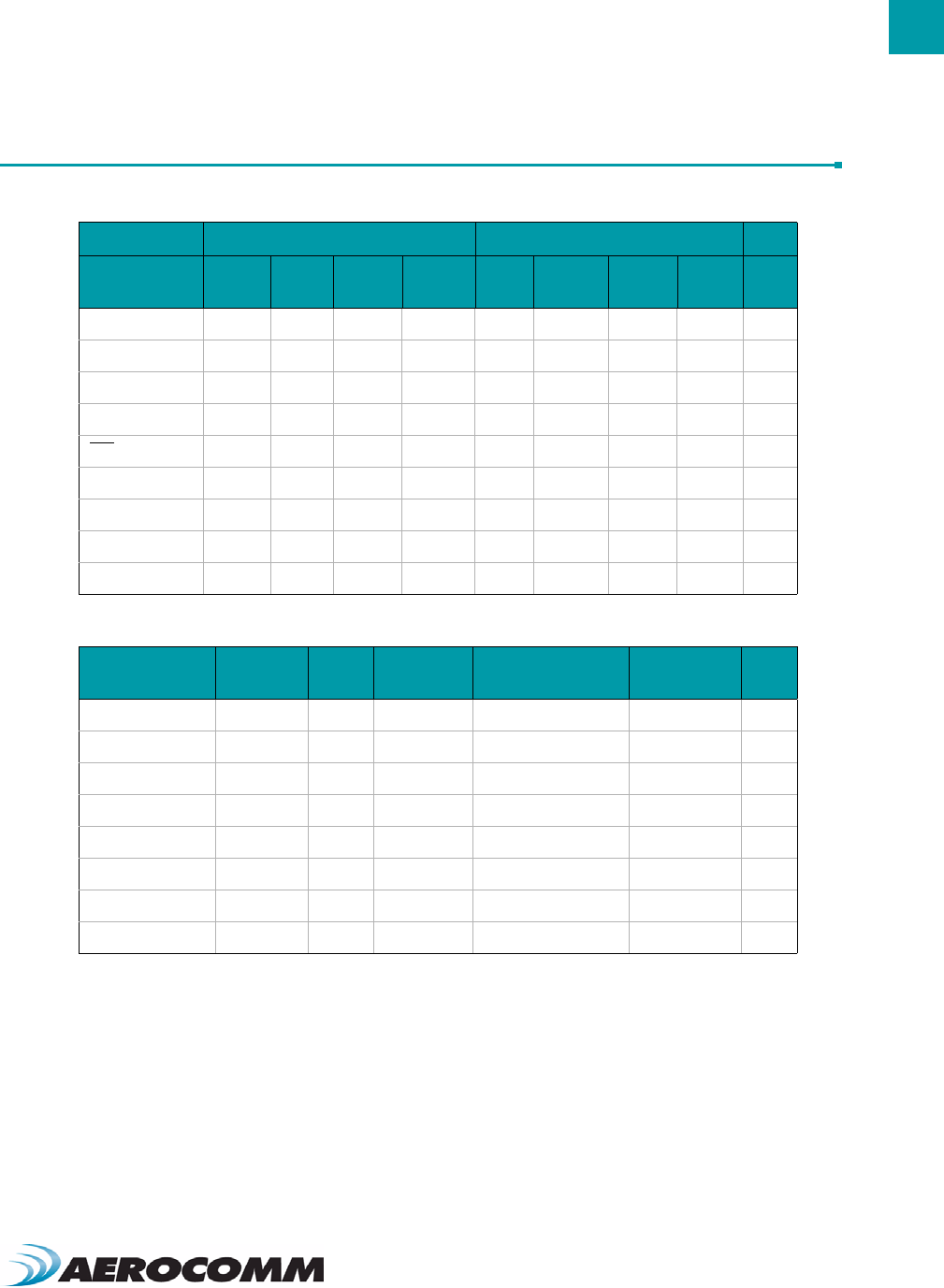
7
SPECIFICATIONS
www.aerocomm.com
ELECTRICAL SPECIFICATIONS
Table 3: Input Voltage Characteristics
AC47901x1 / AC4790-1000M AC4790-200X
Signal Name High
Min.
High
Max.
Low
Min.
Low
Max.
High
Min.
High
Max.
Low
Min.
Low
Max. Unit
RS485A/B N/A 12 -7 N/A N/A 12 -7 N/A V
RXD 2.31 3.3 00.99 25.5 00.8 V
GI0 2.31 3.3 00.99 25.5 00.8 V
RTS 2.31 3.3 00.99 25.5 00.8 V
Test 2.31 3.3 00.99 25.5 00.8 V
GI1 2.31 3.3 00.99 25.5 00.8 V
UP_RESET 0.8 3.3 00.6 0.8 5 0 0.6 V
Command/Data 2.31 3.3 00.99 25.5 00.8 V
AD In N/A 3.3 0N/A N/A 3.3 0N/A V
Table 4: Output Voltage Characteristics
Signal Name Module
Pin
1x1
Pin Type High
Min.
Low
Max. Unit
GO0 119 O2.5 @ 8mA 0.4 @ 8mA V
TXD 2 6 O 2.5 @ 2mA 0.4 @ 2mA V
RS485A/B 2,3 N/A I/O 3.3 @ 1/8 Unit Load N/A V
CTS 7 9 O 2.5 @ 2mA 0.4 @ 2mA V
GO1 919 O2.5 @ 2mA 0.4 @ 2mA V
RSSI 13 12 OSee Figure 1 See Figure 1 V
Session Status 20 18 O2.5 @ 2mA 0.4 @ 2mA V
GO0 119 O2.5 @ 8mA 0.4 @ 8mA V

www.aerocomm.com
THEORY OF OPERATION
3
MASTERLESS ARCHITECTURE
The Masterless architecture is a true peer-to-peer architecture, where any module that has data to transmit will initiate
a communication Session with a transceiver(s) within its range, transmit data and exit the Session. This architecture
eliminates the need for a master which dictates data flow control, hence reducing additional system overhead and
greatly improving efficiency.
MODES OF OPERATION
The AC4790 has three different operating modes; Receive, Transmit, & Command Mode. If the transceiver is not
communicating with another radio, it will be in Receive Mode actively listening for a sync pulse from another
transceiver. If the radio determines that it is a broadcast or addressed sync pulse, it will respond by going into session
with the radio. A transceiver will enter Transmit or Command mode when the OEM Host sends data over the serial
interface. The state of the Command/Data pin (Pin 17) or the data contents determine which of the two modes will be
entered.
Transmit Mode
All packets sent over the RF are either Addressed or Broadcast packets. Broadcast and Addressed delivery can be
controlled dynamically with the API Control byte and corresponding on-the-fly commands. To prohibit transceivers
from receiving broadcast packets, Unicast only can be enabled.
ADDRESSED PACKETS
When sending an addressed packet, the RF packet is sent only to the receiver specified in destination address. To
increase the odds of successful delivery, Transmit retries are utilized. Transparent to the OEM Host, the sending radio
will send the RF packet to the intended receiver. If the receiver receives the packet free of errors, it will return an RF
acknowledge within the same 50 ms hop. If a receive acknowledgement is not received, the radio will use a transmit
retry to resend the packet. The radio will continue sending the packet until either (1) an acknowledgement is received
or (2) all transmit retries have been used. The received packet will only be sent to the OEM Host if and when it is
received free of errors.
BROADCAST PACKETS
When sending a broadcast packet, the RF packet is sent out to every eligible transceiver on the network. To increase
the odds of successful delivery, Broadcast attempts are utilized. Transparent to the OEM Host, the sending radio will
send the RF packet to the intended receiver(s). Unlike transmit retries, all broadcast attempts are used; regardless of
when the RF packet is actually received and without RF acknowledgements. If the packet is received on the first
attempt, the receiver will ignore the remaining broadcast attempts. The received packet will only be sent to the OEM
Host if and when it is received free of errors.
When a radio has data to transmit, it sends out a sync pulse to initiate a session with one or more radios. This 25 ms
sync pulse is sent during the first half of each 50 ms hop and transparent to the OEM Host. Once a Session has been
established, the radio transmits the data during the remaining 25 ms of the current hop. The radio will stay in Transmit
mode until its Session Count expires. When sending addressed packets, Session Count is defined as Session Count
Refresh (EEPROM address 0xC4) + number of transmit retries (EEPROM address 0x4C). When sending broadcast
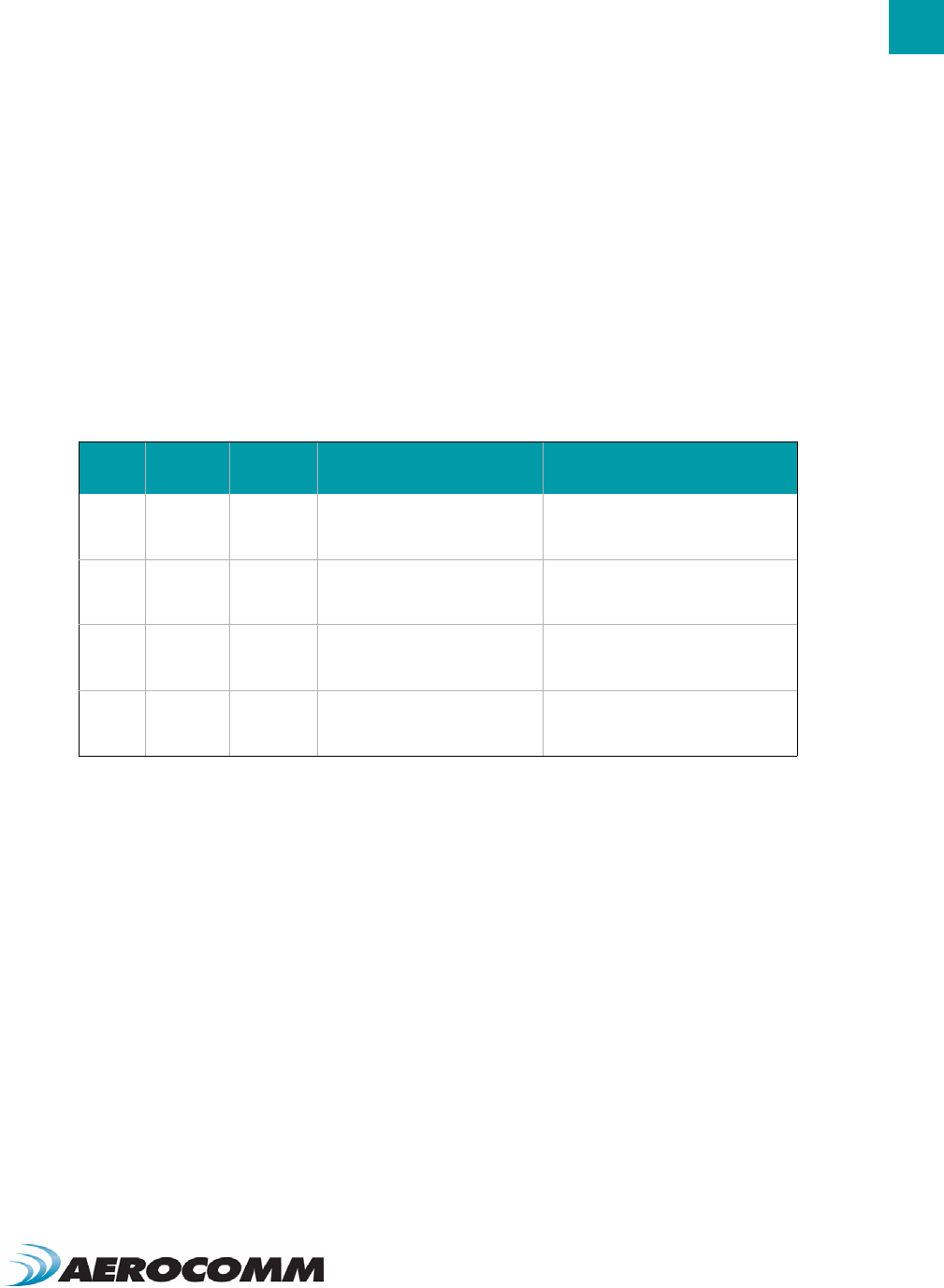
9
THEORY OF OPERATION
www.aerocomm.com
packets, Session Count is equal to Session Count Refresh (EEPROM address 0xC4) + number of broadcast attempts
(EEPROM address 0x4D). Once the radio exits the Session it returns to the default Receive Mode.
Receive Mode
If a transceiver detects a sync pulse while in Receive Mode, it will join the Session and begin receiving data. While in
Receive Mode, subsequent data of up to 128 bytes can be received every hop (50 ms).
When a transceiver is in Session, its Session Count is decremented by one every hop. When the Session Count
reaches zero, the transceiver exits the Session. In order to continue receiving data, the transceivers update their
Session Count every time data or an RF acknowledge is received. The SLock0 and SLock1 settings control Session
Count as shown below.
* EEPROM Default
Note 1: For Broadcast/Addressed packets, the Session Count for Full Duplex is 2x the value of Session Count in Half Duplex.
Note 2: It is best to have all transceivers with the same Session Count Refresh (EEPROM Address 0xC4) value. Session Count Refresh must
not be set to 0x00.
Case 1: In this case, a radio loads its Session Count with its Session Count Refresh. This is suitable for Half Duplex
communication where immediate response is not received from the remote radio.
Case 2: In this case, a radio loads its Session Count with (its Session Count Refresh + its Transmit Retries). This case
is suitable for applications where there are high levels of interference and it is likely that transmit retries will be
necessary to maintain reliable communications.
When an addressed packet or a response to a broadcast packet is sent, the sending radio will listen for a successful
acknowledgement. If an acknowledgement is not sent, the radio will resend the packet until either an
acknowledgement is received or it has exhausted all available transmit retries. If two radios are on the last hop of the
current session and a retry is required, it is possible that once the current session has ended the receiving radio could
go into session with a different radio and miss the final packet of the previous session. Adding the radios Transmit
retries to its Current Session Count will ensure that the radio does not exit the session when the remote radio is using
a Transmit Retry.
Case 3: In this case a radio loads its Session Count with the remote radio's Session Count. This is suitable for full
duplex applications as the Session is extended as long as there is communication.
Table 5: Session Count Truth Table
Case Slock0 Slock1 Transceiver Receiving an
Addressed Packet
Transceiver Receiving a
Broadcast Packet
1 0 0 Radio loads its Current Session
Count with its Session Count
Refresh
Radio loads its Current Session Count
with its Session Count Refresh
2 0 1 Radio loads its Current Session
Count with (its Transmit Retries +
its Session Count Refresh)
Radio loads its Current Session Count
with (its Broadcast Attempts + its
Session Count Refresh)
3* 1 0 Radio loads its Current Session
Count with the remote radio’s
Session Count
Radio loads its Current Session Count
with the remote radio’s Session Count
4 1 1 Radio loads its Current Session
Count with the remote radio’s
Current Session Count
Radio loads its Current Session Count
with the remote radio’s Current Session
Count

THEORY OF OPERATION
10
Note: This is the default case with which the radio ships and works well for almost all applications.
Case 4: In this case, a radio loads its Session Count with the remote radio's current Session Count. This is suitable
for daisy chain applications and large networks in which radios cannot stay in session longer than needed.
Command Mode
A radio will enter Command Mode when data is received over the serial interface from the OEM Host and either the
Command/Data pin (pin 17) is logic Low or the received data contains the “AT+++” (Enter AT Command Mode)
command. Once in Command Mode, all data received by the radio is interpreted as command data. Command Data
can be either EEPROM Configuration or On-The-Fly commands.
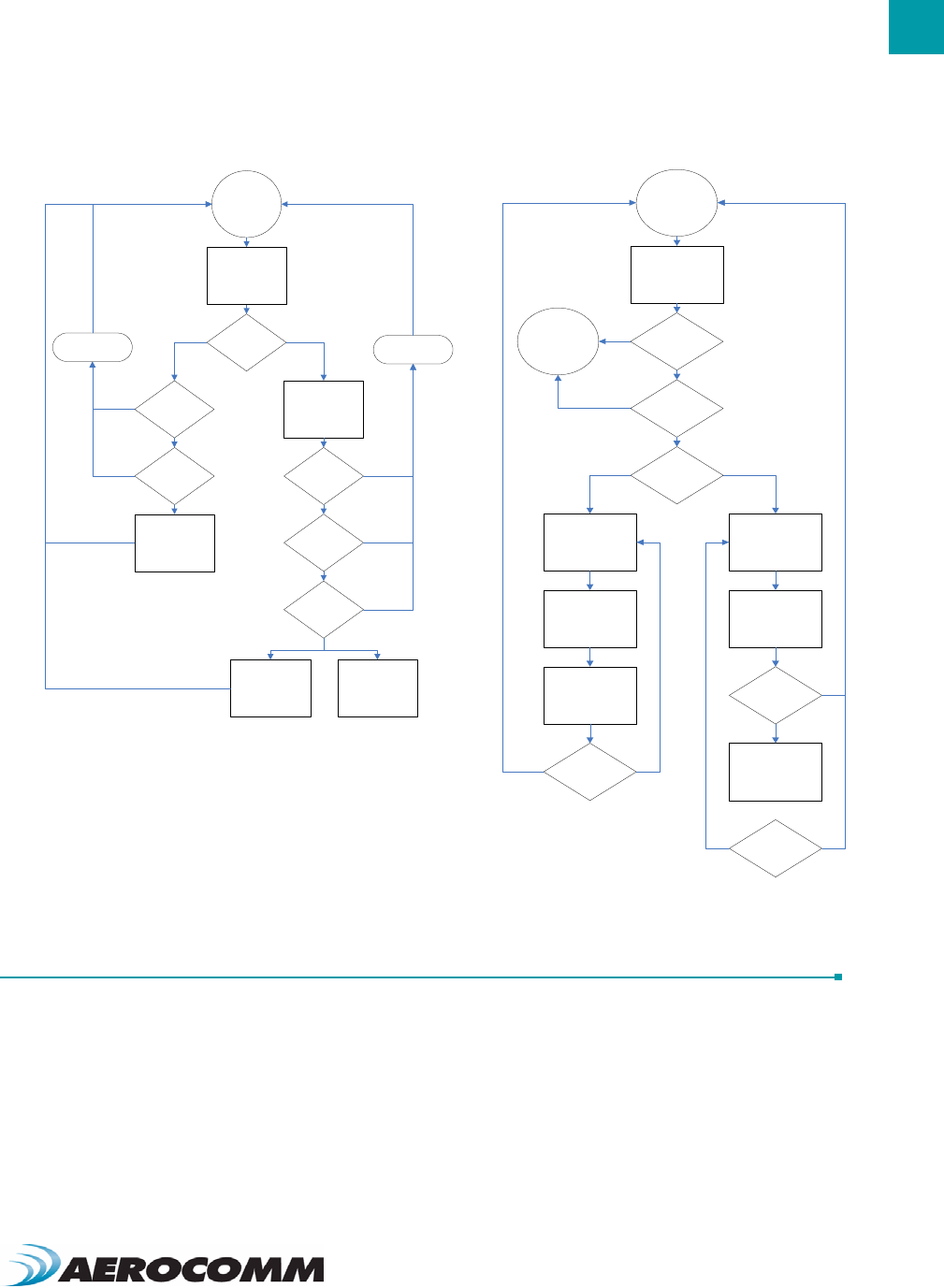
11
THEORY OF OPERATION
www.aerocomm.com
Figure 1: Pending RF and Data in Buffer Flow
API CONTROL
API Control is a powerful feature that the Masterless Protocol offers. When enabled, the API Transmit Packet, API
Send Data Complete and API Receive Packet features provide dynamic packet routing and packet accounting ability
to the OEM Host, thereby eliminating the need for extensive programming on the OEM Host side. This ability of the
protocol makes it ideal for any legacy system. API operation utilizes specific packet formats; specifying various vital
parameters used to control radio settings and packet routing on a packet-by-packet basis. The API features can be
used in any combination that suits the OEM’s specific needs.
Receive Mode
Broadcast
Packet
Receive full
packet and
check CRC Addressed Packet
Matching
Destination
MAC
Validate CRC
Duplicate
Packet
Send RF
Acknowledge
Send Packet over
RF
Duplicate
Packet
Discard Packet
Discard Packet
Send Packet over
RF
Pending RF
Received
Yes
Yes
Yes
Yes
Yes
Yes
Receive Mode
Pin 17 Low
Data in Buffer
AT+++
RF Data
Broadcast Packet Addressed Packet
Transmit Packet
Transmit Packet
Decrement
Broadcast
Attempts
Broadcast
Attempts = 0
Receive ACK
Decrement
Transm it Attempts
Transmit
Attem pts = 0
Command/Data
Mode
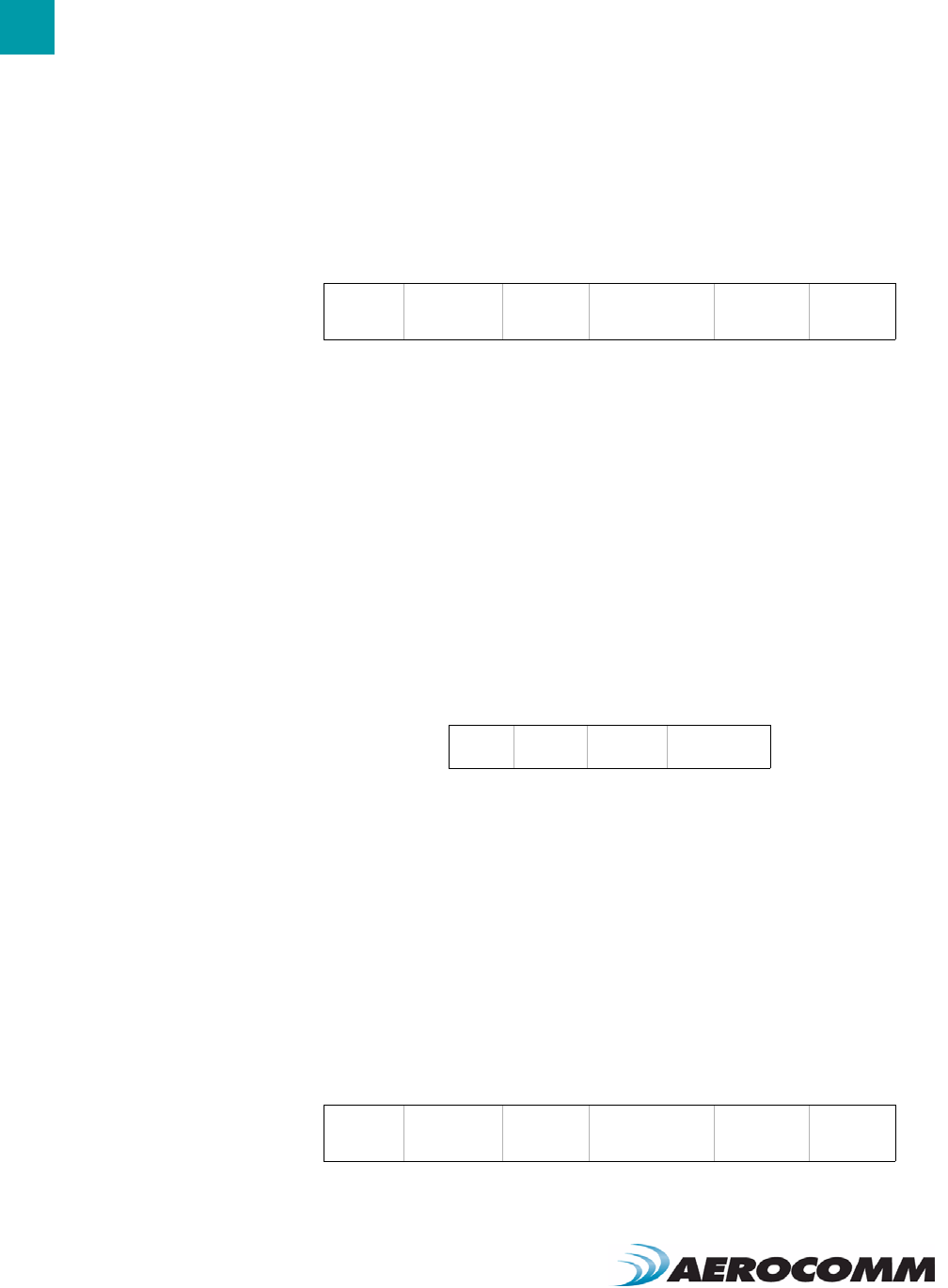
THEORY OF OPERATION
12
API Transmit Packet
API Transmit Packet is a powerful command that allows the OEM Host to send data to a single or multiple (broadcast)
transceivers on a packet-by-packet basis. This can be useful for many applications; including polling and/or mesh
networks. Refer to the API Appendix for further details.
API Transmit Packet is enabled when bit-1 of the API Control byte is enabled. The OEM Host should use the following
format to transmit a packet over the RF.
1If the OEM Host does not encode the header correctly, the transceiver will send the entire string (up
to 0x80 bytes) and will look for the header in the next data.
2Although the 7 bytes of overhead are not sent over the RF, they are kept in the buffer until the packet
is sent. Keep this in mind so as not to overrun the 256-byte buffer.
3Setting the MAC to 0xFF 0xFF 0xFF will broadcast the packet to all available transceivers.
API Send Data Complete
API Send Data complete can be used as a software acknowledgement indicator. When a radio sends an addressed
packet, it will look for a received acknowledgement (transparent to OEM Host). If an acknowledgement is not
received, the packet will be retransmitted until one is received or all retries have been used.
For applications where data loss is not an option, the OEM Host may wish to monitor the acknowledgement process
using the API Send Data Complete. If an acknowledgement is not received (Failure), the OEM Host can send the
packet to the transceiver once again.
API Send Data Complete is enabled when bit-2 of the API Control byte is enabled. The transceiver sends the OEM
Host the following data upon receiving an RF acknowledge or exhausting all attempts.
1The RSSI is how strong the remote transceiver heard the local transceiver; RSSI* is how strong the
local transceiver heard the remote transceiver.
2Successful RF Acknowledge updates the Success/Failure bit.
3A success will always be displayed when sending broadcast packets after all broadcast attempts
have been exhausted.
API Receive Packet
By default, the source MAC is not included in the received data string sent to the OEM Host. For applications where
multiple radios are sending data, it may be necessary to determine the origin of a specific data packet. When API
Receive Packet is enabled, all packets received by the transceiver will include the MAC address of the source radio as
well as an RSSI indicator which can be used to determine the link quality between the two.
API Receive Packet is enabled when bit-0 of the API Control byte is enabled. Upon receiving a packet the radio sends
its OEM Host the packet in the following format:
0x81
Payload Data
Length
(0x01 - 0x80)
Session
Count
Refresh
Transmit
Retries/Broadcast
Attempts
Destination
MAC (2,1,0)
Payload
Data
0x82 RSSI RSSI* 0x00: Failure
0x01: Success
0x81
Payload Data
Length
(0x01 - 0x80)
RSSI RSSI* Source MAC
(2,1,0)
Payload
Data

13
THEORY OF OPERATION
www.aerocomm.com
ENGINEER’S TIP
When both API Send Data Complete and API Receive Packet are enabled, the Send Data
Complete will be received before the transceiver sees the Receive API Packet. This order may
get reversed when the API Send Data Complete is missed and is being resent after the API
Receive Packet is received.
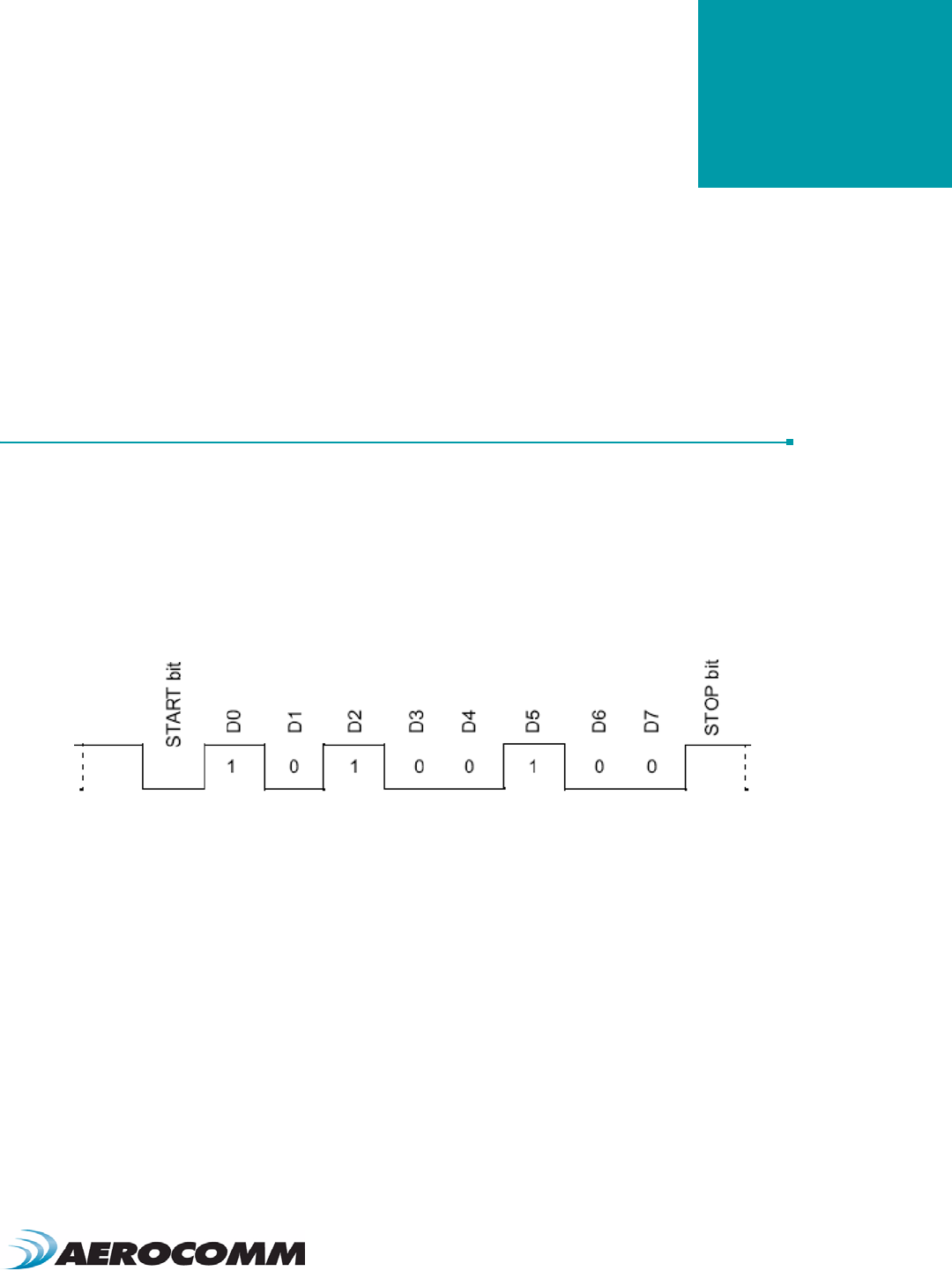
www.aerocomm.com
SERIAL INTERFACE
4
In order for the OEM Host and a transceiver to communicate over the serial interface they need to have the same
serial data rate. Refer to the following sections to ensure that the OEM Host data rate matches the serial interface
baud rate.
SERIAL COMMUNICATIONS
The AC4790 is a TTL device which can be interfaced to a compatible UART (microcontroller) or level translator to allow
connection to serial devices. UART stands for Universal Asynchronous Receiver Transmitter and its main function is
to transmit or receive serial data.
Asynchronous Operation
Since there is no seperate clock in asynchronous operation, the receiver needs a method of synchronizing with the
transmitter. This is achieved by having a fixed baud rate and by using START and STOP bits. A typical asynchronous
mode signal is shown below.
Figure 2: Asynchronous Mode Signal
The UART outputs and inputs logic level signals on the TX and RX pins. The signal is high when no data is being
transmitted and goes low when transmission begins.
The signal stays low for the duration of the START bit and is followed by the data bits; LSB first. The STOP bit follows
the last data bit and is always high. After the STOP bit has completed, the START bit of the next transmission can
occur.
Parity
A parity bit is used to provide error checking for a single bit error. When a single bit is used, parity can be either even
or odd. Even parity means that the number of ones in the data and parity sum to an even number and vice-versa. The
ninth data bit can be used as a parity bit if the data format requires eight data bits and a parity bit as shown below.
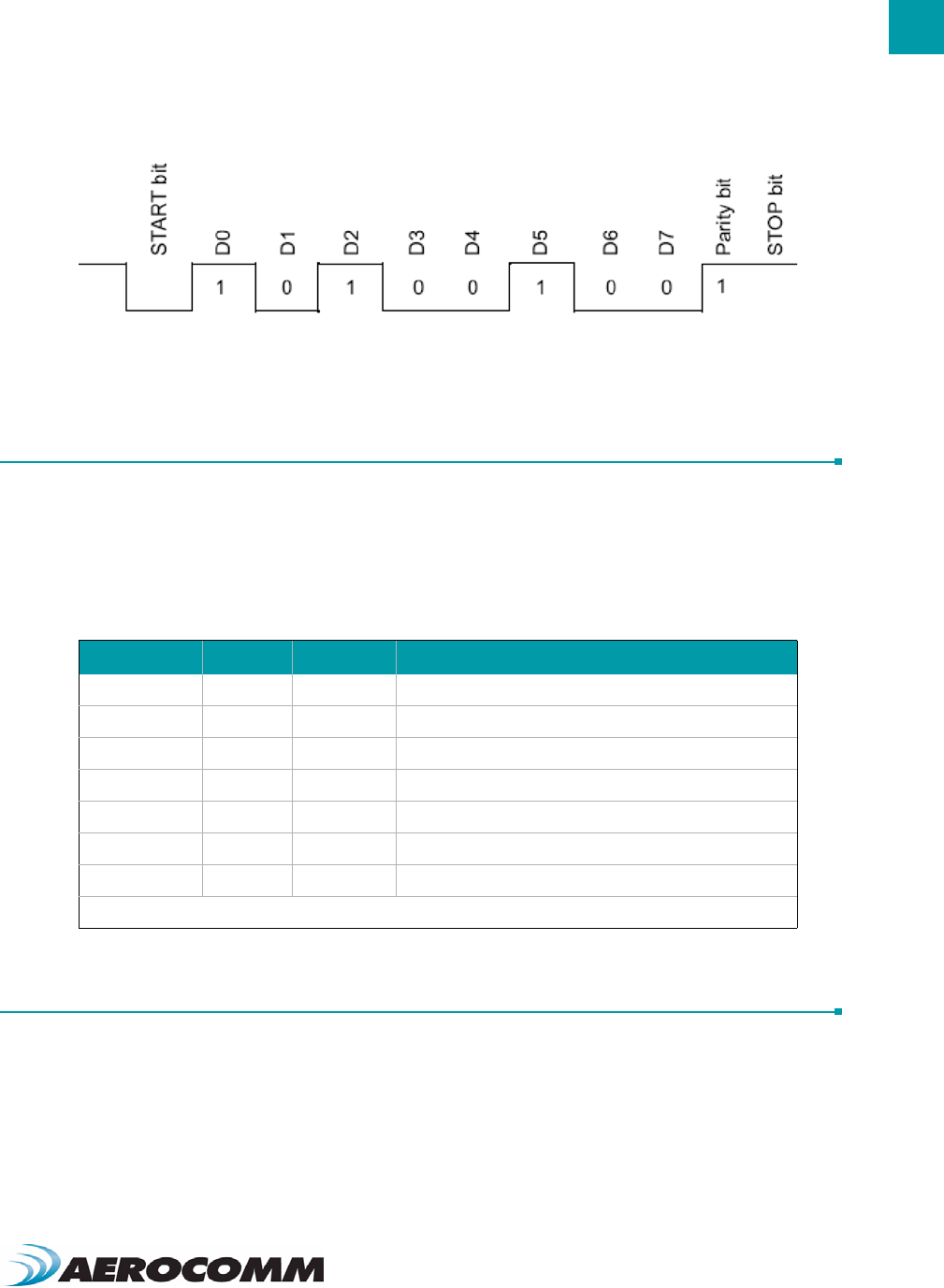
15
SERIAL INTERFACE
www.aerocomm.com
Figure 3: Even Parity Bit
Note: Enabling parity cuts throughput and the interface buffer in half.
OEM HOST DATA RATE
The OEM Host Data Rate is the rate with which the OEM Host and transceiver communicate over the serial interface.
This rate is independent of the RF baud rate, which is fixed at 76.8 kbps. Possible values range from 1200 bps to
115,200 bps. Note: Enabling Parity cuts throughput in half and the Interface Buffer size in half. The following
asynchronous serial data formats are supported:
SERIAL INTERFACE BAUD RATE
This two-byte value determines the baud rate used for communicating over the serial interface to a transceiver. The
Table below lists values for some common baud rates. Baud rates below 1200 baud are not supported. For a baud
rate to be valid, the calculated baud rate must be within ±3% of the OEM Host baud rate. If the Test pin (Pin 12) is
pulled logic Low at reset, the baud rate will be forced to 9,600. The RF baud rate is fixed at 76.8 Kbps and is
independent of the interface baud rate. For Baud Rate values other than those shown below, the following equations
can be used:
Table 6: Supported Serial Formats
Data Bits Parity Stop Bits Transceiver Programming Requirements
8 N 1 Parity Disabled
7 N 2 Parity Disabled
7E, O, M, S 1Parity Disabled
9 N 1 Parity Enabled
8 N 2 Parity Enabled
8E, O, M, S 1Parity Enabled
7E, O, M, S 2Parity Enabled
Mark (M) corresponds to 1 & Space (S) corresponds to 0
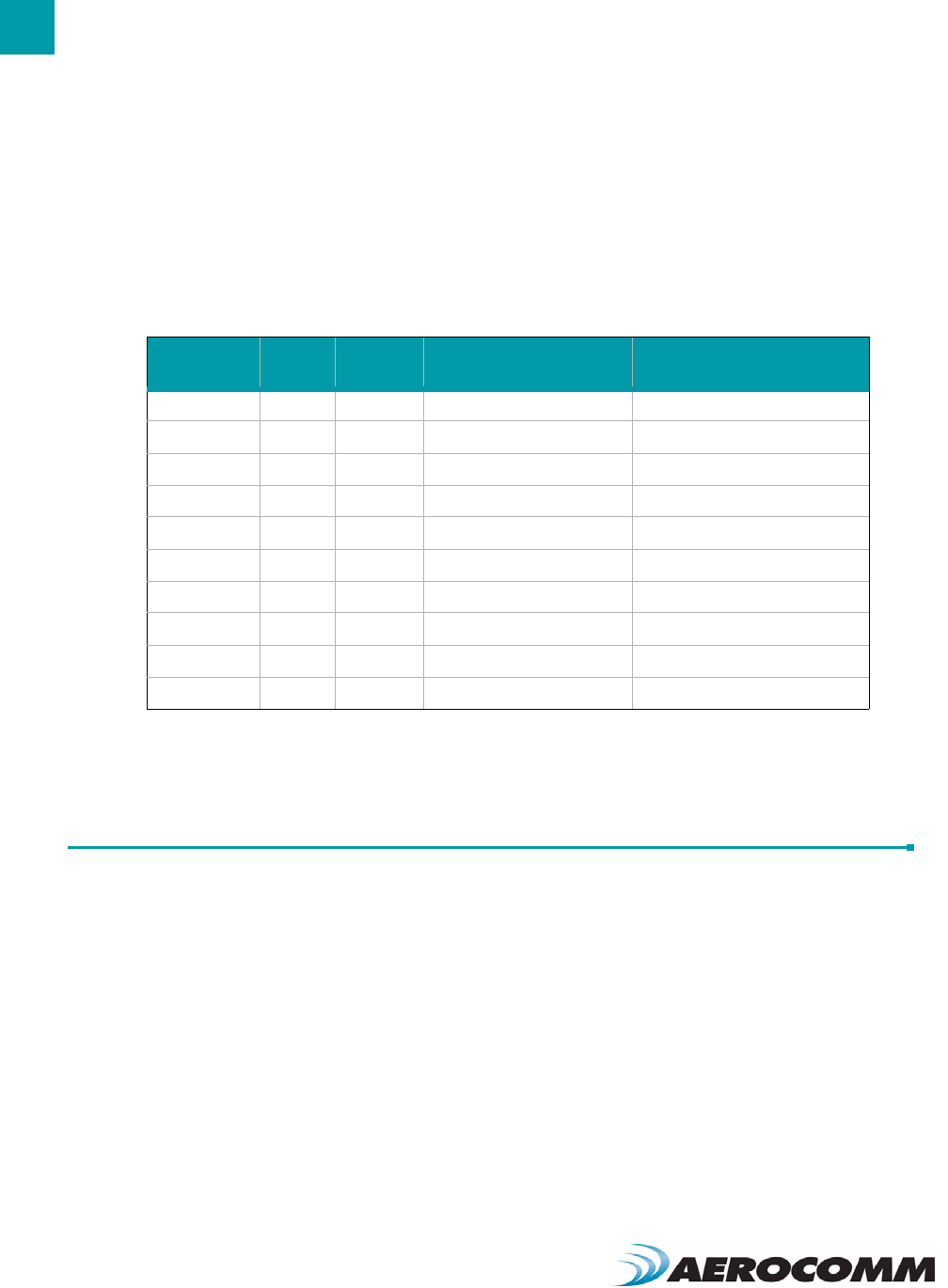
SERIAL INTERFACE
16
INTERFACE TIMEOUT / RF PACKET SIZE
Interface Timeout (EEPROM address 0x58), in conjunction with RF Packet Size (EEPROM address 0x5B), determines
when a buffer of data will be sent out over the RF as a complete RF packet, based on whichever condition occurs first.
Interface Timeout – Interface Timeout specifies a maximum byte gap between consecutive bytes. When that byte gap
is exceeded, the bytes in the transmit buffer are sent out over the RF as a complete packet. Interface Timeout is
adjustable in 0.5ms increments and has a tolerance of ±0.5ms. Therefore, the Interface Timeout should be set to a
minimum of 2. The default value for Interface Timeout is 0x04 (2ms) and should be adjusted accordingly when
changing the transceiver baud rate.
RF Packet Size – When the number of bytes in the transceiver transmit buffer equals RF Packet Size, those bytes are
sent out as a complete RF packet. It is much more efficient to send a few large packets rather than several short
packets as every packet the transceiver sends over the RF contains extra header bytes which are not included in the
RF Packet Size. RF packet size can be set to a maximum of 0x80 and must be set to a minimum of 0x06 in order to
send the Enter AT Command mode command.
Table 7: Baud Rate / Interface Timeout
Baud Rate BaudL
(0x42)
BaudH
(0x43)
Minium Interface
Timeout (0x58) Stop Bit Delay (0x3F)
115,200 0xFE 0x00 0x02 0xFF
57,6001
1. 57,600 is the default baud rate
0xFC 0x00 0x02 0x03
38,400 0xFA 0x00 0x02 0x08
28,800 0xF8 0x00 0x02 0x0E
19,200 0xF4 0x00 0x03 0x19
14,400 0xF0 0x00 0x04 0x23
9,600 0xE8 0x00 0x05 0x39
4800 0xD0 0x00 0x09 0x7A
2400 0xA0 0x00 0x11 0xFC
1200 0x40 0x00 0x21 0x002
2. 0x00 will yield a stop bit of 421 uS. The stop bit at 1200 baud should actually be 833 uS.
BAUD 14.7456 6
×10
64 DesiredBaud×
-----------------------------------------------
=
BaudH Always 0=
BaudL Low 8 bits of BAUD (base 16)=

17
SERIAL INTERFACE
www.aerocomm.com
FLOW CONTROL
Flow control refers to the control of data flow between transceivers. It is the method used to handle data in the
transmit/receive buffer and determines how data flow between the transceivers is started and stopped. Often, one
transceiver is capable of sending data much faster than the other can receive and flow control allows the slower
device to tell the faster device when to pause and resume data transmission.
When a transceiver has data to send, it sends a Ready To Send signal and waits for a Clear To Send response from
the receiving unit. If the receiving radio is ready to accept data it will assert its CTS low. CTS will be reasserted when
the buffer contains the number of bytes specified by CTS_OFF (EEPROM address 0x5D). These signals are sent
apart from the data itself on separate wires.
HALF DUPLEX / FULL DUPLEX
When Half Duplex communication is chosen, the AC4790 will send a packet out over the RF whenever it can. This can
cause packets sent by multiple transceivers at the same time to collide with each other over the RF. To prevent this,
Full Duplex communication can be chosen. Full Duplex shares the bandwidth intelligently to enable two-way
collision-free communication without any collision. This is done by calculating the amount of time until the next hop to
ensure that it has time to send the packet; if there is enough time, it will send the packet and if not, it will wait until its
next appropriate hop. The radio which initiates the session transmits during the even hops while the remaining
radio(s) will transmit during the odd hops. Although the RF hardware is still technically half duplex, the bandwidth
sharing it makes the transceiver seem full duplex. Enabling Full Duplex can cause overall throughputs to be cut in
half.
SYSTEM TIMING & LATENCY
Care should be taken when selecting transceiver architecture, as it can have serious effects on data rates, latency,
and overall system throughput. The importance of these three characteristics will vary from system to system and
ENGINEER’S TIP
Can I implement a design using just Txd, Rxd and Gnd (Three-wire Interface)?
Yes. However, it is strongly recommended that your hardware monitor the CTS pin of the
radio. CTS is taken High by the radio when its interface buffer is getting full. Your hardware
should stop sending at this point to avoid a buffer overrun (and subsequent loss of data).
You can perform a successful design without monitoring CTS. However, you need to take into
account the amount of latency the radio adds to the system, any additional latency caused by
Transmit Retries or Broadcast Attempts, how often you send data, non-delivery network
timeouts and interface data rate. Polled type networks, where the Server host requests data
from the Client host and the Client host responds, are good candidates for avoiding the use of
CTS. This is because no one transceiver can monopolize the RF link. Asynchronous type
networks, where any radio can send to another radio at any point in time, are much more
difficult to implement without the use of CTS.
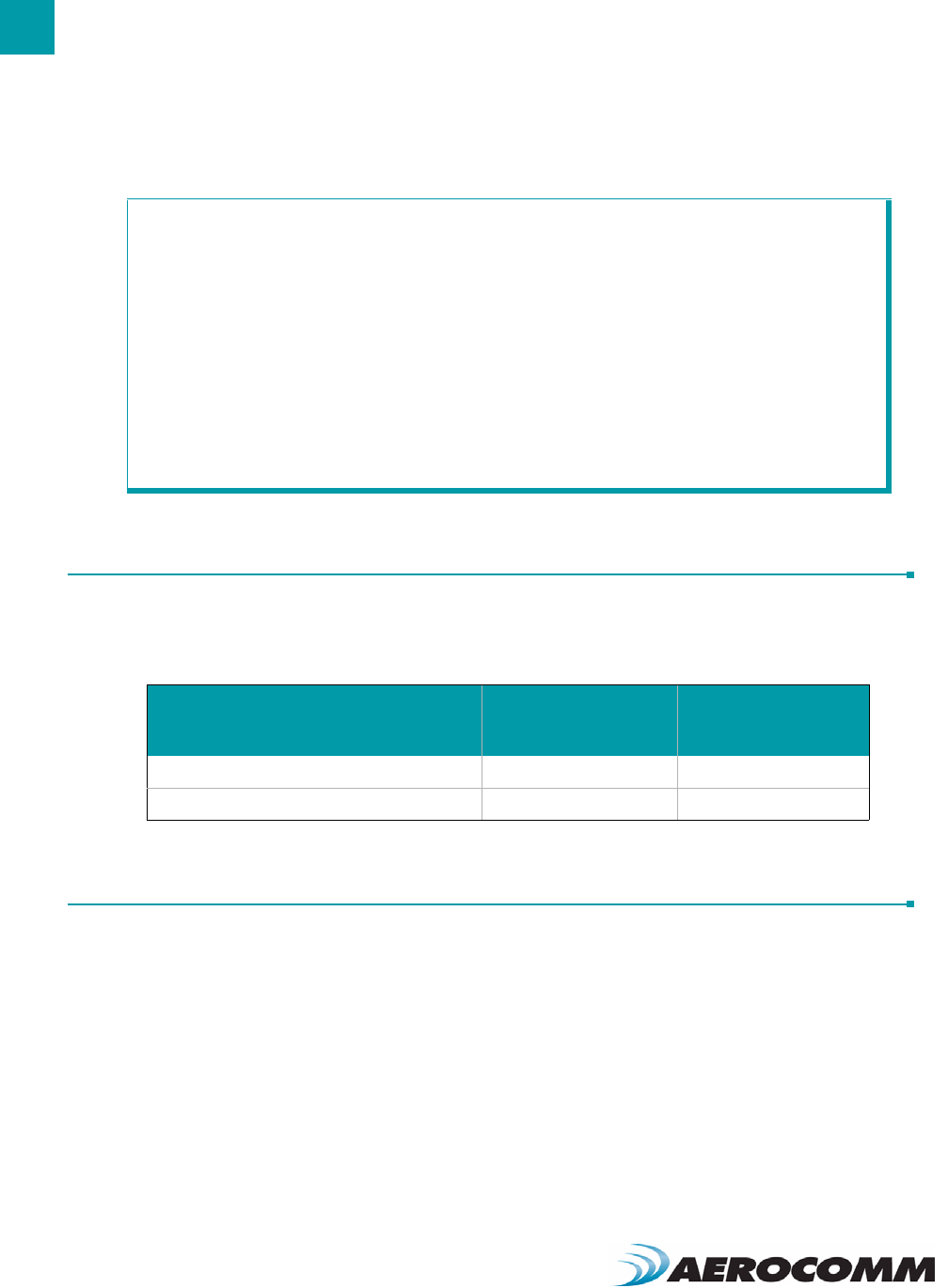
SERIAL INTERFACE
18
should be a strong consideration when designing the system.
SYSTEM THROUGHPUT
When operating as shown below, an AC4790 transceiver is capable of achieving the listed throughput. However, in
the presence of interference or at longer ranges, the transceiver may be unable to meet the specified throughput.
RANDOM BACKOFF
Random Back-Off – The transceivers utilize a Carrier Sense Multiple Access (CSMA) protocol with random back-off
and a selectable back-off seed. In the event of a collision, the transceiver will back off and retry the packet.
Specifically, when two transceivers detect a collision, each transceiver will choose a random number of packet times
that it will wait before retrying the packet. This random number is selected from a pool of numbers defined by the
back-off seed and consists of a number between 1 and 2, 1 and 4, 1 and 8, 1 and 16, 1 and 32, 1 and 64, 1 and 128
and 1 and 256. In a very dense network, where more than two transceivers could experience a collision, it is important
to have a higher random back-off seed.
ENGINEER’S TIP
In High-density applications, what amount of latency should be expected?
It is not easy to predict the exact amount of latency in high-density applications. There are
many variables that affect system latency. The three variables that most affect the latency are
the network load, the distance between transceivers, and whether the transceivers are
operating in a broadcast or addressed mode. There is no fixed answer as to how much latency
will be introduced in the system when considering high-density applications. In these cases
we can just offer qualitative analysis of the latency in high-density applications. As the network
load increases, then the number of collisions that will occur increases. As the number of
collisions increase, then the system latency increases. As the distance between the
transceivers increases, so to does the system latency. Finally, when transceivers operate in
addressed mode they will retry sending a packet up to the number of time specified in the
transmit retry parameter specified in the EEPROM. As the number of retries increases, the
system latency will increase also.
Table 8: Maximum System Throughput
Rf Status Half Duplex
Throughput (bps)
Full Duplex
Throughput (bps)
each way
Radio not in continuous session 25k 12.5k
Radio continuously in session 45k 22.5k
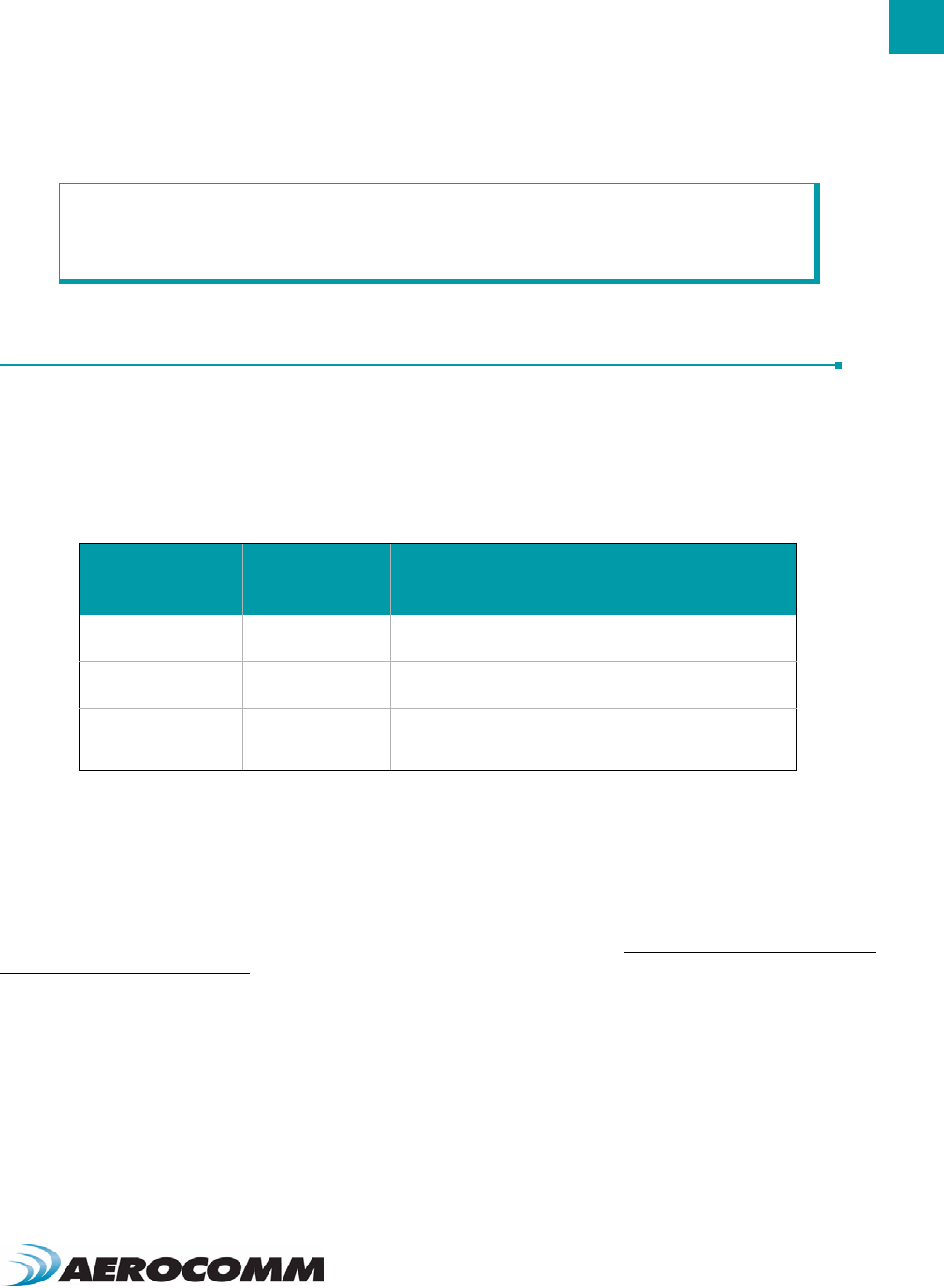
19
SERIAL INTERFACE
www.aerocomm.com
NETWORKING
System ID - System ID (EEPROM address 0x76) is similar to a password character or network number and makes
network eavesdropping more difficult. A transceiver will not establish a Session or communicate with a transceiver
operating on a different System ID or Channel Number.
RF Channel Number - Channels 0x00 - 0x0F and 0x30 - 0x37 hop on 26 different frequencies. Channels 0x10 - 0x2F
use 50 different frequencies.
DES (Data Encryption Standard) - DES (Data Encryption Standard) – Encryption is the process of encoding an
information bit stream to secure the data content. The DES algorithm is a common, simple and well-established
encryption routine. An encryption key of 56 bits is used to encrypt the packet. The receiver must use the exact same
key to decrypt the packet; otherwise garbled data will be produced.
To enable DES, EEPROM Byte 0x45, bit 6 must be set to a value of 1. To disable DES, set bit 6 to a value of 0. The 7
byte (56 bits) Encryption/Decryption Key is located in EEPROM Bytes 0xD0 – 0xD6. It is highly recommended that this
Key be changed from the default.
ENGINEER’S TIP
What effects will Random Backoff have on system latency?
As the random backoff value increases, the overall system latency increases.
Worst case latency (Half Duplex) = 50 ms * Number of retries * Max. random value
Worst case latency (Full Duplex) = 100 ms * Number of retries * Max. random value
Table 9: RF Channel Number Settings
Channel Set1
1. All Channels in a Channel Set use the same frequencies in a different order.
RF Channel
Number Range
(0x40)
Frequency Details &
Regulatory requirements Countries
0 (AC4790 - 1x1
AC4790 - 200)
0x00 - 0x0F 902 - 928 MHz (26 hop bins) US / Canada
1 (AC4790 - 1x1
AC4790 - 1000)
0x10 - 0x2F 902 - 928 MHz (50 hop bins) US / Canada
2 (AC4790 - 1x1
AC4790 - 200
AC4790 - 1000)
0x30 - 0x37 915 - 928 MHz (26 hop bins) US / Canada (-1x1 / -200)
Australia(-1x1/-200/-1000)
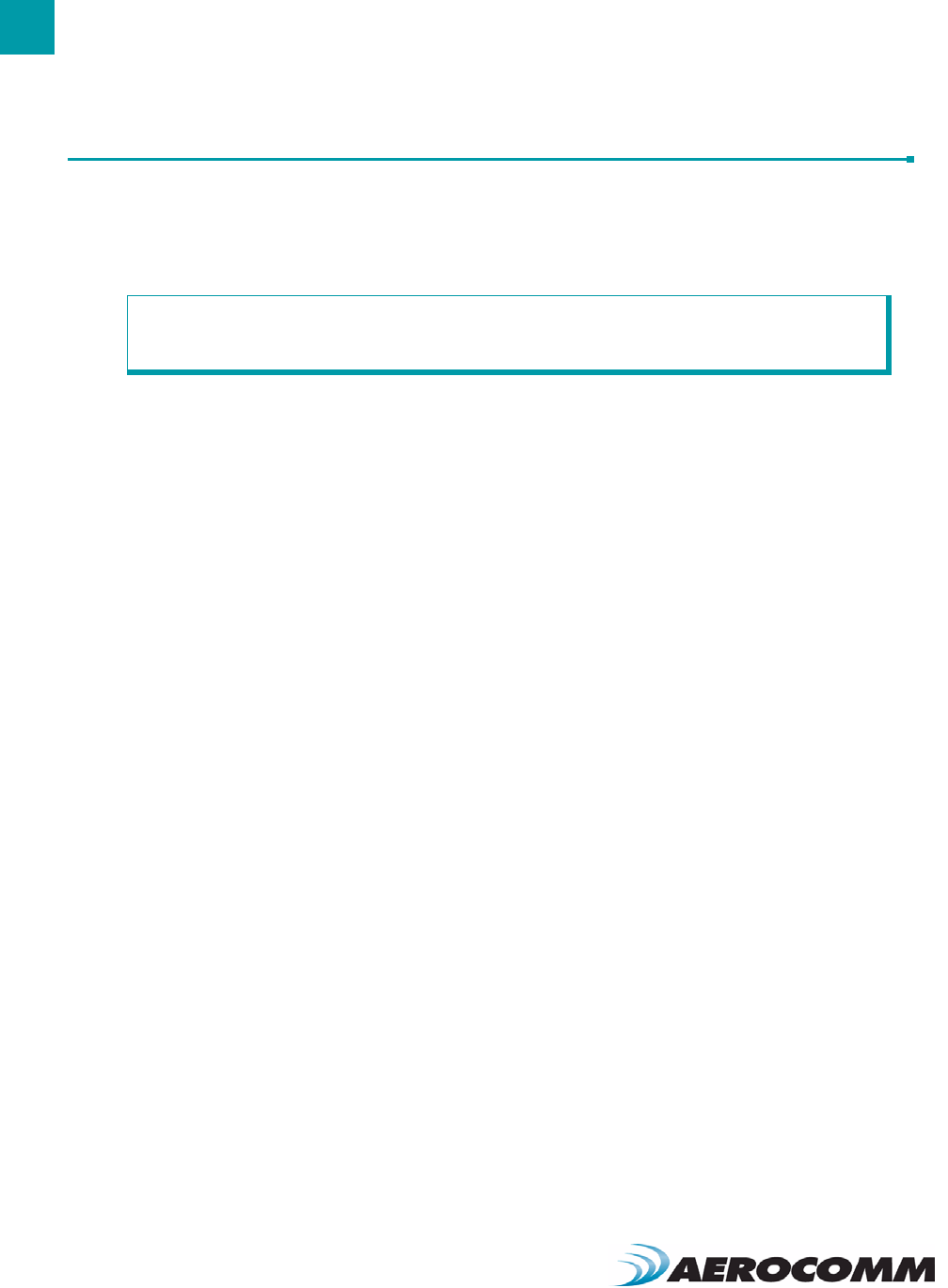
SERIAL INTERFACE
20
MAX POWER
Max Power provides a means for controlling the RF output power of the AC4790. Output power and current
consumption can vary by as much as ±10% per transceiver for a particular Max Power setting. Contact AeroComm
for assistance in adjusting Max Power.
ENGINEER’S TIP
The max power is set during Production and may vary slightly from one transceiver to another.
The max power can be set as low as desired but should not be set higher than the original
factory setting. A backup of the original power setting is stored in EEPROM address 0x8E.

www.aerocomm.com
HARDWARE INTERFACE
5
Below is a description of all hardware pins used to control the AC4790.
PIN DEFINITIONS
Generic I/O
Both GIn pins serve as generic input pins. When Protocol Status (byte 0xC2 of EEPROM) is disabled, GO0 & GO1
serve as generic outputs. When Protocol Status is enabled, pins GO0 and GO1 alternatively serve as the Session
Status and Receive Acknowledge Status pins, respectively. Reading and writing of these pins can be performed
using CC Commands.
HARDWARE PROTOCOL STATUS
When the GO0 pin is configured as the Session Status pin, GO0 is normally Low. GO0 will go High when a Session is
initiated and remain High until the end of the Session. When the GO1 pin is configured as the Receive Acknowledge
Status pin, GO1 is normally Low and GO1 will go High upon receiving a valid RF Acknowledgement and will remain
High until the end (rising edge) of the next hop.
TXD & RXD
SERIAL TTL
The AC4790-200 accepts 3.3 or 5VDC TTL level asynchronous serial data on the RXD pin and interprets that data as
either Command Data or Transmit Data. Data is sent from the transceiver, at 3.3V levels, to the OEM Host via the TXD
pin. Note: The AC4790-1000 & AC4790-1x1 transceivers ONLY accept 3.3V level signals.
RS-485
When equipped with an onboard RS-485 interface chip, TXD and RXD become the half duplex RS-485 pins. The
transceiver interface will be in Receive Mode except when it has data to send to the OEM Host. TXD is the non-
inverted representation of the data (RS485A) and RXD is a mirror image of TXD (RS485B). The transceiver will still use
RTS (if enabled).
CTS
The AC4790 has an interface buffer size of 256 bytes. If the buffer fills up and more bytes are sent to the transceiver
before the buffer can be emptied, data loss will occur. The transceiver prevents this loss by asserting CTS High as the
buffer fills up and taking CTS Low as the buffer is emptied. CTS On and CTS Off control the operation of CTS. CTS On
specifies the amount of bytes that must be in the buffer for CTS to be disabled (logic High). Even while CTS is
disabled, the OEM Host can still send data to the transceiver, but it should do so carefully.
Note: The CTS On/Off bytes of the EEPROM can be set to 1, in which case CTS will go high as data is sent in and low
when buffer is empty.
RTS
With RTS disabled, the transceiver will send any received data to the OEM Host as soon as it is received. However,
some OEM Hosts are not able to accept data from the transceiver all of the time. With RTS enabled, the OEM Host can

HARDWARE INTERFACE
22
prevent the transceiver from sending it data by disabling RTS (logic High). Once RTS is enabled (logic Low), the
transceiver can send packets to the OEM Host as they are received.
Note: Leaving RTS disabled for too long can cause data loss once the transceiver’s 256 byte receive buffer fills up.
Test / 9600 Baud
When pulled logic Low before applying power or resetting, the transceiver’s serial interface is forced to a 9600, 8-N-1
(8 data bits, No parity, 1 stop bit). To exit, the transceiver must be reset or power-cycled with Test pin logic High. This
pin is used to recover transceivers from unknown baud rates only. It should not be used in normal operation. Instead
the transceiver Interface Baud Rate should be programmed to 9600 baud if that rate is desired for normal operation.
The Test/9600 pin should be used for recovery purposes only as some functionality is disabled in this mode.
RSSI
INSTANTANEOUS RSSI
Received Signal Strength Indicator is used by the OEM Host as an indication of instantaneous signal strength at the
receiver. The OEM Host must calibrate RSSI without an RF signal being presented to the receiver. Calibration is
accomplished by following the steps listed below.
1) Power up only one transceiver in the coverage area.
2) Measure the RSSI signal to obtain the minimum value with no other signal present.
3) Power up another transceiver and begin sending data from that transceiver to the transceiver being measured.
Make sure the two transceivers are separated by approximately ten feet.
4) Measure the peak RSSI, while the transceiver is in Session, to obtain a maximum value at full signal strength.
VALIDATED RSSI
As RSSI is only valid when the local transceiver is receiving an RF packet from a remote transceiver, instantaneous
RSSI can be very tricky to use. Therefore, the transceiver stores the most recent valid RSSI value. The OEM Host
issues the Report Last Good RSSI command to request that value. Additionally, validated RSSI can be obtained from
Receive Packet and Send Data Complete API commands and from the Probe command. Validated RSSI is not
available at the RSSI pin. The following equation approximates the RSSI curve:
Signal Strength (dBm) = (-46.9 VRSSI)× 53.9–
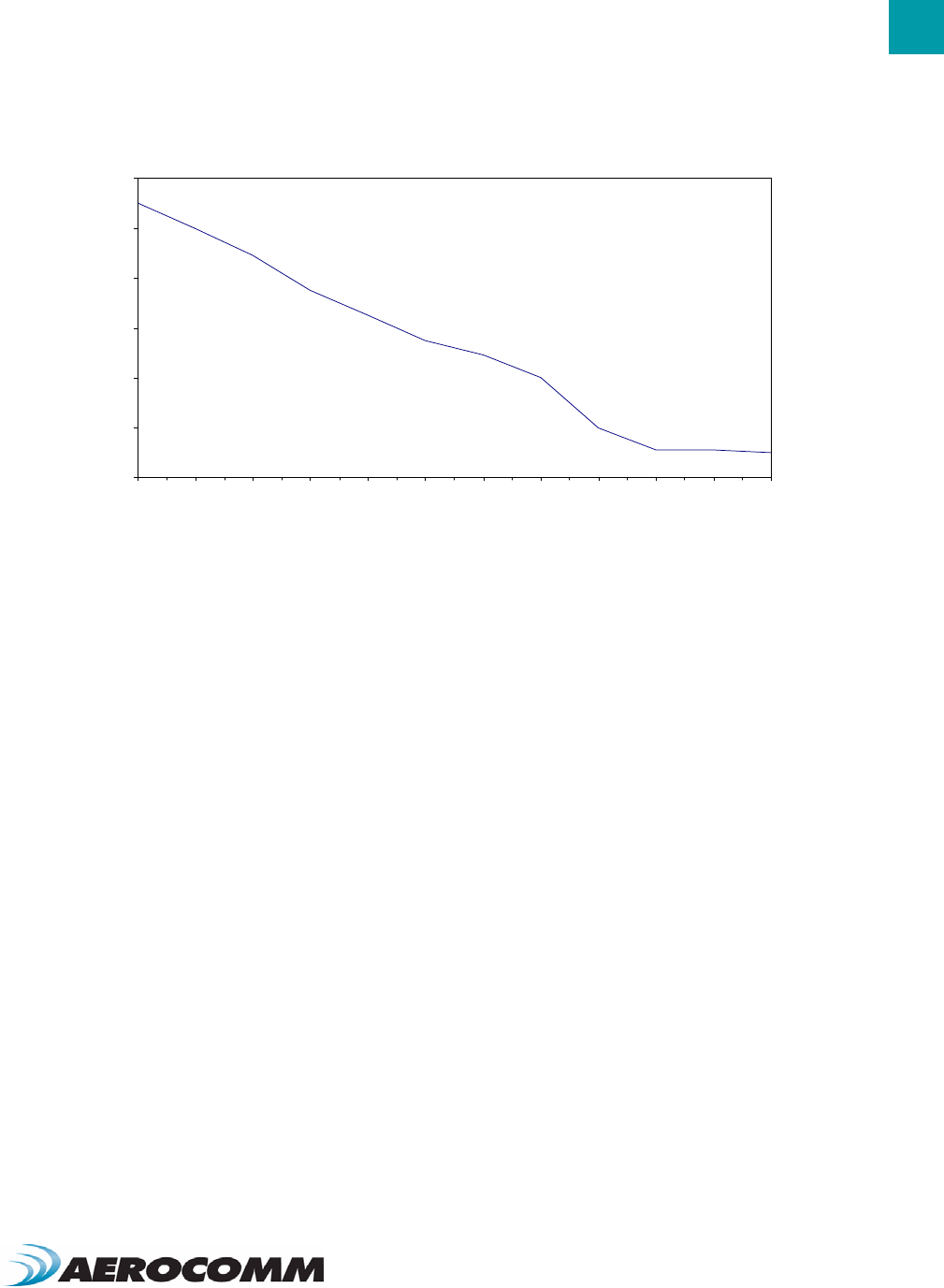
23
HARDWARE INTERFACE
www.aerocomm.com
Figure 4: RSSI Voltage vs. Received Signal Strength
UP_Reset
UP_Reset provides a direct connection to the reset pin on the AC4790 microprocessor and is used to force a soft
reset. For a valid reset, reset must be asserted High for a minimum of 10ms.
Command/Data
When logic High, the transceiver interprets incoming OEM Host data as transmit data to be sent to other transceivers
and their OEM Hosts. When logic Low, the transceiver interprets OEM Host data as command data.
AD In
AD In can be used as a cost savings to replace Analog-to-Digital converter hardware. Reading of this pin can be
performed locally using the Read ADC command found in the On-the-Fly Control Command Reference.
Session Status
Reports logic Low during a Session and logic High when not in Session. The inverse of this pin can be obtained from
pin GO0 when Protocol Status is enabled.
0
0.2
0.4
0.6
0.8
1
1.2
-105 -100 -95 -90 -85 -80 -75 -70 -65 -60 -55 -50
Signal at Receiver (dBm)
Voltage (VDC)
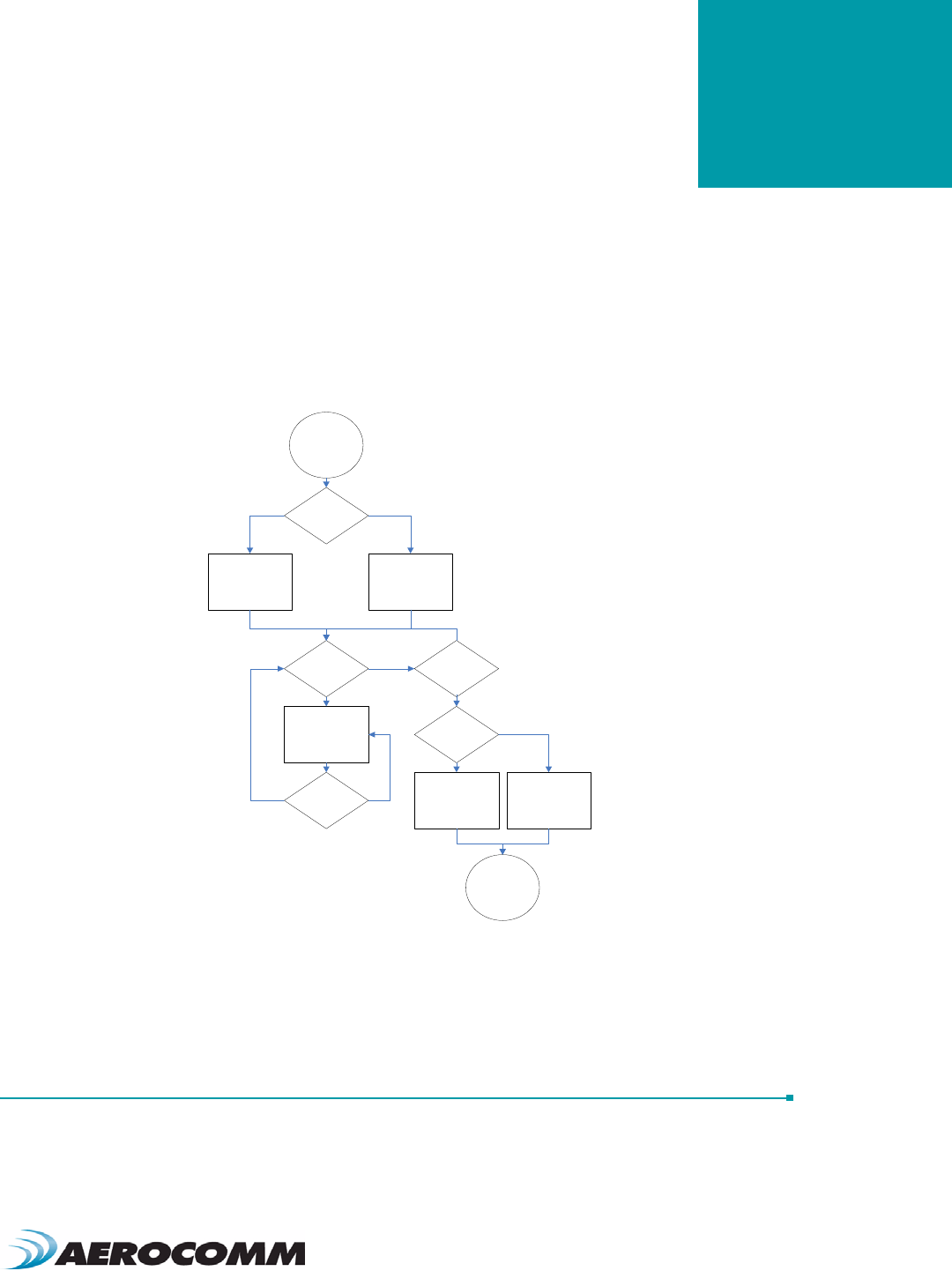
www.aerocomm.com
CONFIGURING THE AC4790
6
The AC4790 can be configured using the CC Configuration Commands. The CC Commands can be issued using
either Hardware or Software Configuration. To use Hardware Configuration, pin 17 of a transceiver must be asserted
Low. Software Configuration can be used by entering AT Command Mode before issuing the CC Commands.
Figure 5: AC4790 Configuration Flow
AT COMMANDS
The AT Command mode implemented in the AC4790 creates a virtual version of the Command/Data pin. The “Enter
AT Command Mode” Command asserts this virtual pin Low (to signify Command Mode) and the “Exit AT Command
Mode” Command asserts this virtual pin High (to signify Data). Once this pin has been asserted Low, all On-the-Fly
CC Commands documented in the manual are supported.
Use AT
Commands
Receive Mode
Take Pin 17 Low
(Hardware
Configuration)
AT+++
(Software
Configuration)
Send CC
Commands Exit Command
Mode
In AT
Command
Mode
Send CC
Command
Send Another
CC Command
Send Exit AT
Command Mode
Command Take Pin 17 High
Receive Mode
Yes
Yes
Yes
Yes

25
CONFIGURING THE AC4790
www.aerocomm.com
On-the-Fly Control Commands
The AC4790 transceiver contains static memory that holds many of the parameters that control the transceiver
operation. Using the “CC” command set allows many of these parameters to be changed during system operation.
Because the memory these commands affect is static, when the transceiver is reset, these parameters will revert back
to the settings stored in the EEPROM. While in CC Command mode using pin 17 (Command/Data), the RF interface
of the transceiver is still active. Therefore, it can receive packets from remote transceivers while in CC Command
mode and forward these to the OEM Host.
While in CC Command mode using AT Commands, the RF interface of the transceiver is active, but packets sent from
other transceivers will not be received. The transceiver uses Interface Timeout/RF Packet Size to determine when a
CC Command is complete. Therefore, there should be no delay between each character as it is sent from the OEM
Host to the transceiver or the transceiver will not recognize the command. If the OEM Host has sent a CC Command
to the transceiver and an RF packet is received by the transceiver, the transceiver will send the CC Command
response to the OEM Host before sending the packet. However, if an RF packet is received before the Interface
Timeout expires on a CC Command, the transceiver will send the packet to the OEM Host before sending the CC
Command response.
When an invalid command is sent, the radio scans the command to see if it has a valid command followed by bytes
not associated with the command, in which case the radio discards the invalid bytes and accepts the command. In all
other cases, the radio returns the first byte of the invalid command back to the user and discards the rest.
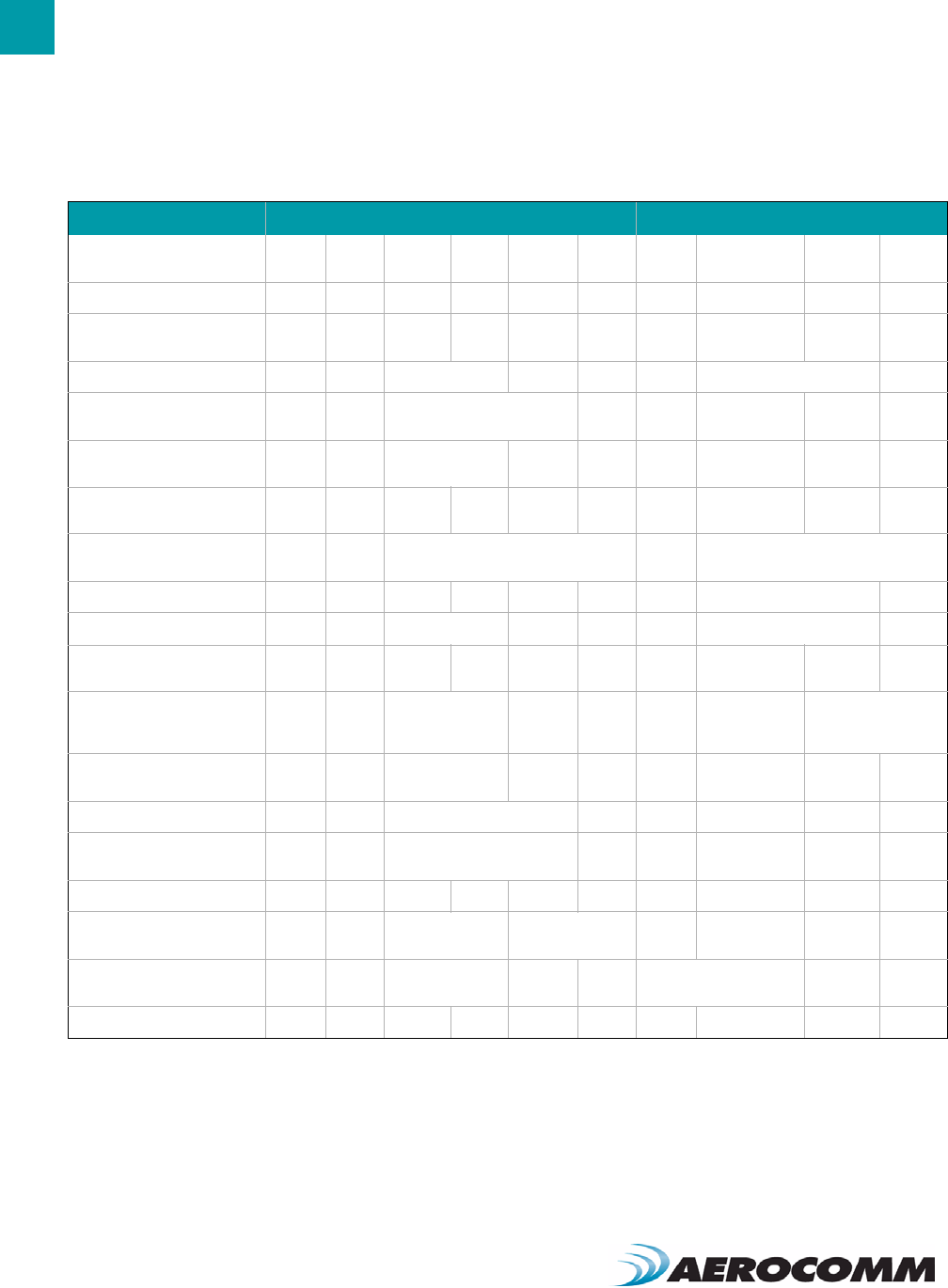
CONFIGURING THE AC4790
26
Table 10: Command Quick Reference
Command Name Command (All Bytes in Hex) Return (All Bytes in Hex)
AT Enter
CommandMode
0x41 0x54 0x2B 0x2B 0x2B 0x0D 0xCC 0x43 0x4F 0x4D
Exit AT CommandMode 0xCC 0x41 0x54 0x4F 0x0D -0xCC 0x44 0x41 0x54
Status Request 0xCC 0x00 0x00 - - - 0xCC Firmware Ver-
sion
0x00 -
0x03
-
Change Channel 0xCC 0x01 New Channel - - 0xCC New Channel -
Broadcast
Packets
0xCC 0x08 0x00: Broadcast
0x01: Addressed
-0xCC 0x00 or 0x01 - -
Write Destination Address 0xCC 0x10 Byte 4 of
Dest. MAC
Byte 5 Byte
6
0xCC Byte 4 of Dest.
MAC
Byte 5 Byte 6
Read Destination Address 0xCC 0x11 - - - - 0xCC Byte 4 of Dest.
MAC
Byte 5 Byte 6
Auto Destination 0xCC 0x15 bit-0: Auto Destination
bit-4: Enable Auto Destination
0xCC bit-0: Auto Destination
bits-1-7: 0
Read API Control 0xCC 0x16 - - - - 0xCC API Control -
Write API Control 0xCC 0x17 API Control - - 0xCC API Control -
Read Digital Inputs 0xCC 0x20 - - - - 0xCC bit-0: GI0
bit-1: GI1
- -
Read ADC 0xCC 0x21 0x01: AD In
0x02: Temp
0x03: RSSI
- - 0xCC MSB of 10 bit
ADC
LSB of 10 bit ADC
Write Digital
Outputs
0xCC 0x23 bit-0: GO0
bit-1: GO1
- - 0xCC bit-0: GO0
bit-1: GO1
- -
Set Max Power 0xCC 0x25 New Max Power -0xCC Max Power - -
Enter Probe 0xCC 0x8E 0x00: Enter Probe
0x01: Exit Probe
-0xCC 0x00 or 0x01 - -
Read Temperature 0xCC 0xA4 - - - - 0xCC Temp (C) - -
EEPROM Byte Read 0xCC 0xC0 Start Address Length 0xCC Starting
Address
Length Data
EEPROM Byte Write 0xCC 0xC1 Start Address Length Data Starting Address Length Data
written
Soft Reset 0xCC 0xFF - - - - - - - -
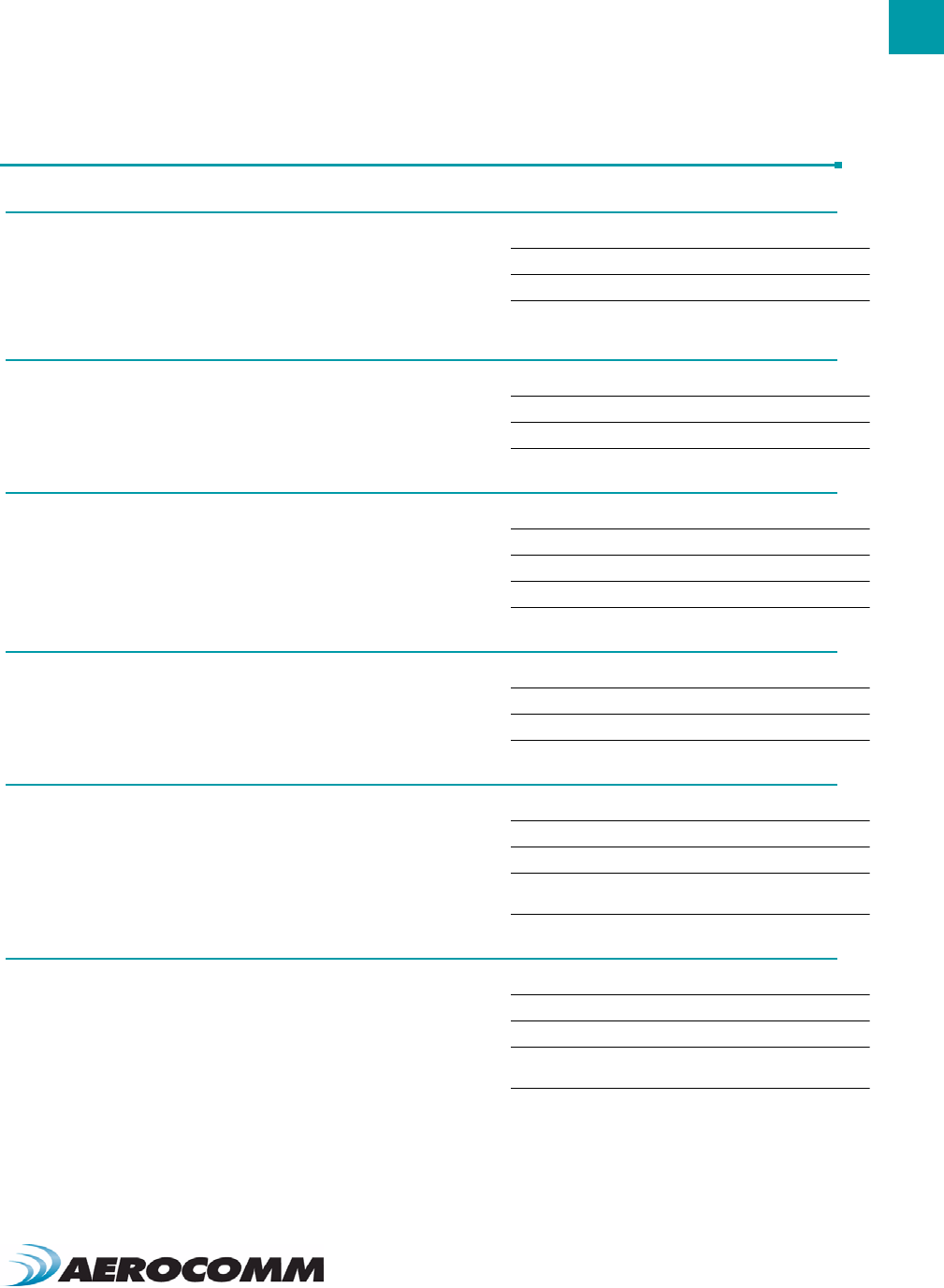
27
CONFIGURING THE AC4790
www.aerocomm.com
COMMAND DESCRIPTIONS
Enter AT Command Mode
Prior to sending this command, the OEM Host must ensure that the
transceiver’s RF transmit buffer is empty. If the buffer is not empty, the
radio will interpret the command as data and it will be sent over the RF.
This can be accomplished by waiting up to one second between the
last packet and the AT command.
Command: 0x41 0x54 0x2B 0x2B 0x2B 0x0D
Number of Bytes Returned: 4
Response: 0xCC 0x43 0x4F 0x4D
Exit AT Command Mode
The OEM Host should send this command to exit AT Command mode
and resume normal operation.
Command: 0xCC 0x41 0x54 0x4F 0x0D
Number of Bytes Returned: 4
Response: 0xCC 0x44 0x41 0x54
Firmware Version Request
The OEM Host issues this command to request the firmware of the
transceiver.
Command: 0xCC 0x00 0x00
Number of Bytes Returned: 3
Response: 0xCC Version XX
Parameter Range: XX = 0x00 - 0x03 (Ignore)
Change Channel
The OEM Host issues this command to change the channel of the
transceiver.
Command: 0xCC 0x01 Channel
Number of Bytes Returned: 2
Response: 0xCC Channel
Broadcast Packets
The OEM Host issues this command to change the transceiver
operation between Addressed Packets and Broadcast Packets. If
Addressed Packets are selected, the transceiver will send all packets to
the transceiver designated by the Destination Address programmed in
the transceiver. If Broadcast Packets are selected, the transceiver will
send its packets to all transceivers on that network. Setting bit-7 of API
Control to 1 can also enable Broadcast Packets.
Command: 0xCC 0x08 Data1
Number of Bytes Returned: 2
Response: 0xCC Data1
Parameter Range: Data1 = 0x00 for Addressed, 0x01 for
Broadcast
Write Destination Address
The OEM Host issues this command to the transceiver to change the
Destination Address.
Note: Only the three Least Significant Bytes of the MAC Address are
used for packet delivery.
Command: 0xCC 0x10 MAC3 MAC2 MAC1
Number of Bytes Returned: 4
Response: 0xCC MAC3 MAC2 MAC1
Parameter Range: 0x00 - 0xFF corresponding to 3 LSB’s of
destination MAC Address
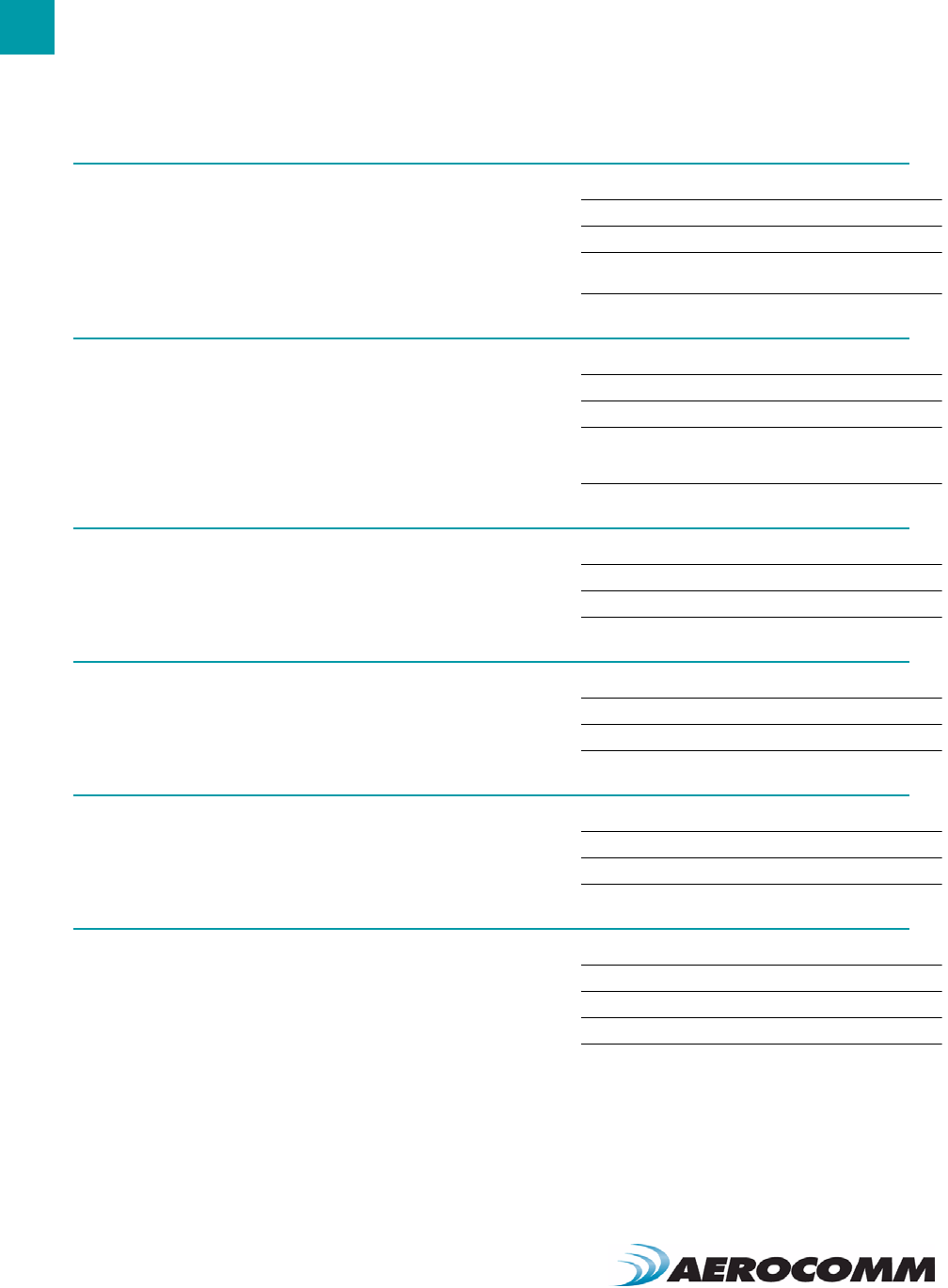
CONFIGURING THE AC4790
28
Read Destination Address
The OEM Host issues this command to the transceiver to read the
destination address.
Note: Only the three Least Significant Bytes of the MAC Address are
used for packet delivery.
Command: 0xCC 0x11
Number of Bytes Returned: 4
Response: 0xCC MAC3 MAC2 MAC1
Parameter Range: 0x00 - 0xFF corresponding to 3 LSB’s of
destination MAC Address
Auto Destination
The Host issues this command to change the Auto Destination setting.
When issuing this command, the Auto Destination setting will only be
changed if the corresponding enable bit is set (Control1 Parameter,
EEPROM address 0x56, bit-4).
Command: 0xCC 0x15 Data1
Number of Bytes Returned: 2
Response: 0xCC Data2
Parameter Range: Data1 = bit-0: Auto Destination, bit-4:
Enable Auto Destination modification; Data2 = bit-0: New
Auto Destination setting, bits 2 - 7:0
Read API Control
The OEM Host issues this command to read the API Control byte. Command: 0xCC 0x16
Number of Bytes Returned: 2
Response: 0xCC API Control
Write API Control
The OEM Host issues this command to write the API Control byte. Command: 0xCC 0x17
Number of Bytes Returned: 2
Response: 0xCC API Control
Set Max Power
The OEM Host issues this command to limit the maximum transmit
power emitted by the transceiver. This can be useful to minimize
current consumption and satisfy certain regulatory requirements. The
radios are shipped at maximum allowable power.
Command: 0xCC 0x25 Max Power
Number of Bytes Returned: 2
Response: 0xCC Max Power
Read Temperature
The OEM Host issues this command to read the onboard temperature
sensor. The transceiver reports the temperature in oC where 0x00 -
0x80 corresponds to 0 - 80 oC and where 0xD8 - 0x00 corresponds to -
40 - 0 oC.
Command: 0xCC 0xA4
Number of Bytes Returned: 2
Response: 0xCC Temperature
Parameter Range: Temperature = 0xD8 - 0x80
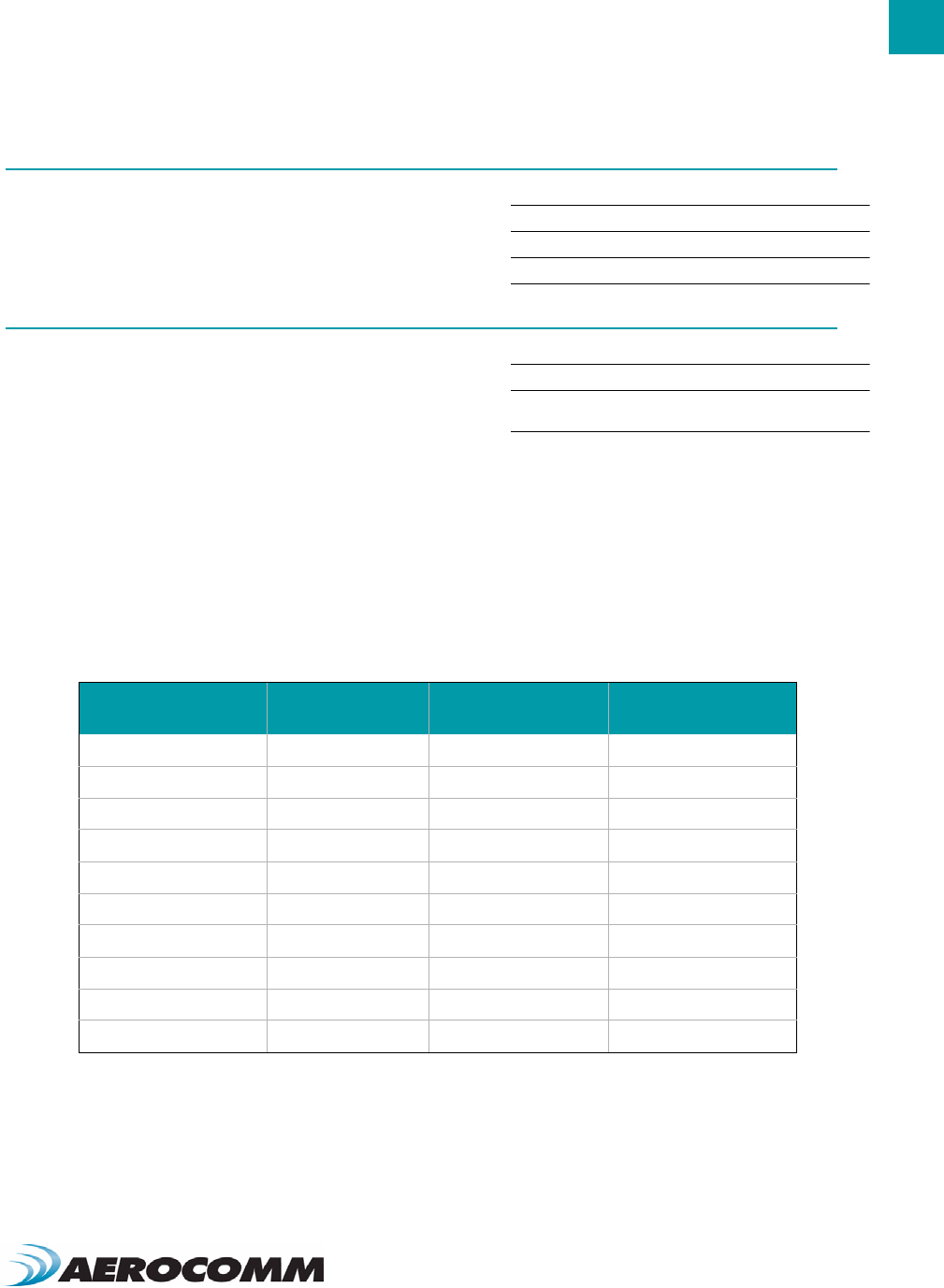
29
CONFIGURING THE AC4790
www.aerocomm.com
Read Digital Inputs
The OEM Host issues this command to read the state of both digital
input lines.
Command: 0xCC 0x20
Number of Bytes Returned: 2
Response: 0xCC Data1
Parameter Range: Data1 = bit-0: GI0, bit-1: GI1
Read Radio Table
The OEM Host issues this command to read the Radio Table that
resides on the transceiver. The Radio Table stores information for up to
the last 8 transceivers that it received a packet from. This information
can be useful for determining alternative data paths.
Stale Count: The Stale Count Reload (0x04) determines the amount of
time that a transceiver stays active in the Radio Table. The Stale Count
(min: 0x00; max: dependent on EEPROM setting) for a radio is set to 0
when a packet is received; and then incremented by one every 100 ms
thereafter. When the Stale Count of a transceiver reaches the Stale
Count Reload (0x04), the transceiver is considered stale. A Radio Table
can hold information for up to 8 different transceivers; however if the
table is full and a ninth radio appears, the first stale radio is replaced
with the new radio. If none of the radios are stale, the oldest radio is
replaced by the new radio.
Command: 0xCC 0x18
Number of Bytes Returned: Varies
Response: 0xCC #Transceivers MAC2 MAC1 MAC0 RSSI
RSSI* StaleCount MAC2 MAC1 MAC0...etc.
Table 11: Received Signal Strength
Signal Strength (dBm) RSSI Value (Hex) Signal Strength
(dBm) RSSI Value (Hex)
40x0E -62 0x2B
-2 to 1 0x0D -66 0x40
-12 to -6 0x0C -69 0x55
-36 to -22 0x0B -72 0x62
-42 to -39 0x0C -76 0x71
-46 0x0D -79 0x78
-49 0x0E -82 0x84
-52 0x11 -86 0x9A
-56 0x17 -89 0xAD
-59 0x1C -92 0xBD
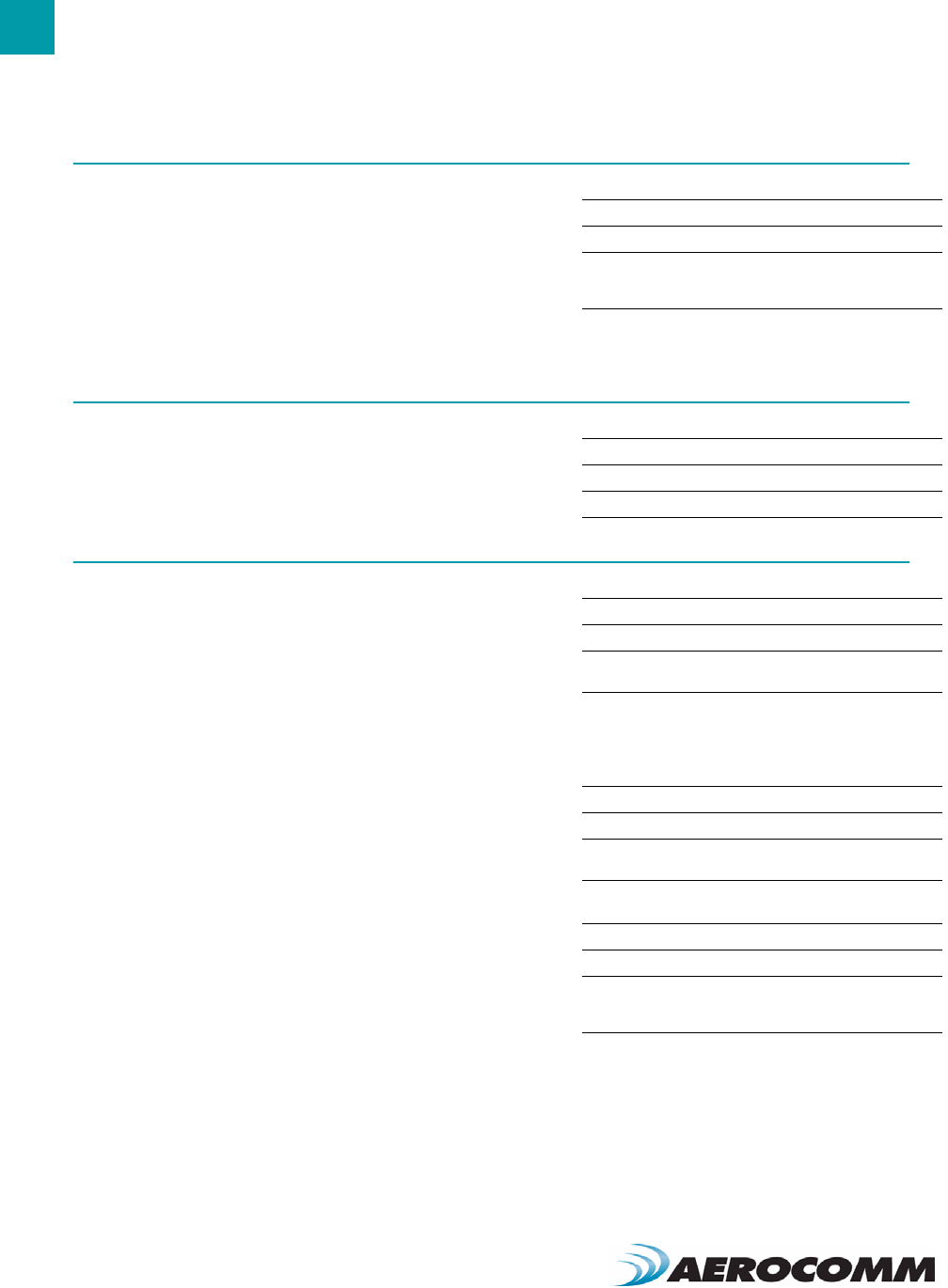
CONFIGURING THE AC4790
30
Read ADC
The OEM Host issues this command to read any of the three onboard
10-bit A/D converters. Because the RF is still active in On-the-Fly
Command Mode, the transceiver will not process the command until
there is no activity on the network. The Read RSSI command is
therefore useful for detecting interfering sources but will not report the
RSSI from a remote transceiver on the network. The equations for
converting these 10 bits into analog values are as follows:
Analog Voltage = (10 bits / 0x3FF) * 3.3V
Temperature (oC) = ((Analog Voltage - 0.3) / 0.01) - 30
RSSI value (dBm) = -105 + (0.22 * (0x3FF - 10 bits))
Command: 0xCC 0x21 Data1
Number of Bytes Returned: 3
Response: 0xCC Data2 Data3
Parameter Range: Data1 = 0x00: AD In, 0x01: Temperature,
0x02: RSSI; Data2 = MSB of requested 10-bit ADC value;
Data3 = LSB of requested 10-bit ADC value
Write Digital Outputs
The OEM Host issues this command to write both digital output lines to
particular states.
Note: This command should only be used when Protocol Status (0xC2)
is not set to 0xE3.
Command: 0xCC 0x23 Data1
Number of Bytes Returned: 2
Response: 0xCC Data1
Parameter Range: Data1 = bit-0: GO0, bit-1: GO1
Probe
Enabling bit-6 of API Control will enable this command. When the OEM
Host issues this command, the transceiver sends out a query every 500
ms. The transceivers, upon receiving the query, randomly choose a
query to respond to. After responding to a Probe, the transceiver will
wait at least 10 seconds before responding to another probe.
Apart from the transceiver response, there are two other responses that
provide crucial information to the OEM Host. This information can be
used to monitor the network and determine alternate routing paths.
Probe Report
Remote transceiver’s response to its OEM host upon receiving a Probe
query.
Note: Only valid when Probe Report (address 0xC9) is set to 0xE3.
Transceiver’s Response
Upon hearing the remote transceiver’s probe acknowledge, the
transceiver sends a response to the OEM Host.
Command: 0xCC 0x8E Data1
Number of Bytes Returned: 2
Response: 0xCC Data1
Parameter Range: 0x00 = Disable Probe, 0x01 = Enable
Probe
Command: N/A
Number of Bytes Returned: 5
Response: 0x86 RSSI MAC3 MAC2 MAC1
Parameter Range: MAC3 MAC2 MAC1 = 3 LSB’s of radio
sending the Probe query
Command: N/A
Number of Bytes Returned: 6
Response: 0x87 RSSI RSSI* MAC3 MAC2 MAC1
Parameter Range: RSSI = How strong remote heard local
transceiver; RSSI* = How strong local heard remote
transceiver
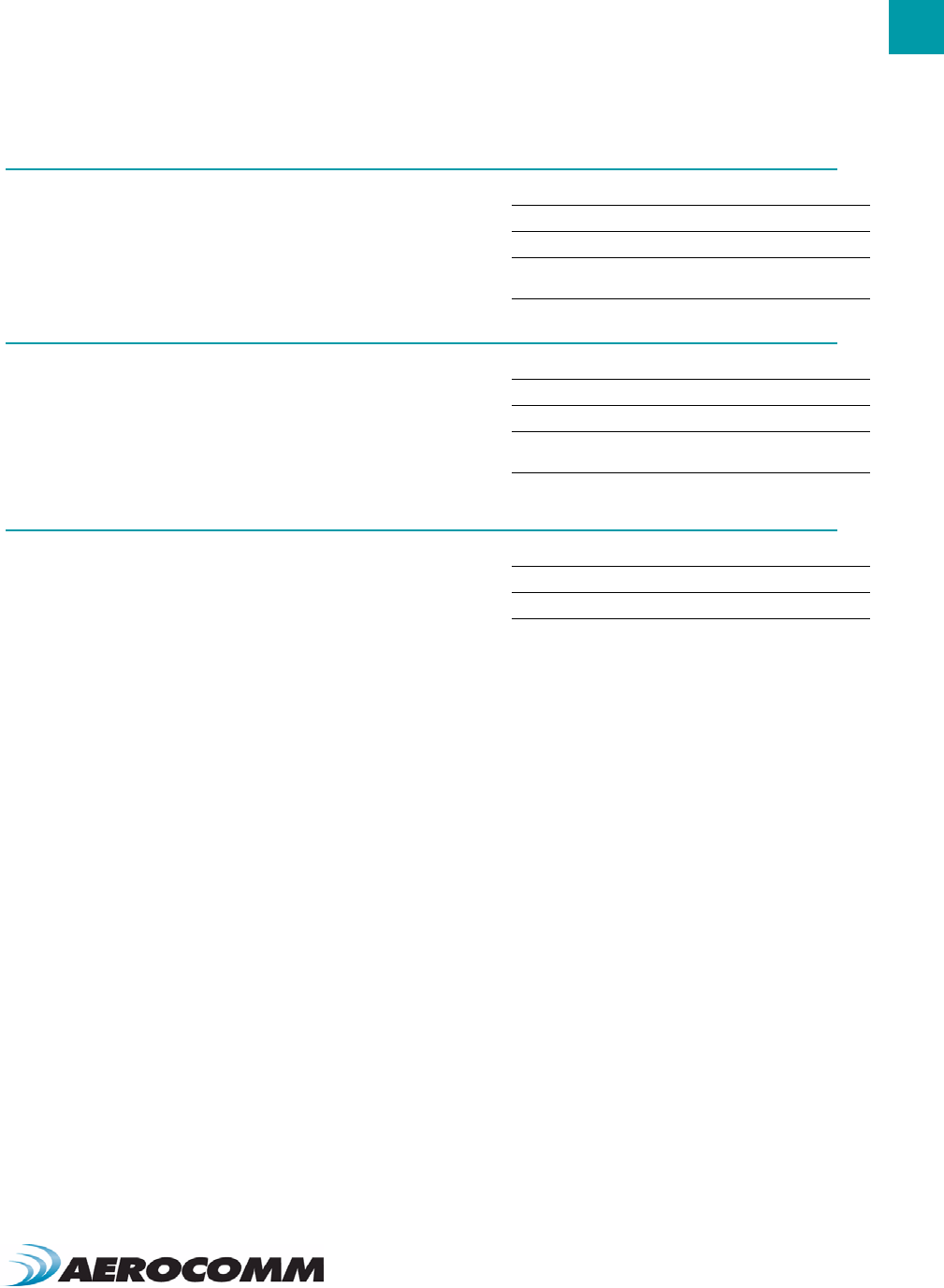
31
CONFIGURING THE AC4790
www.aerocomm.com
EEPROM Byte Read
Upon receiving this command, a transceiver will respond with the
desired data from the addresses requested by the OEM Host.
Command: 0xCC 0xC0 Data1 Data2
Number of Bytes Returned: 4+
Response: 0xCC Data1 Data2 Data3
Parameter Range: Data1 = EEPROM address; Data2 =
Length (0x00 - 0x80); Data3 = Requested data
EEPROM Byte Write
Upon receiving this command, a transceiver will write the data byte to
the specified address but will not echo it back to the OEM Host until the
EEPROM write cycle is complete (up to 10 ms).
Multiple byte writes of up to 128 bytes are allowed. An EEPROM
boundary exists between addresses 0x7F and 0x80. No single
EEPROM write command shall write to addresses on both sides of that
EEPROM boundary.
Command: 0xCC 0xC1 Data1 Data2
Number of Bytes Returned: 4+
Response: 0xCC Data1 Data2 Data
Parameter Range: Data1 = EEPROM address; Data2 =
Length (0x00 - 0x80); Data3 = Data written
Reset
The OEM Host issues this command to perform a soft reset of the
transceiver. Any transceiver settings modified by CC commands will
revert to the values stored in the EEPROM.
Command: 0xCC 0xFF
Number of Bytes Returned: None
Response: None
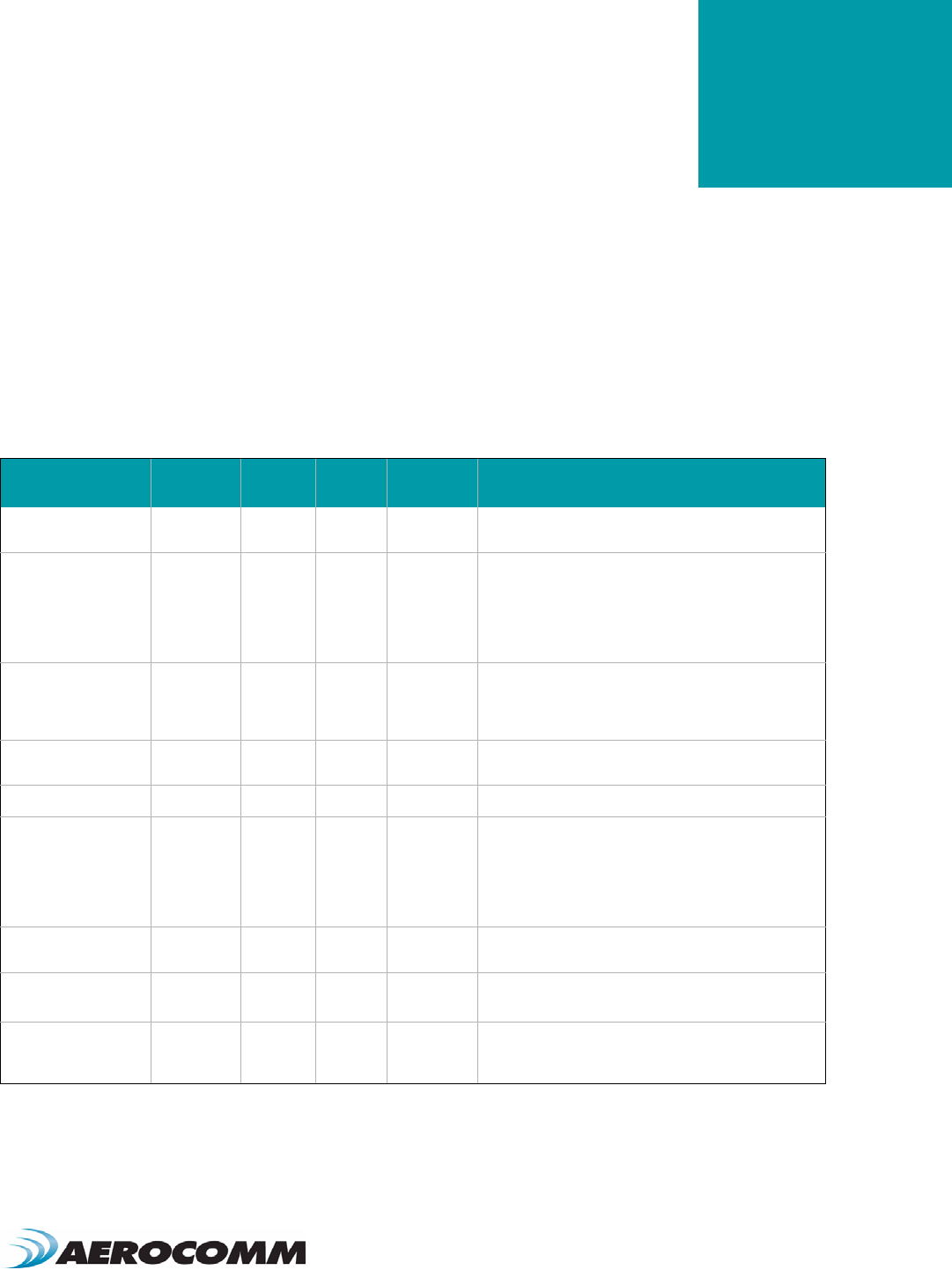
www.aerocomm.com
EEPROM PARAMETERS
7
The OEM Host can program various parameters that are stored in EEPROM which become active after a power-on
reset. The table below gives the locations and descriptions of the parameters that can be read/written by the OEM
Host. Factory default values are also shown. Do not write to any EEPROM addresses other than those listed below.
Do not copy one transceiver’s EEPROM to another transceiver as doing so may cause the transceiver to malfunction.
Table 12: EEPROM Parameters
Parameter EEPROM
Address
Length
(Bytes) Range Default Description
Product ID 0x00 40 40 bytes - Product identifier string. Includes revision
information for software and hardware.
Stop Bit Delay 0x3F 10x00 -
0xFF
0xFF For systems employing the RS-485 interface or Parity, the
serial stop bit might come too early. Stop bit delay controls
the width of the last bit before the stop bit occurs.
0xFF = Disable Stop Bit Delay (12 us)
0x00 = (256 * 1.6 us) + 12 us
0x01 - 0xFE = (value * 1.6 us) + 12 us
Channel Number 0x40 10x00 -
0x37
1x1: 0x00
200: 0x00
1000: 0x10
Set 0 = 0x00 - 0x0F (US/Canada): 1x1/200
Set 1 = 0x10 - 0x2F (US/Canada): 1x1/1000
Set 2 = 0x30 - 0x37 (US/Canada): 1x1/200;
Australia: 1x1/200/1000
Baud Rate Low 0x42 10x00 -
0xFF
0xFC Low byte of the interface baud rate. Default baud rate is
57,600.
Baud Rate High 0x43 10x00 0x00 High byte of interface baud. Always 0x00
Control 0 0x45 10x00 Settings are:
bit-7: 0
bit-6: DES Enable
0 = Disable
1 = Enable
bits 5-0: 0
Transmit Retries 0x4C 10x01 -
0xFF
0x10 Maximum number of times a packet is sent out when
Addressed packets are selected.
Broadcast
Attempts
0x4D 10x01 -
0xFF
0x04 Maximum number of times a packet is sent out when
Broadcast packets are selected.
Stale Count Reload 0x4F 10x01 -
0xFF
0x40 Determines the amount of time that a transceiver will keep a
radio active in its Receive Table. This value is reset every
time a packet is received from that radio.
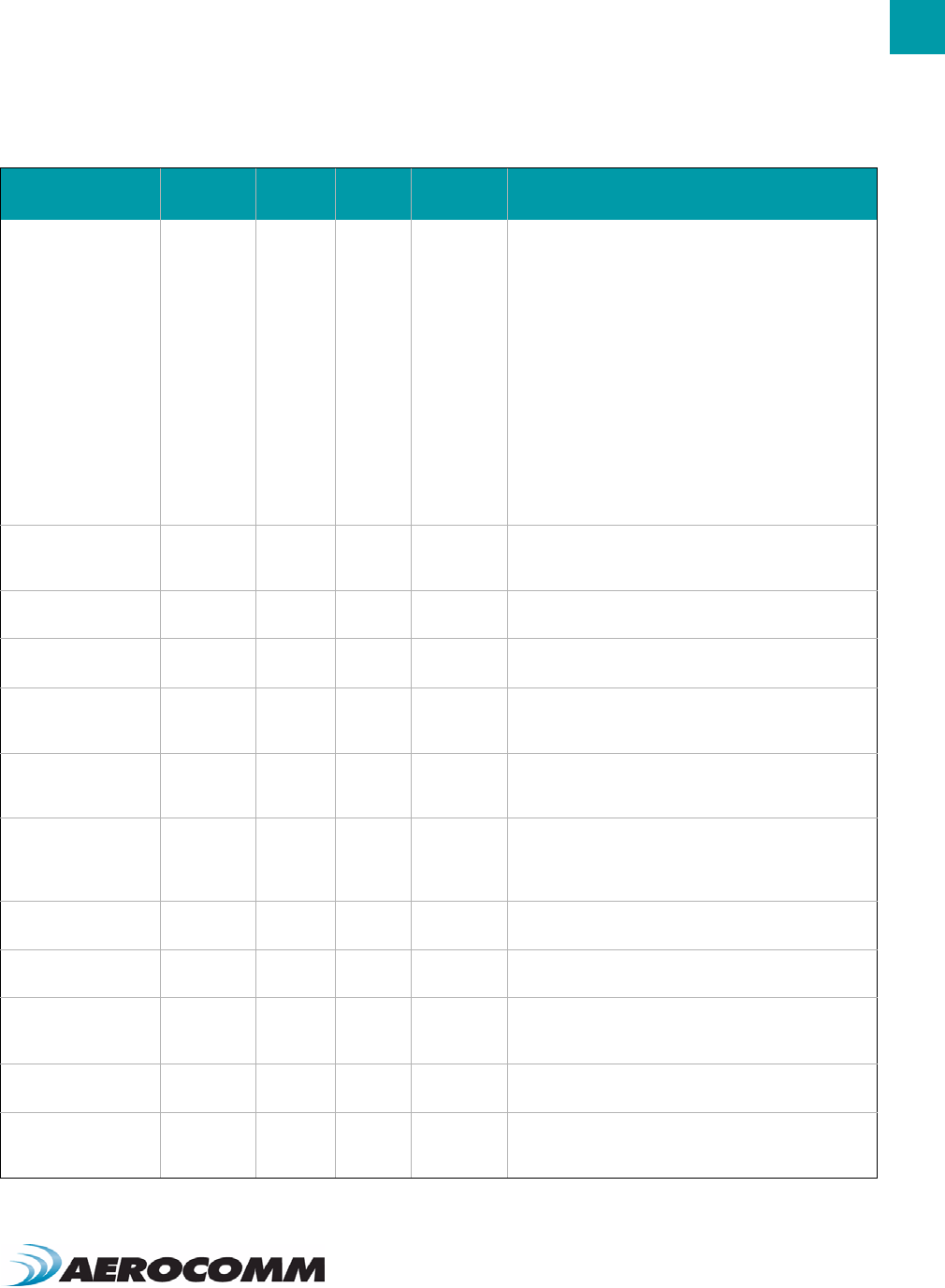
33
EEPROM PARAMETERS
www.aerocomm.com
Control 1 0x56 10x43 Settings are:
bit-7: Aerocomm Use Only
bit-6: Aerocomm Use Only
bit-5: Aerocomm Use Only
bit-4: Auto Destination
0 = Use destination address
1 = Use auto destination
bit-3: Aerocomm Use Only
bit-2: RTS Enable
0 = Ignore RTS
1 = Transceiver obeys RTS
bit-1: Duplex
0 = Half Duplex
1 = Full Duplex
bit-0: Auto Config
0 = Use EEPROM values
1 = Auto Configure values
Interface Timeout 0x58 10x02 -
0xFF
0x04 Specifies a byte gap timeout, used in conjunction with RF
Packet Size to determine when a packet coming over the
interface is complete (0.5 ms per increment).
RF Packet Size 0x5B 10x01 -
0x80
0x80 Used in conjunction with Interface Timeout; specifies the
maximum size of an RF packet.
CTS On 0x5C 10x01 -
0xFF
0xD2 CTS will be deasserted (High) when the transmit buffer
contains at least this many characters.
CTS Off 0x5D 10x00 -
0xFE
0xAC Once CTS has been deasserted, CTS will be reasserted
(Low) when the transmit buffer is contains this many or less
characters.
Max Power 0x63 10x00 -
0x60
Set in
Production
& can vary
Used to increase/decrease the output power. The
transceivers are shipped at maximum allowable power.
Parity 0x6F 10xE3,
0xFF
0xFF 0xE3 = Enable Parity
0xFF = Disable Parity
Note: Enabling parity cuts throughput and the interface
buffer size in half.
Destination ID 0x70 60x00 -
0xFF
Specifies destination for RF packets
System ID 0x76 10x00 -
0xFF
0x01 Similar to network password. Radios must have the same
system ID to communicate with each other.
RS-485 DE 0x7F 10xE3,
0xFF
0xFF 0xE3 = GO0 is active Low DE for control of external RS-485
hardware
0xFF = Disable RS-485 DE
MAC ID 0x80 60x00 -
0xFF
Factory programmed unique IEEE MAC address.
Original Max
Power
0x8E 1Set in
Production
and can vary
Copy of original max power EEPROM setting. This address
may be referenced but should not be modified.
Table 12: EEPROM Parameters
Parameter EEPROM
Address
Length
(Bytes) Range Default Description
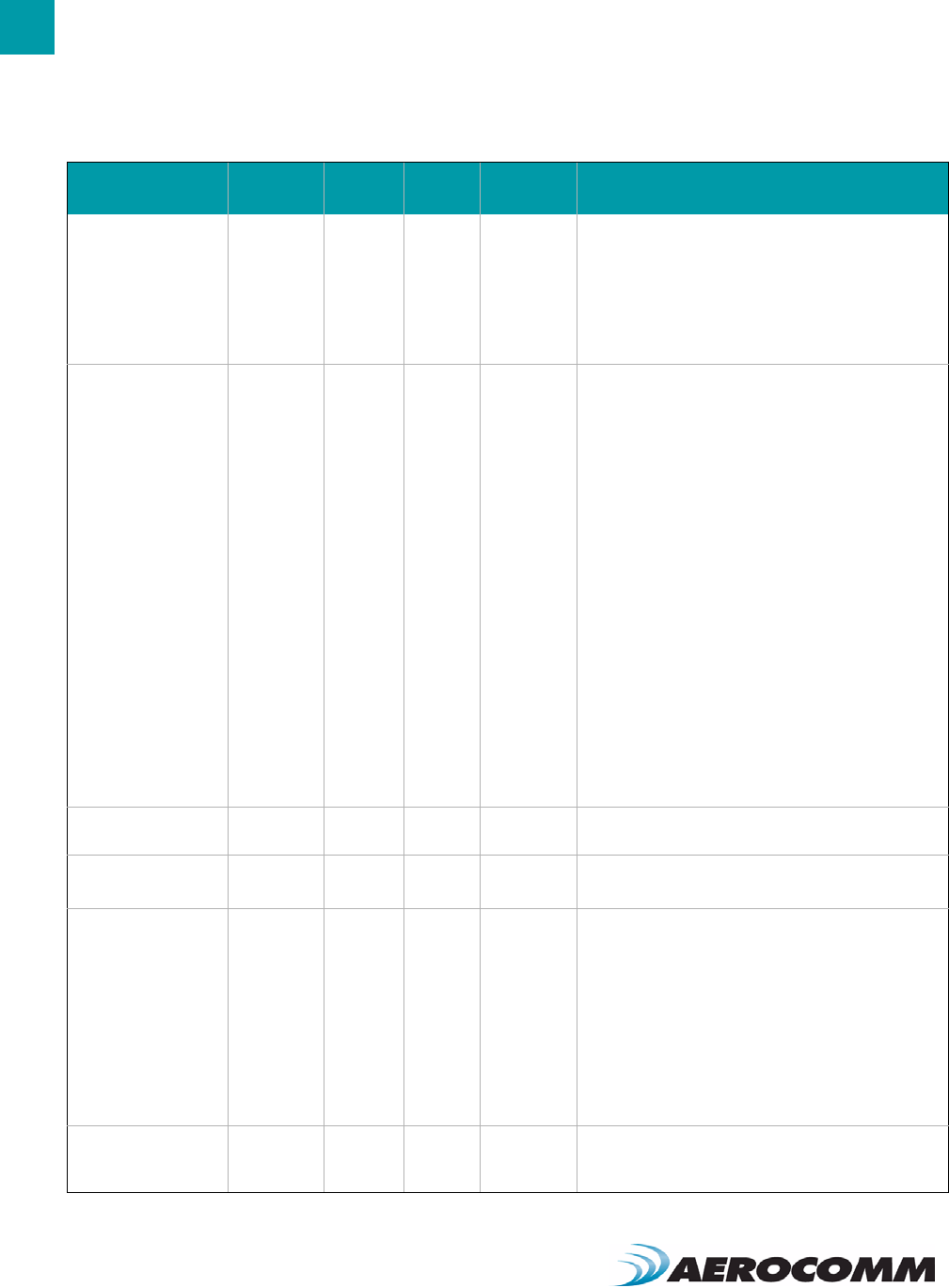
EEPROM PARAMETERS
34
Product ID 0x90 15 0x90 - 0x93: Product ID
0x94 - 0x95: Prefix (CL, CN, or AC)
0x96 - 0x99: Power (200M, 200A, 1000, 1x1)
Note: There will be a period in front of the 1x1 to keep the
field at four bytes
0x9A - 0x9C: Interface (232, 485, TTL)
0x9D - 0x9E: Setup script (01 is stock)
0x9F: Reserved for future use; always 0xFF
API Control 0xC1 10x10 Settings are:
bit-7: Broadcast packets
0 = Addressed Packets
1 = Broadcast Packets
bit-6: Probe
0 = Disable Probe
1 = Enable Probe
bit-5: SLock1
0 = Disable
1 = Enable
bit-4: SLock0
0 = Disable
1 = Enable
bit-3: Unicast Packets
0 = Broadcast or Addressed delivery
1 = Addressed packets only
bit-2: Send Data Complete Enable
0 = Disable
1 = Enable
bit-1: API Transmit Packet Enable
0 = Disable
1 = Enable
bit-0: API Receive Packet Enable
0 = Disable
1 = Enable
Protocol Status 0xC2 10x00 -
0xFF
0xE3 Determines if the GO0 & GO1 server as generic output or as
protocol status.
Session Count
Refresh
0xC4 10x00 -
0xFF
0x08 Specifies the number of hops a transceiver stays in session
with another transceiver
Random Back-Off 0xC3 10x00 -
0xFF
0x00 The random amount of time a transceiver waits when a
collision occurs before resending the packet again.
0x00: Disable Random Backoff
0x01: Wait 1-2 packet times, then retry
0x03: Wait 1-4 packet times, then retry
0x07: Wait 1-8 packet times, then retry
0x0F: Wait 1-16 packet times, then retry
0x1F: Wait 1-32 packet times, then retry
0x3F: Wait 1-64 packet times, then retry
0x7F: Wait 1-128 packet times, then retry
0xFF: Wait 1-256 packet times, then retry
Sesnse Adjust 0xC8 10x00 -
0xFF
Set in
Production
and can vary
The minimum RSSI required by a transceiver to establish a
session upon hearing a long beacon.
Table 12: EEPROM Parameters
Parameter EEPROM
Address
Length
(Bytes) Range Default Description
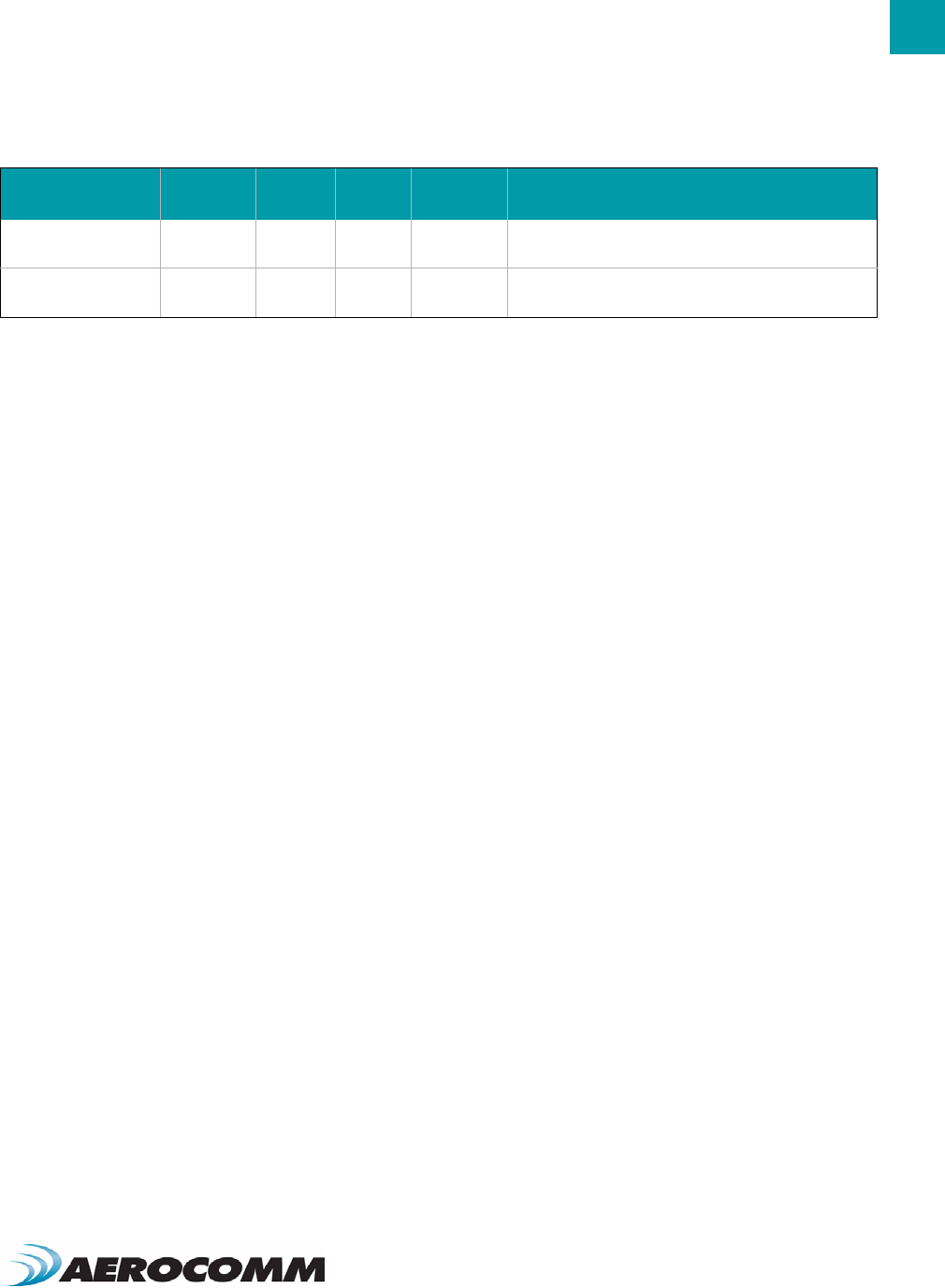
35
EEPROM PARAMETERS
www.aerocomm.com
Probe Report 0xC9 10x00 -
0xFF
0xE3 When set to 0xE3, upon receiving a probe the transceiver
sends a Probe Report to the OEM Host.
DES Key 0xD0 70x00 -
0xFF
56-bit Data Encryption key
Table 12: EEPROM Parameters
Parameter EEPROM
Address
Length
(Bytes) Range Default Description
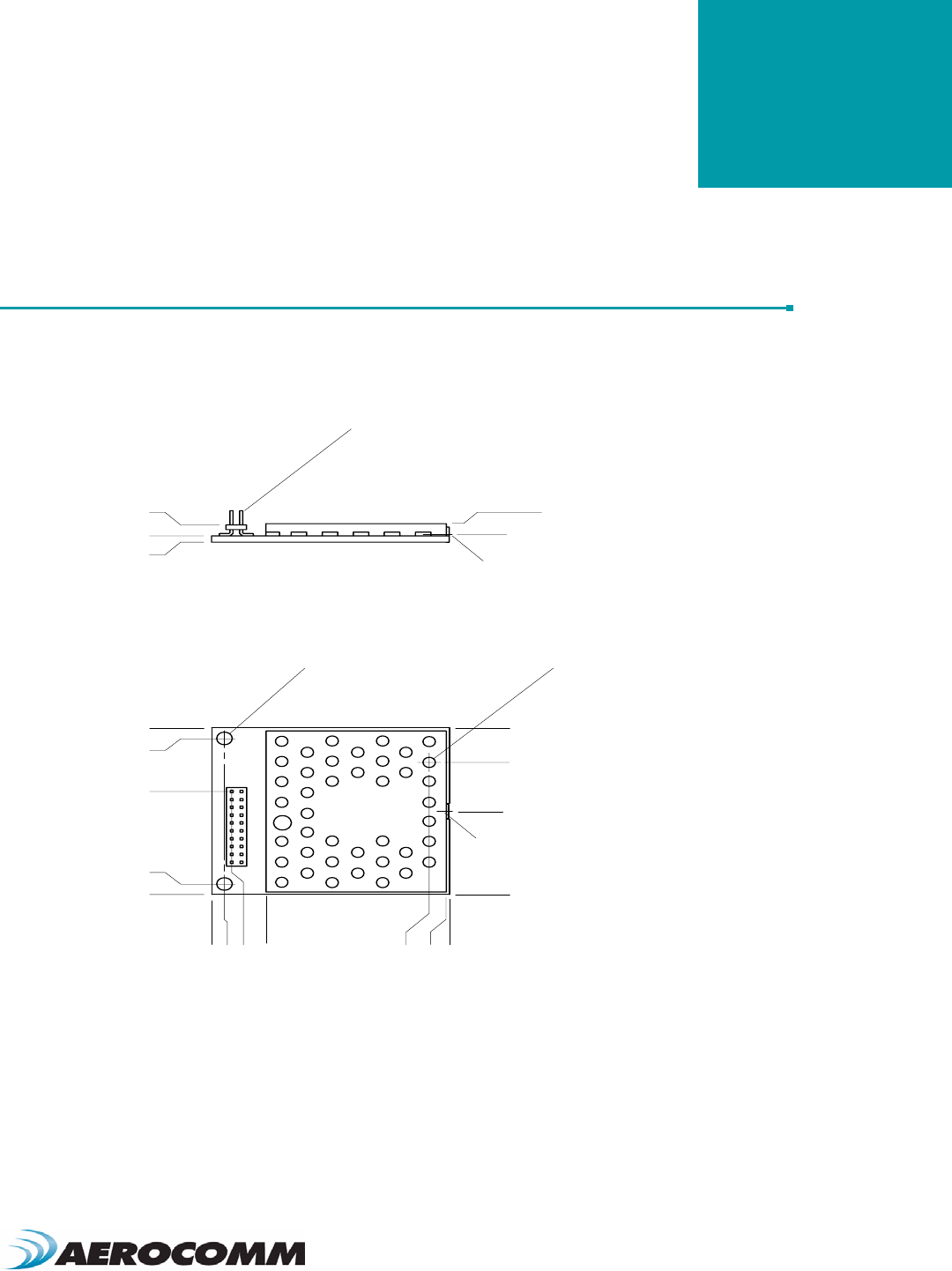
www.aerocomm.com
DIMENSIONS
8
MECHANICAL DRAWINGS
Interface Connector - 20 pin OEM Interface connector (Molex 87759-0030, mates with Samtec SMM-110-02-S-D
MMCX Jack - Antenna Connector (Johnson Components 135-3711-822)AC4790 (with MMCX connector) Mechanical
Figure 6: AC4790 (with MMCX connector) Mechanical
0.000
0.100
0.150
0.435
1.900
1.875
0.825
0.125 dia non-plated holes
(2) places
0.000
0.100
1.010
1.650
1.550
pins
1 2
1.650
0.000
0.067
0.000
0.157
0.062
0.180
MMCX jack
J1
20 pin header, 0.020 sq. posts
on 0.079 inch (2mm) centers
1.320
1.760
0.100 dia non-plated hole
(1) place, under shield
MMCX jack 0.145 dia
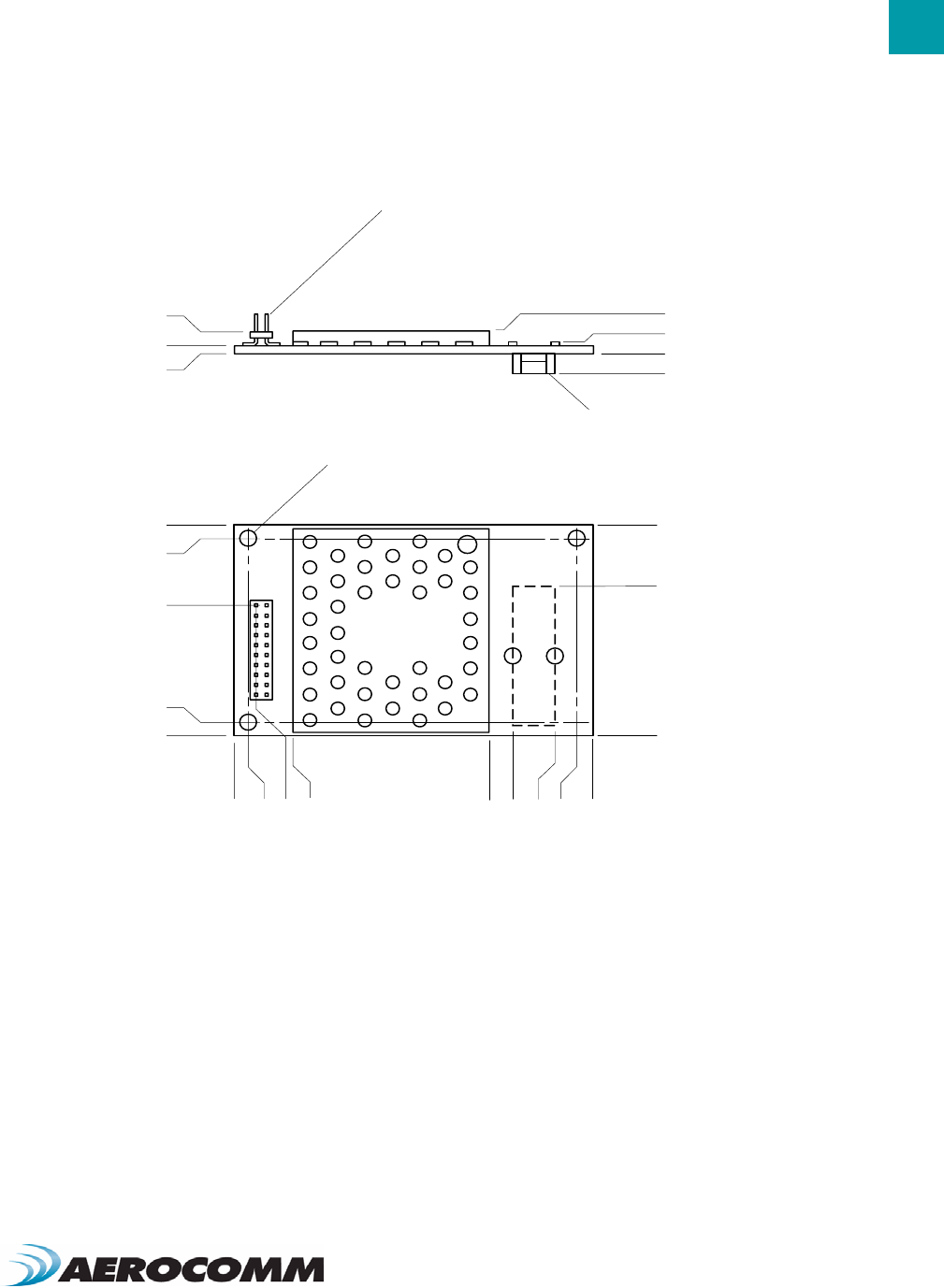
37
DIMENSIONS
www.aerocomm.com
Figure 7: AC4790 with integral gigaAnt Antenna (on bottom) Mechanical
0.000
0.100
0.150
1.875
2.550
2.650
0.435
0.125 dia non-plated holes
(4) places
0.000
0.100
1.010
1.650
1.550
pins
1 2
1.650
0.000
0.000
0.157
0.062
J1
20 pin header, 0.020 sq. posts
on 0.079 inch (2mm) centers
-0.152
0.000
0.180
0.086
1.180
2.030
2.345
GigaAnt Snap-In Antenna
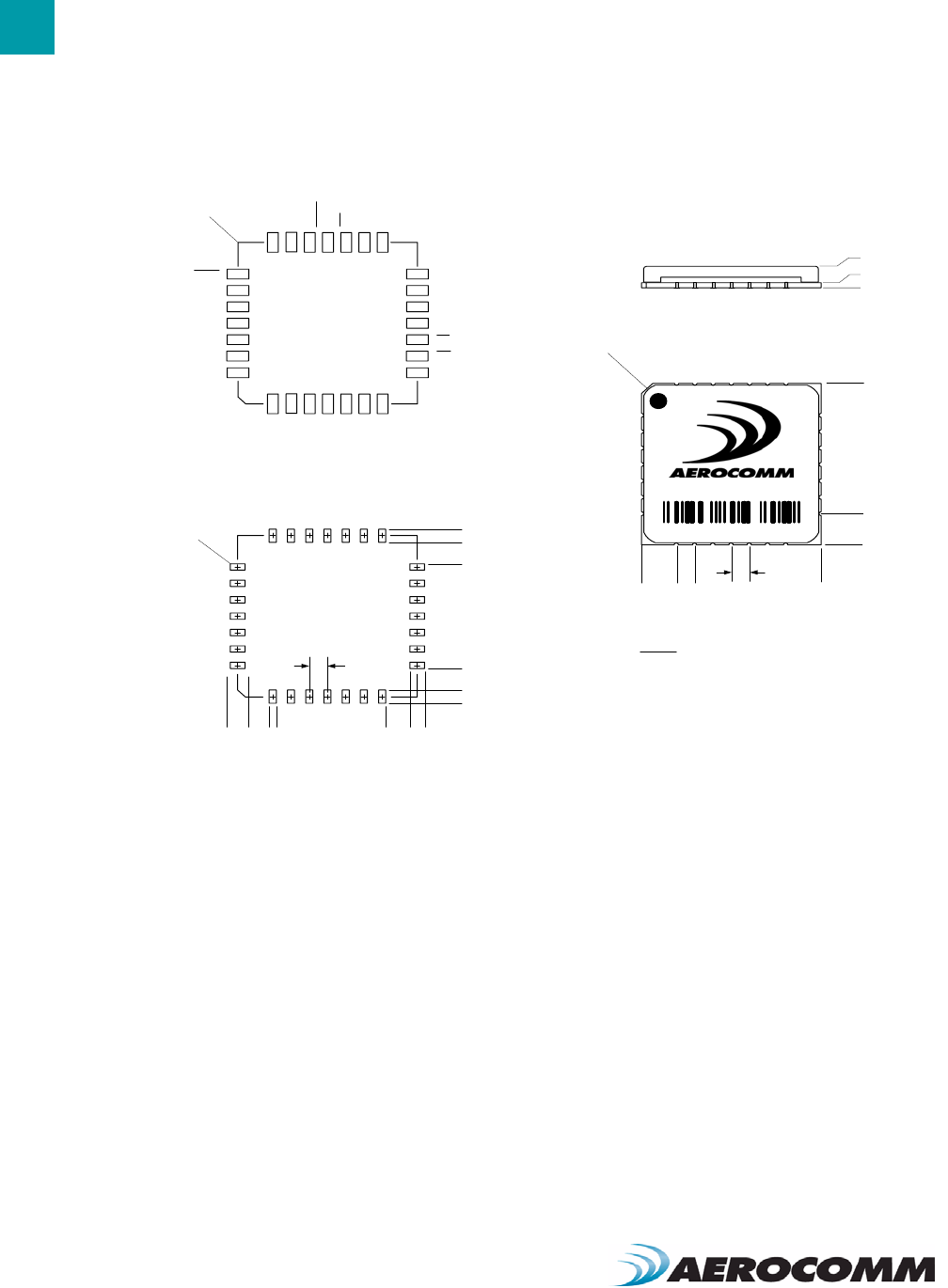
DIMENSIONS
38
Figure 8: AC4790-1x1 Mechanical
0.000
0.200
0.300
0.000
0.080
1.000
1.080
cut corner
indicates pin 1
0.031
0.000
0.131
AC4790-1X1
1.000
0.000
0.100 typ.
0.200
1.000
005068004503
0.220
0.260
0.10 typ.
0.860
0.080 x 0.040 pad
typical
RECOMMENDED PAD PATTERN
(viewed from top)
0.000
0.080
0.220
0.860
1.000
1.080
Module Outline
28
1
27
234567
26
25
24
23
22
21 20 19 18 17 16 15
8
9
10
11
12
13
14
N/C
CTS
RTS
VCC (note 1)
RSSI
GND (note 2)
RF_PORT
AD_IN
UP_RESET
CMD/DATA
SESSION
STATUS
DO1
NC
DI1
N/C
N/C
N/C
N/C
N/C
9600_BAUD (TST_MODE)
RESET
RXD
TXD
DI0
DO0
GND
VCC (note 1)
NC
Notes:
1) VCC must not exceed +3.3V DC.
2) This GND pin to be used for RF ground.
3) Operating temperature -40C to +80C
3) Storage temperature -60C to +140C
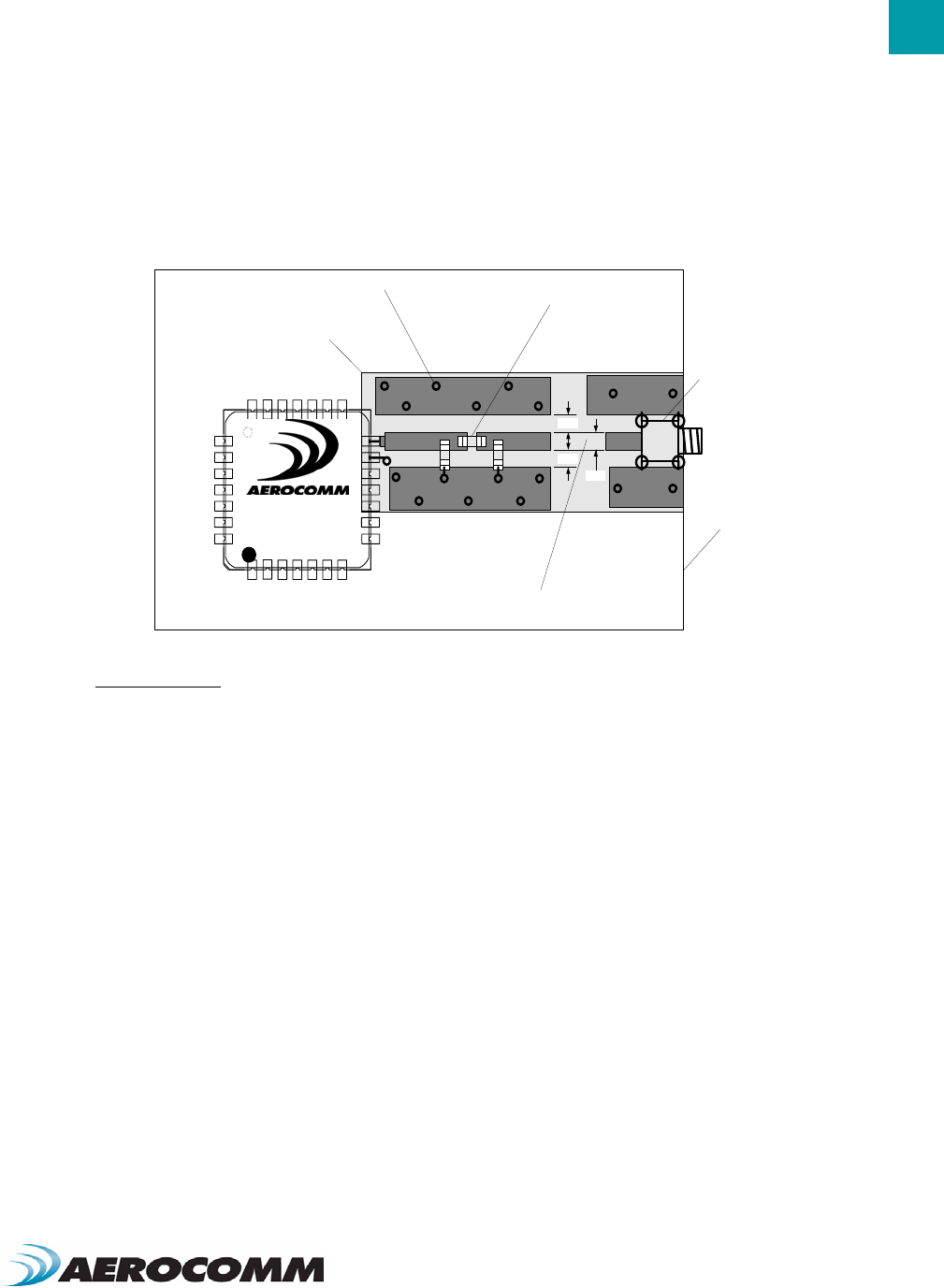
39
DIMENSIONS
www.aerocomm.com
Figure 9: AC4790-1x1 PCB Considerations
Gnd
Gnd
Gnd
PN: AC4790X-1X1
SN: 005068004503
uStrip
Gnd
0.110
0.110
0.110
1206 SMT Chip Capacitors, can
use 0805, 0603 or even 0402
parts. Shunt parts should be
symetrical about series part and
close as possible.
Terminate at RF
Antenna Connector
Note: Must provide solid copper
Ground plane on the bottom side of
pc board in this area.
Use several large vias (0.030" hole) to tie top
side ground to the bottom layer ground plane.
Must continue microstrip width and
grounds along the entire length.
Customer's PC Boa
r
PCB THickness Notes:
For 0.062 thick PC board microstrip width and
spacing is 0.110 inches.
For 0.031 thick PC board microstrip width and
spacing is 0.055 inches.
Note: Keep distance between 1x1 Module
and antenna connector as short as
possible for better performance.
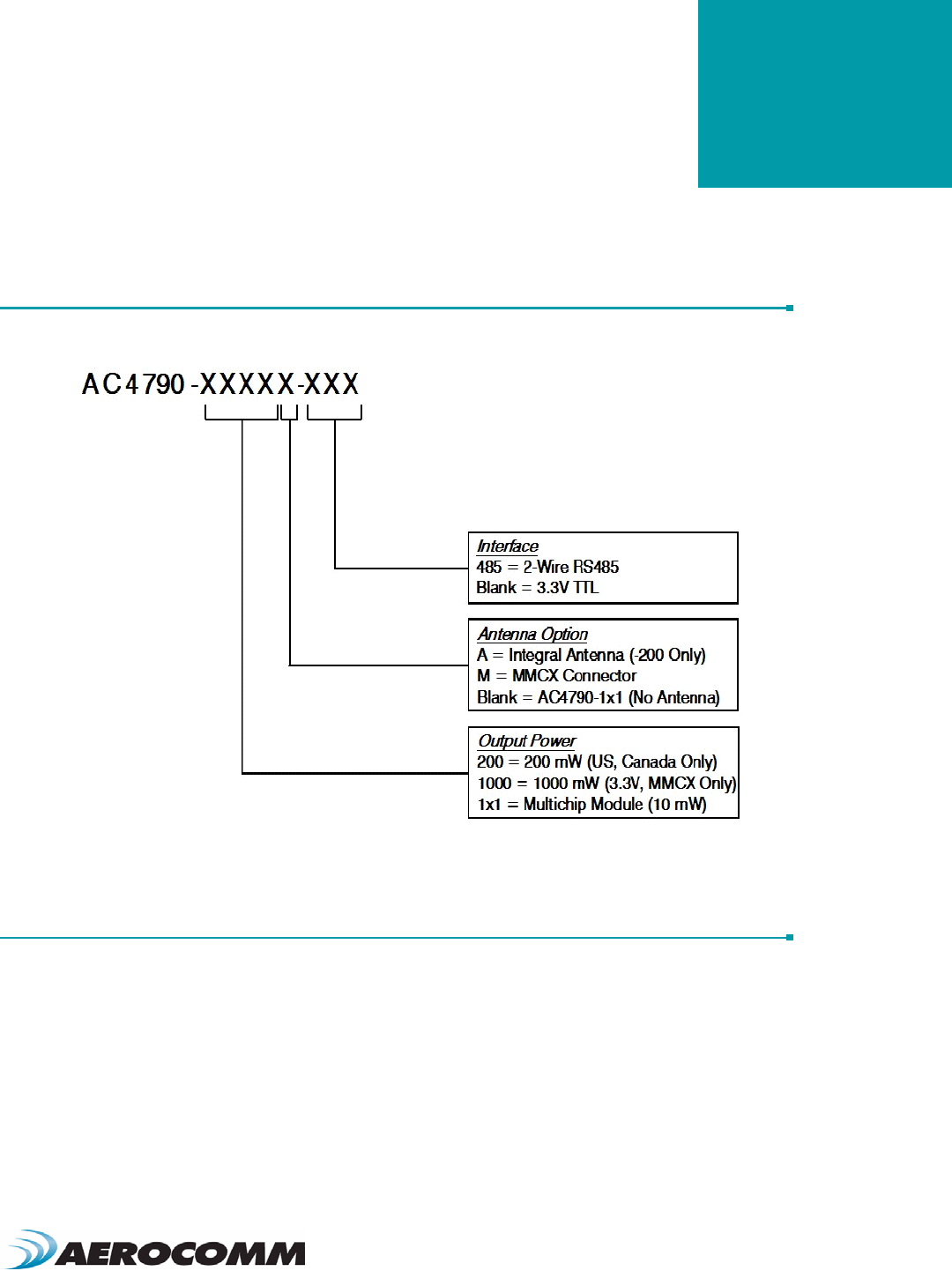
www.aerocomm.com
ORDERING INFORMATION
9
PRODUCT PART NUMBER TREE
DEVELOPER KIT PART NUMBERS
All of the above part numbers can be ordered as a development kit by prefacing the part number with “SDK-”. As an
example, part number AC4790-200A can be ordered as a development kit using the part number: SDK-AC4790-200A.
All developer’s kits include (2) transceivers, (2) development boards, (2) 7.5 VDC unregulated power supplies, (2)
serial cables, (2) USB cables, (2) antennas, configuration/testing software and integration engineering support.
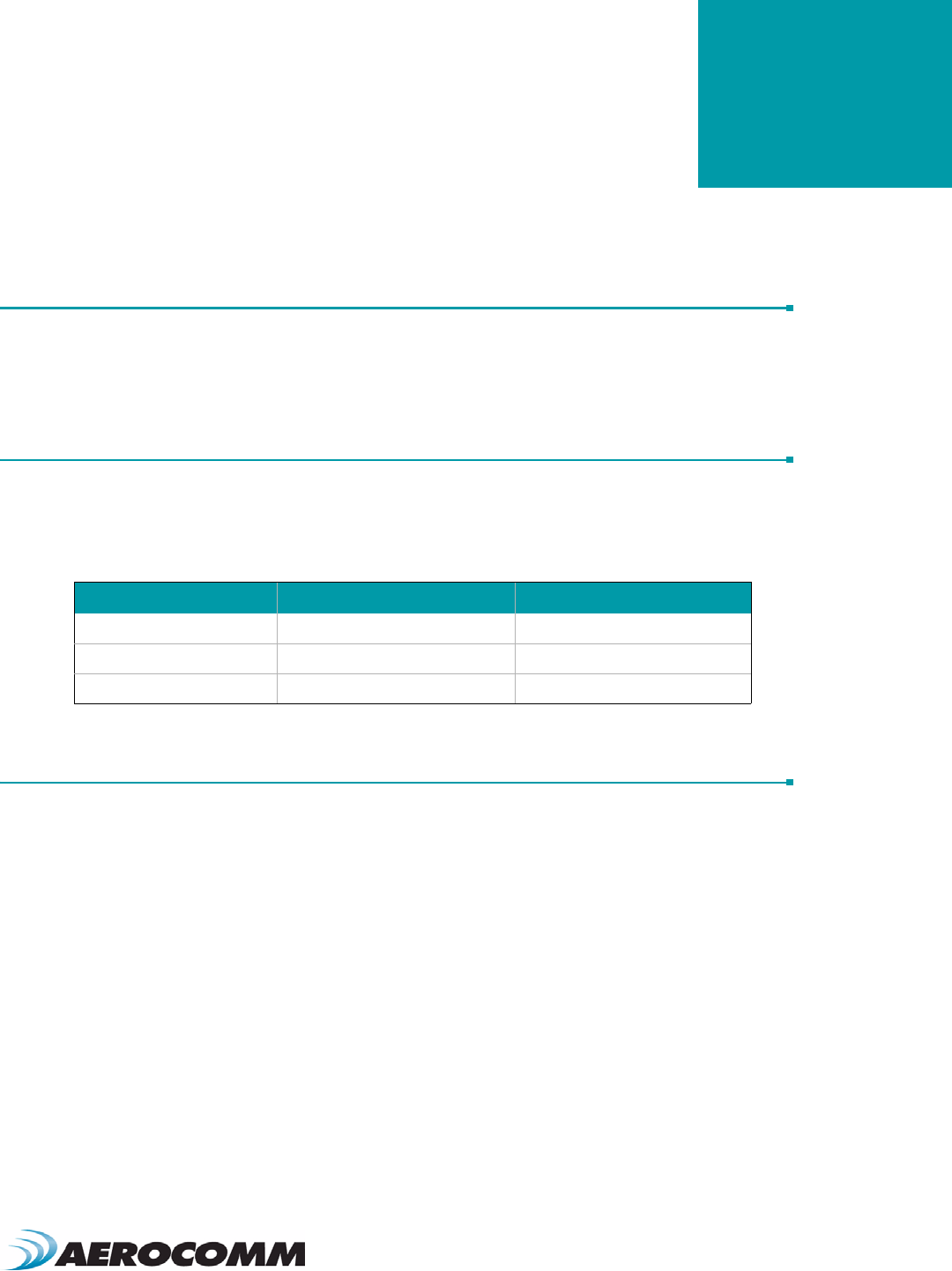
www.aerocomm.com
COMPLIANCY INFORMATION
10
AC4790-1X1
Due to the RF antenna trace residing on the OEM Host PCB, the FCC will not grant modular approval for the AC4790-
1x1 and requires the OEM to submit their completed design for approval. Contact AeroComm for the approval
procedure.
AGENCY IDENTIFICATION NUMBERS
Agency compliancy is a very important requirement for any product development. AeroComm has obtained modular
approval for its products so the OEM only has to meet a few requirements to be eligible to use that approval. The
corresponding agency identification numbers and approved antennas are listed below.
APPROVED ANTENNA LIST
The following antennas are approved for use with the AC4790 as identified. The OEM is free to choose another
vendor’s antenna of like type and equal or lesser gain as a listed antenna and still maintain compliance.
Table 13: Agency Identification Numbers
Part Number US/FCC Canada/IC
AC4790-200A KQLAC4490-100 2268C-AC4490
AC4490-200/AC4490LR-200 KQL-4x90-200 2268C-4x90200
AC4790-1000 KQL-AC4490 2268C-AC44901000
To reduce potential radio interference to other users, the antenna type and its gain should be so chosen that the
equivalent isotropically radiated power (e.i.r.p.) is not more than that permitted for successful communication.
This device has been designed to operate with the antennas listed below, and having a maximum gain of 11.0 dBd.
Antennas not included in this list or having a gain greater than 11.0 dBd are strictly prohibited for use with this
device. The required antenna impedance is 50 ohms.
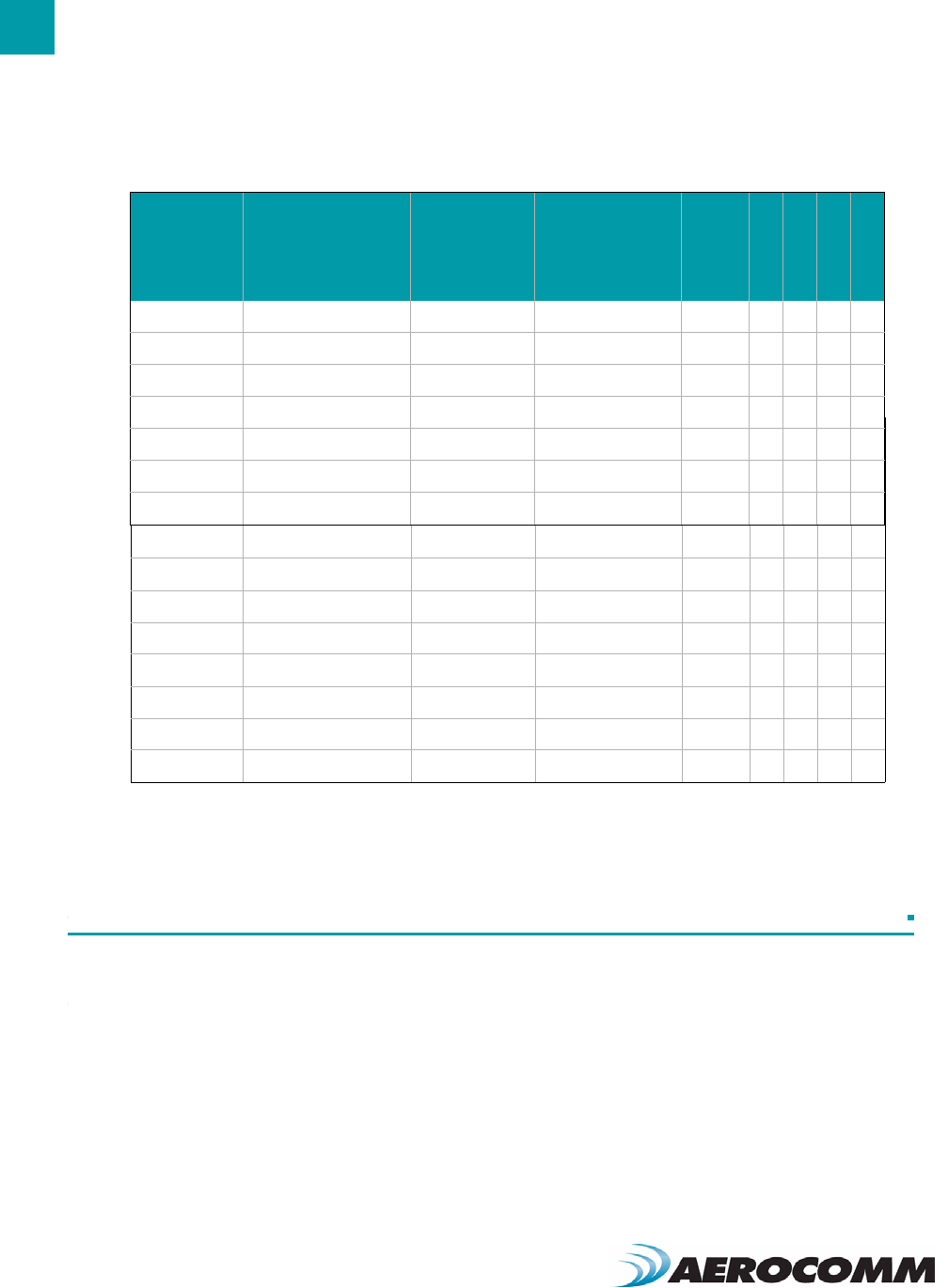
COMPLIANCY INFORMATION
42
FCC / IC REQUIREMENTS FOR MODULAR APPROVAL
In general, there are two agency classifications of wireless applications; portable and mobile.
Portable - Portable is a classification of equipment where the user, in general, will be within 20 cm of the transmitting
antenna. Portable equipment is further broken down into two classes; within 2.5 cm of human contact and beyond
2.5 cm (Note: Ankles, feet, wrists, and hands are permitted to be within 2.5 cm of the antenna even if the equipment is
designated as being greater than 2.5 cm). The AC4790 is not agency approved for portable applications. The OEM is
required to have additional testing performed to receive this classification. Contact AeroComm for more details.
Mobile - Mobile defines equipment where the user will be 20 cm or greater from the transmitting equipment. The
antenna must be mounted in such a way that it cannot be moved closer to the user with respect to the equipment,
although the equipment may be moved. (Note: Ankles, feet, wrists, and hands are permitted to be within 20 cm of
mobile equipment).
-1020B5812-04 Flavus gigaAnt Microstrip -0.5 X - - -
-Y22831Comtelco Yagi 6 dBd - X X X
-Y2283A0915-10RP Comtelco Yagi 6 dBd - X X X
-SG101N9152Nearson Omni 5 - X X X
-SG101NT-915 Nearson Omni 5 - X X X
-GM113 V.Torch Omni 3.5 - X X -
-PC8910NRTN Cushcraft Yagi 11 dBd - - X -
-ANT-DB1-RMS Antenna Factor Monopole 3 - X X -
1. Strictly requires professional installation.
2. Strictly requires professional installation.
2268C-AC44901000
Table 14: AC4790 Approved Antennas
AeroComm
Part
Number
Manufacturer Part
Number Manufacturer Type Gain
(dBi)
2
0
0
A
2
0
0
M
2
0
0
L
R
1
0
0
0
M
0600-00019 S467FL-5-RMM-915S Nearson 1/2 Wave Dipole 2 - X X X
0600-00025 S467FL-5-RMM-915 Nearson 1/2 Wave Dipole 2 - X X X
0600-00024 S467AH-915 Nearson 1/2 Wave Dipole 2 - X X X
0600-00027 S467AH-915R Nearson 1/2 Wave Dipole 2 - X X X
0600-00028 S161AH-915R Nearson 1/2 Wave Dipole 2.5 - X X X
0600-00029 S161AH-915 Nearson 1/2 Wave Dipole 2.5 - X X X
0600-00030 S331AH-915 Nearson 1/4 Wave Dipole 1 - X X X
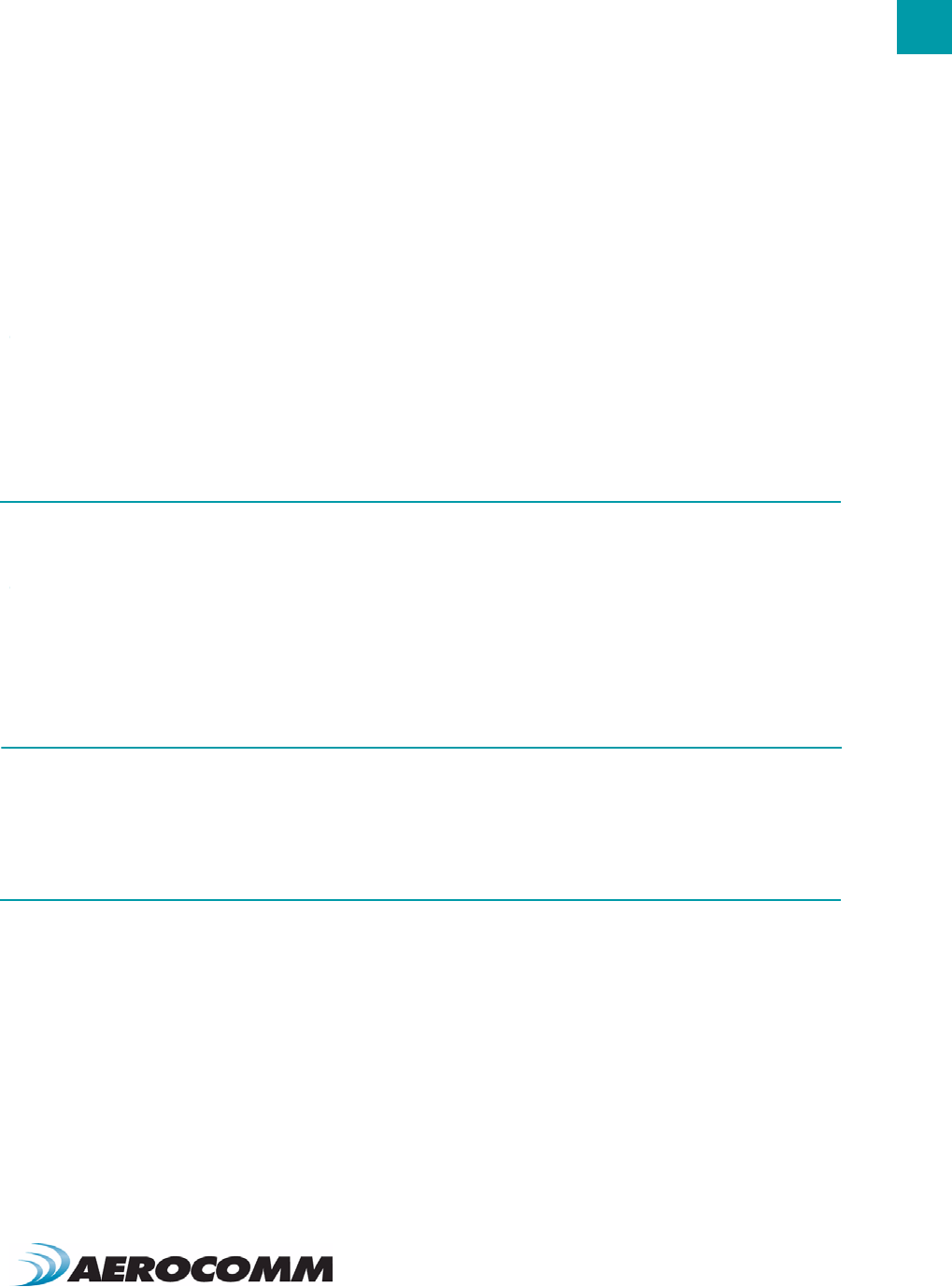
43
COMPLIANCY INFORMATION
www.aerocomm.com
Label and text information should be in a size of type large enough to be readiily legible, consistent with the
dimensions of the equipment and the label. However, the type size for the text is not required to be larger than eight
point.
ANTENNA REQUIREMENTS
WARNING: This device has been tested with an MMCX connector with the above listed antennas. When integrated
into the OEM’s product, these fixed antennas require professional installation preventing end-users from replacing
them with non-approved antennas. Antenna Y2283 & SG101N915 strictly require professional installation. Any
antenna not in the previous table must be tested to comply with FCC Section 15.203 for unique antenna connectors
and Section 15.247 for emissions. Contact AeroComm for assistance.
Caution: Any change or modification not expressly approved by AeroComm could void the user's authority to operate
the equipment.
WARNINGS REQUIRED IN OEM MANUALS
WARNING: This equipment has been approved for mobile applications where the equipment should be used at
distances greater than 20 cm from the human body (with the exception of hands, feet, wrists, and ankles). Operation
at distances of less than 20 cm is strictly prohibited and requires additional SAR testing.
CHANNEL WARNING
The OEM must prevent the end-user from selecting a channel not approved for use by the FCC.
OEM EQUIPMENT LABELING REQUIREMENTS
WARNING: The OEM must ensure that FCC labeling requirements are met. This includes a clearly visible label on the
outside of the OEM enclosure specifying the appropriate AeroComm FCC identifier for this product as well as the FCC
notice below. The FCC identifiers are listed above.
Contains FCC ID: KQLAC4490-100 / KQLAC4490 / KQL-4X90200
Operation is subject to the following two conditions: (1) this device may not cause
interference, and (2) this device must accept any interference, including interference
that may cause undesired operation of the device.
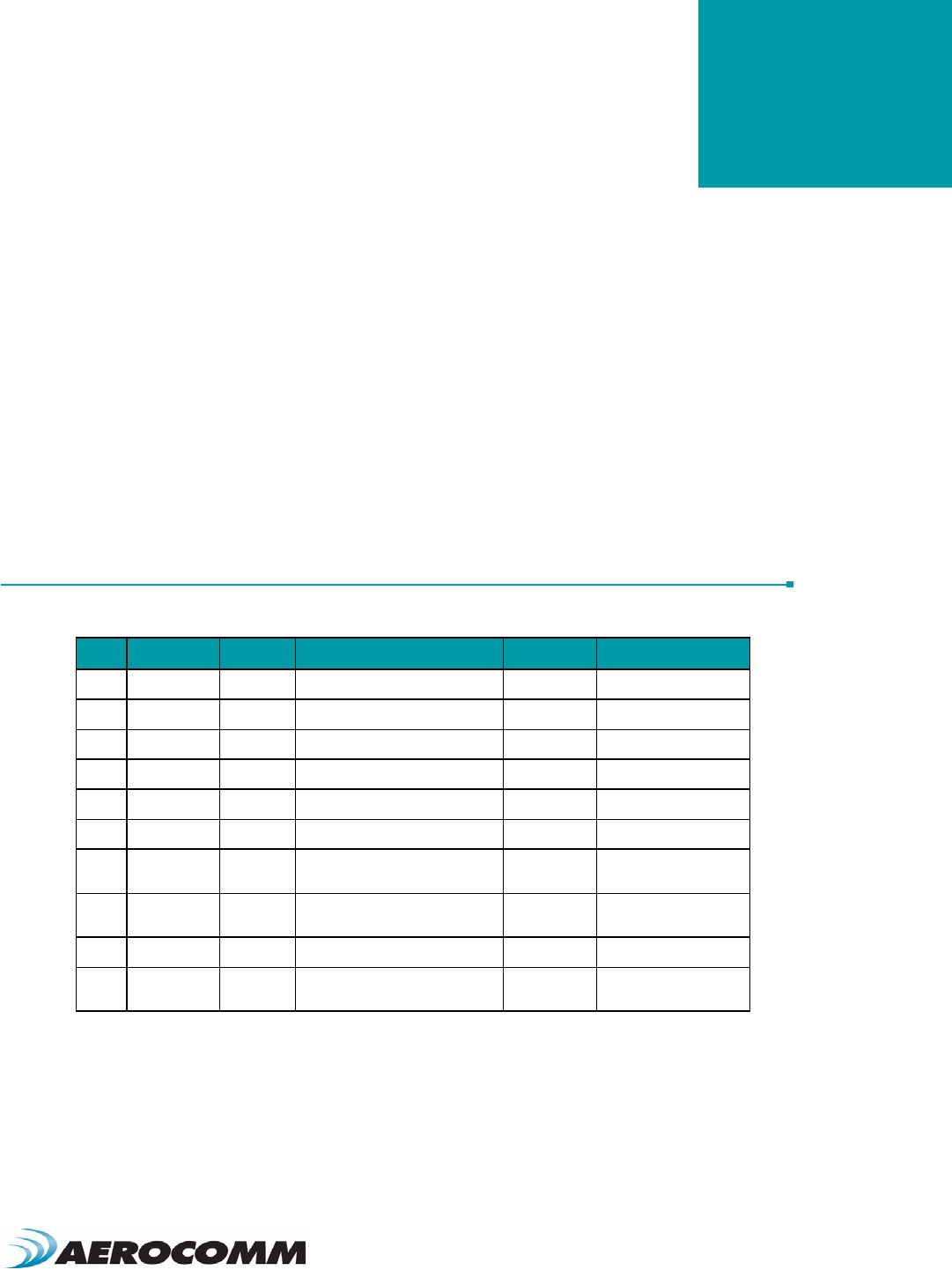
www.aerocomm.com
APPENDIX I - SAMPLE POWER SUPPLY
I
Below is a simple switching power supply that provides enough current to easily power any Aerocomm OEM module.
It utilizes low cost, off the shelf components that fit into a small area. This supply has an input voltage range of +6
volts to +18 volts and will output +3.4 volts at 1.5 amps.
Included is a schematic, bill of materials with manufacture's name and part numbers and a sample PCB layout. It is
important to follow the layout suggestions and use large areas of copper to connect the devices as shown in the
layout. It is also important to hook up the ground traces as shown and use multiple vias to connect input and output
capacitors to the bottom side ground plane.
If the input voltage will be less than 12 volts then C1 and C2 can be replaced with a single 100uF 20 volt capacitor
(same part number as C7). This will reduce board space and lower costs further. If you are powering an AC5124
module, R1 can be changed to a 373 ohm 1% resistor. This will change the output to +5 volts at 1.0 amps.
BILL OF MATERIALS
Table 15: Power Supply Bill of Materials
Qty Reference Value Description Mfg. Mfg. part number
1 R1 210 Res, 0603, 210, 1/16W, 1% KOA RK73H1JT2100F
1 R2 127 Res, 0603, 127, 1/16W, 1% KOA RK73H1JT1270F
2 C1 C2 47uF Cap, Tant, 7343, 47uF, 35V AVX TPSE476M035R0200
3 C3 C4 C5 0.1uF Cap, Cer, 0603, 0.1uF, Y5V, 25V Murata GRM39Y5V104Z025AD
1 C6 3300pF Cap, Cer, 0603, 3300pF, X7R, 50V Murata GRM39X7R332K050AD
1 C7 100uF Cap, Tant, 7343, 100uF, 20V Kemet T491X107K020A5
1 D1 B230/A Diode, SMB, B230/A, 2A, Schott-
key
Diodes, Inc. B230/A
1 D2 LL4148 Diode, MELF, LL4148, Switch
Diode
Diodes, Inc. LL4148
1 L1 15uH Xfmr, 2P, SMT, 15uH, 2A Coiltronics UP2.8B150
1 U1 CS51413 IC, CS51413, 8P, SO, Switch Reg
Ctrl.
On-Semi-
cond.
CS51413
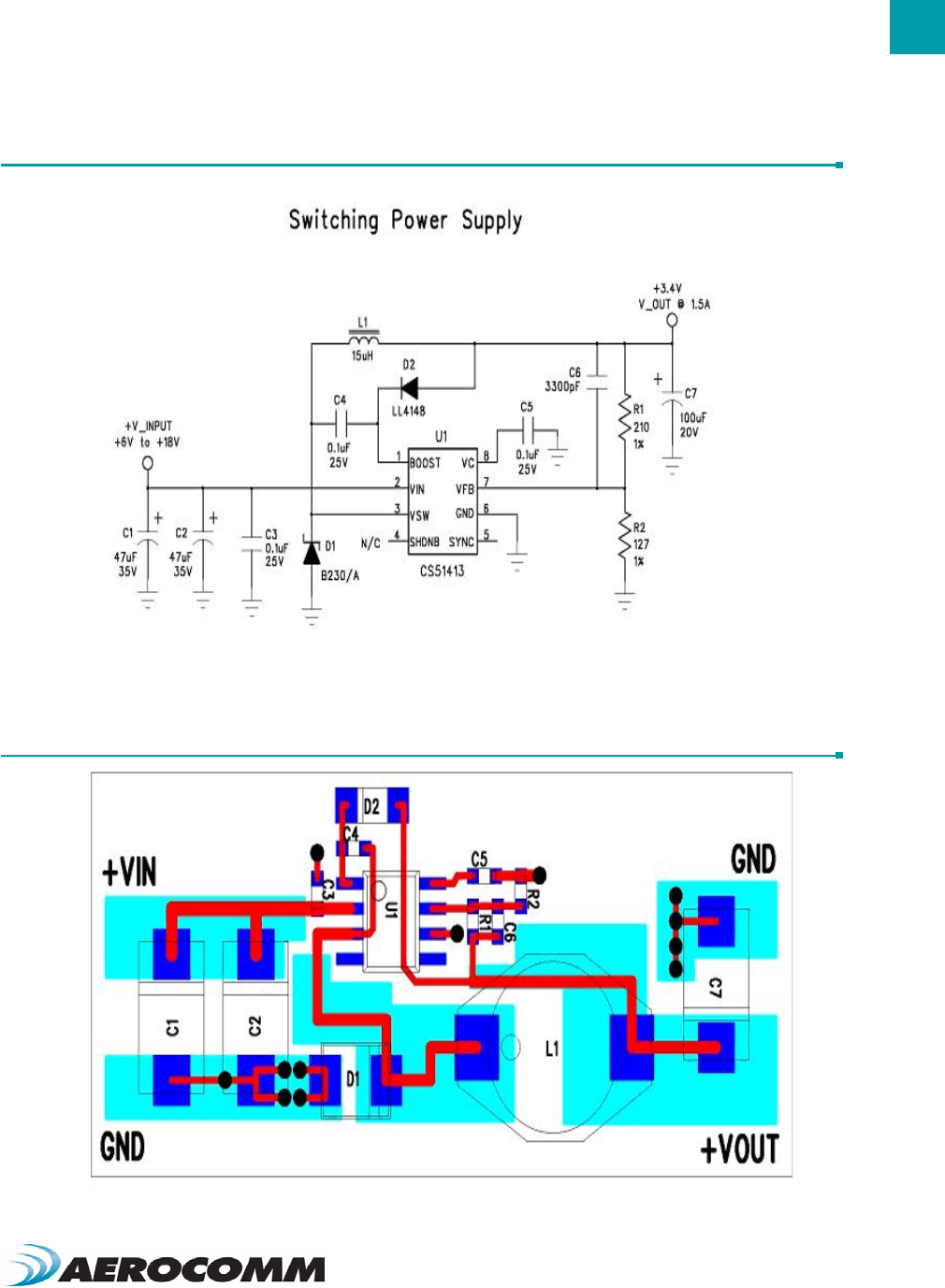
45
APPENDIX I - SAMPLE POWER SUPPLY
www.aerocomm.com
SCHEMATIC
PCB LAYOUT
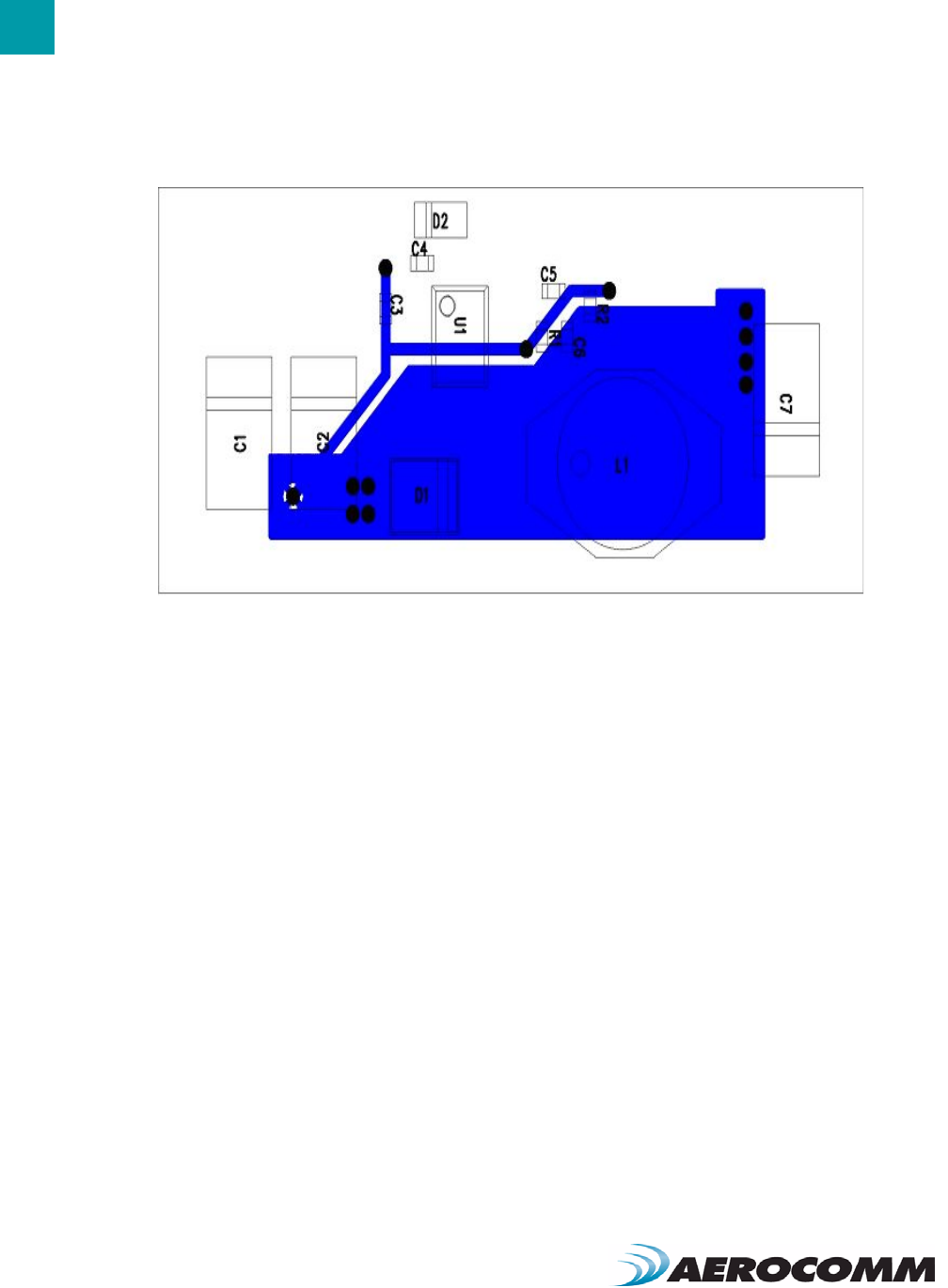
APPENDIX I - SAMPLE POWER SUPPLY
46
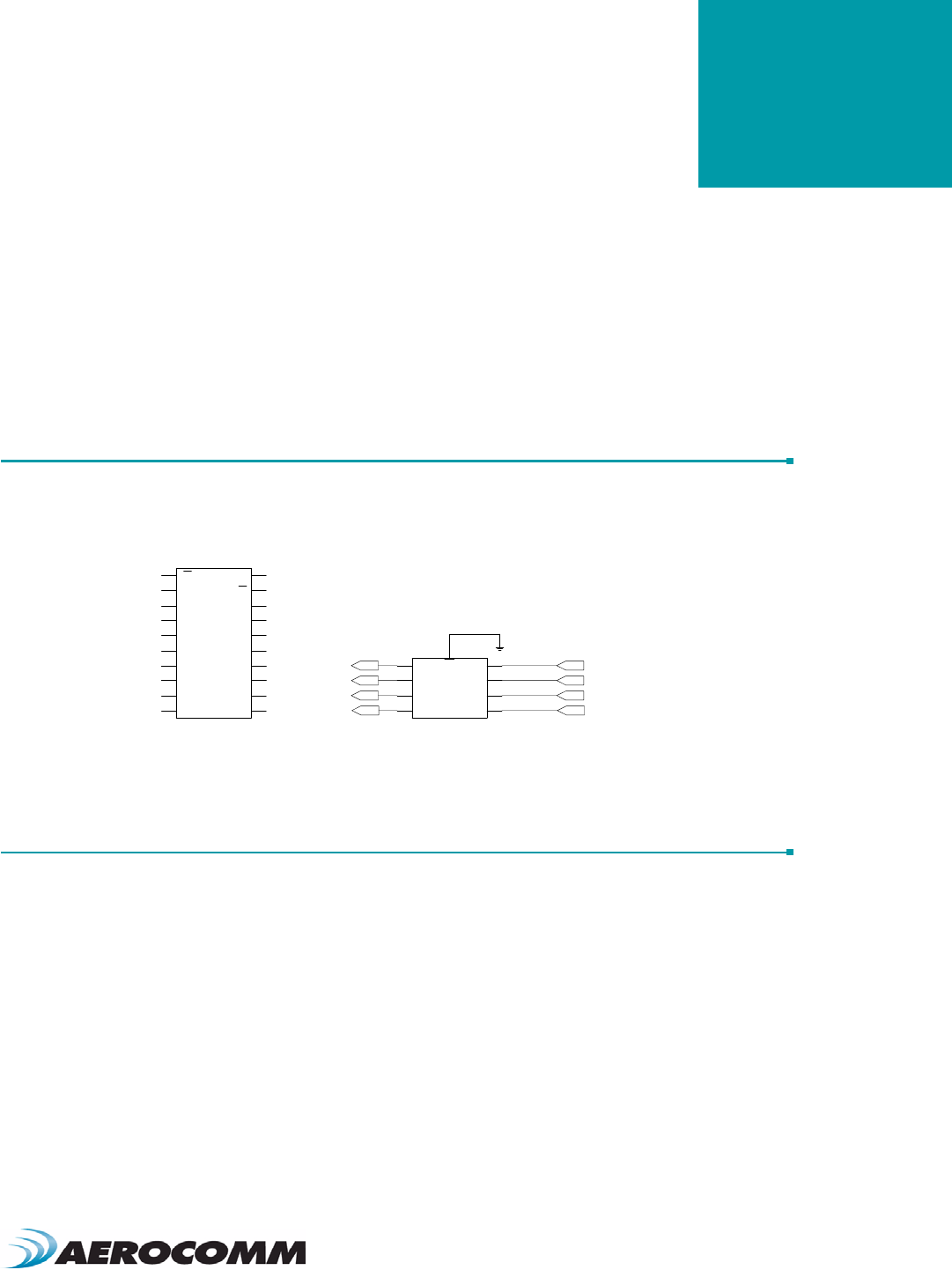
www.aerocomm.com
APPENDIX II - 5V TO 3.3V LEVELS
II
All inputs on the AC4790-200 & AC4790-1000 are weakly pulled high via 10 kohm resistors. The AC4790-200 has 5V
inputs while the AC4790-1000 & AC4790-1x1 have 3.3V inputs. The AC4790-200 uses an octal buffer to drop the 5V to
the required 3.3V level; the -1000 and -1x1 leave this to the OEM.
Some of the most common voltage conversion methods are described below.
VOLTAGE LEVEL CONVERSION IC’S
This is the easiest and most efficient method. Aerocomm recommends the TI SN74LVC244A Octal Buffer/Driver.
Inputs can be driven from either 3.3 or 5V systems, allowing the device to be used in a mixed 3.3/5V system.
PASSIVE RESISTOR VOLTAGE DIVIDER
While a resistor voltage divider can successfully drop the 5V to the required 3.3V, it will draw static current all of the
time. Typically this method is only suitable for one-way 5V to 3.3V conversion. When choosing the resistor values,
one needs to include the radio’s internal 10 kohm resistors on the input signals.
74LVC244
2Y0
GND
92Y0
10 GND
1Y3
2A0
1Y3
2A0
12
11
1OE
1
1A0
2
32Y3
41A1
VCC
2OE
1Y0
2A3
20
19
18
17
2Y2
5
1A2
6
72Y1
81A3
1Y1
2A2
1Y2
2A1
16
15
14
13
Y0
18
Y1
16
14 Y2
12 Y3
A0
A1
A2
A3
2
4
6
8
OE
1
Input A
Input B
Input C
Input D
74LVC244
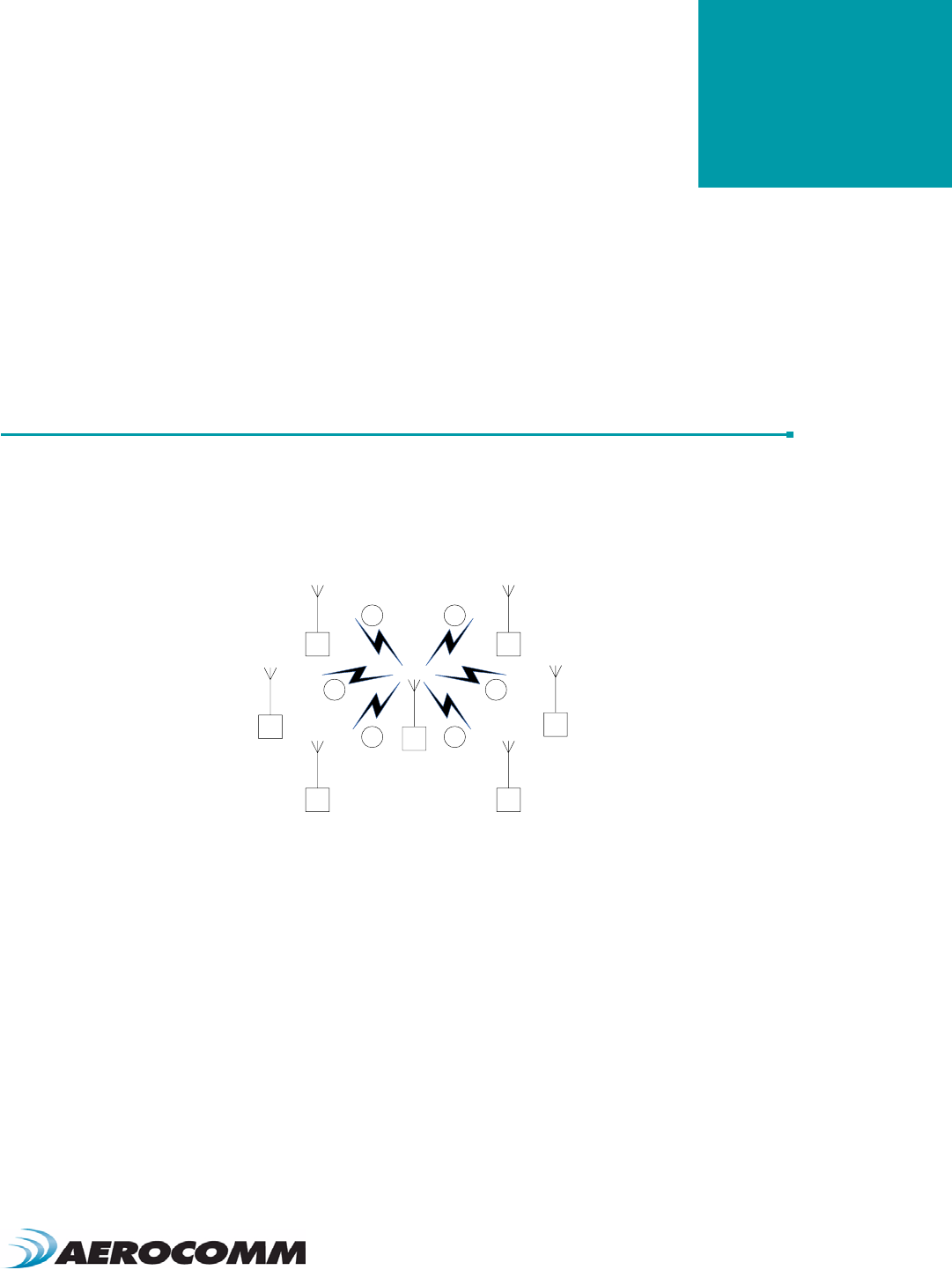
www.aerocomm.com
APPENDIX III - API
III
The API feature set of the AC4790 provides powerful packet routing capabilities to the OEM Host. The number of API
configurations is endless as individual radios can all be configured differently to suit the OEM Host’s varying needs.
Some of the most common implementations are described in the following pages.
POLLING NETWORK
Many applications require multiple locations to report back to a single access point. One solution would be to enter
Command mode, change the transceiver’s destination address and then exit Command mode to resume normal
operation. When it is time to communicate with another transceiver, the process would be repeated; costing time and
inevitably reduction in throughput as unnecessary commands are issued. As an alternative, the Transmit API
command can be used to control packet routing on a packet-by-packet basis.
The simplest implementation consists of a smart Shared Access Point (SAP) with a microcontroller or processor of
some type which has transmit API enabled. The SAP controls which transceiver(s) each packet is routed to.
Broadcast packets should be used when all remotes are to receive the same message and addressed packets when
communication with a single remote only is desired. An example of each is shown in the following pages.
MAC 12 34 56
Shared Access Point
MAC 12 34 A3
MAC 12 34 A2MAC 12 34 A1
MAC 12 34 A6
MAC 12 34 A4
MAC 12 34 A5
Channel: 0x10
System ID: 0x01
1 2
3
45
6
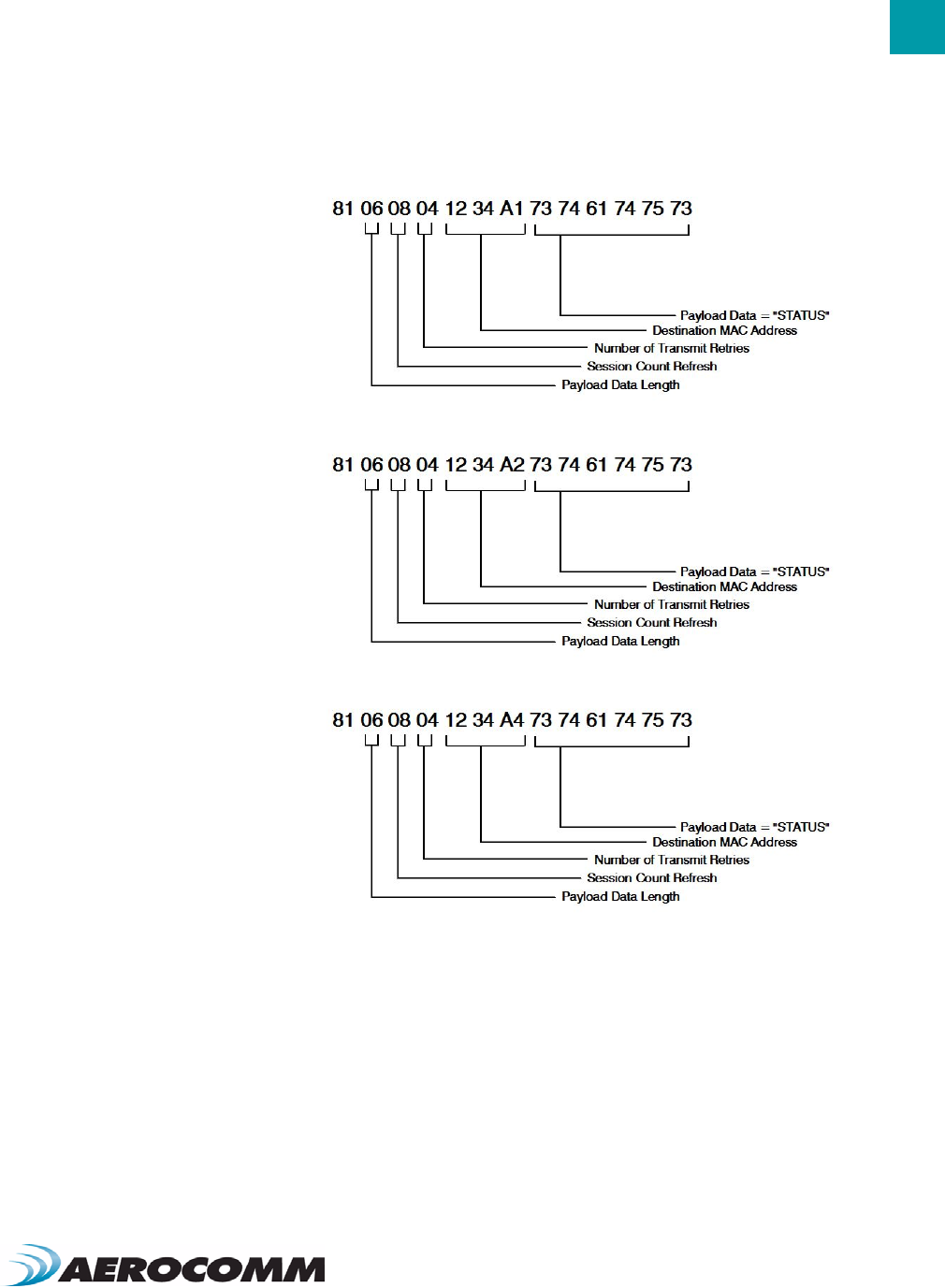
49
APPENDIX III - API
www.aerocomm.com
Addressed Transmit API
1To poll radio 1, the SAP transmits the packet using the following format:
2To poll radio 2, the SAP transmits the packet using the following format:
3To poll radio 2, the SAP transmits the packet using the following format:
4This continues until all radios have successfully been polled by the SAP.
Broadcast Transmit API
To send out a universal poll request or data packet, the OEM may wish to utilize the broadcast portion of the Transmit
API command. The Broadcast command is similar to the addressed command; only with the Destination MAC
Address set to all 0xFF.
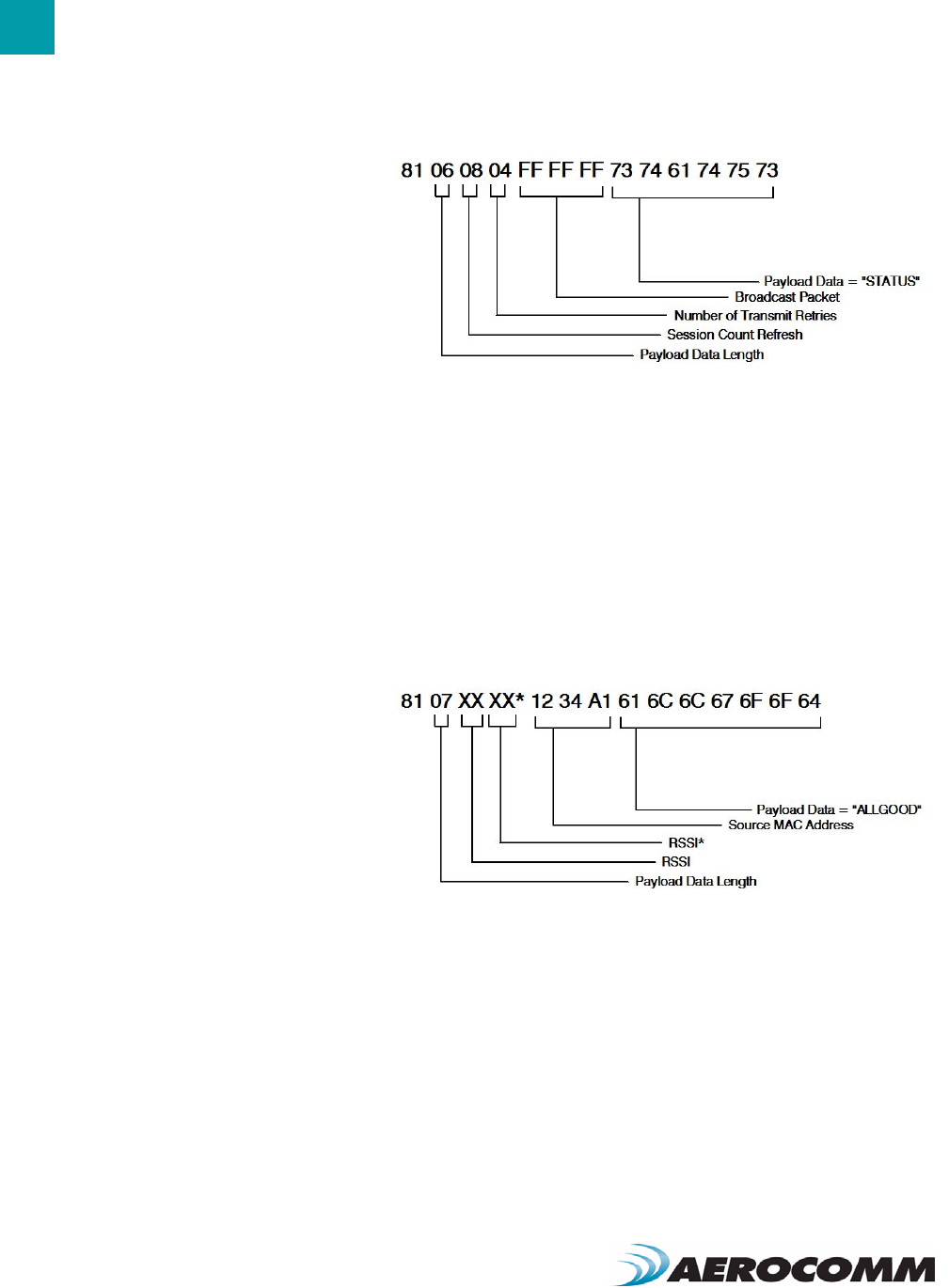
APPENDIX III - API
50
The remote response is dependent on the OEM’s specific needs and equipment. In many cases, remote radios are
connected to dumb devices without the intelligence to filter out or append specific portions of a packet that is
transmitted or received. Since the 7 bytes of overhead in the Transmit API command are not sent over the RF, the
remotes will receive only the payload data, “STATUS”. If auto destination is enabled on the remote radio, the
transceiver will automatically change its destination address to that of the radio it last received a packet from. When
the remote device sends its response, it will therefore automatically be routed back to the SAP.
Depending on the API configuration of the SAP, the packet will be received in one of two formats:
Receive API
When Receive API is enabled, the transceiver will receive the reply data + the MAC address of the source radio and
two RSSI values; RSSI is how strong the remote transceiver heard the local transceiver and RSSI* is how strong the
local heard the remote transceiver.
It may be useful to the OEM Host to determine which radio each packet originated from. When Receive API is
enabled, every packet received by the transceiver will be received in the above format.
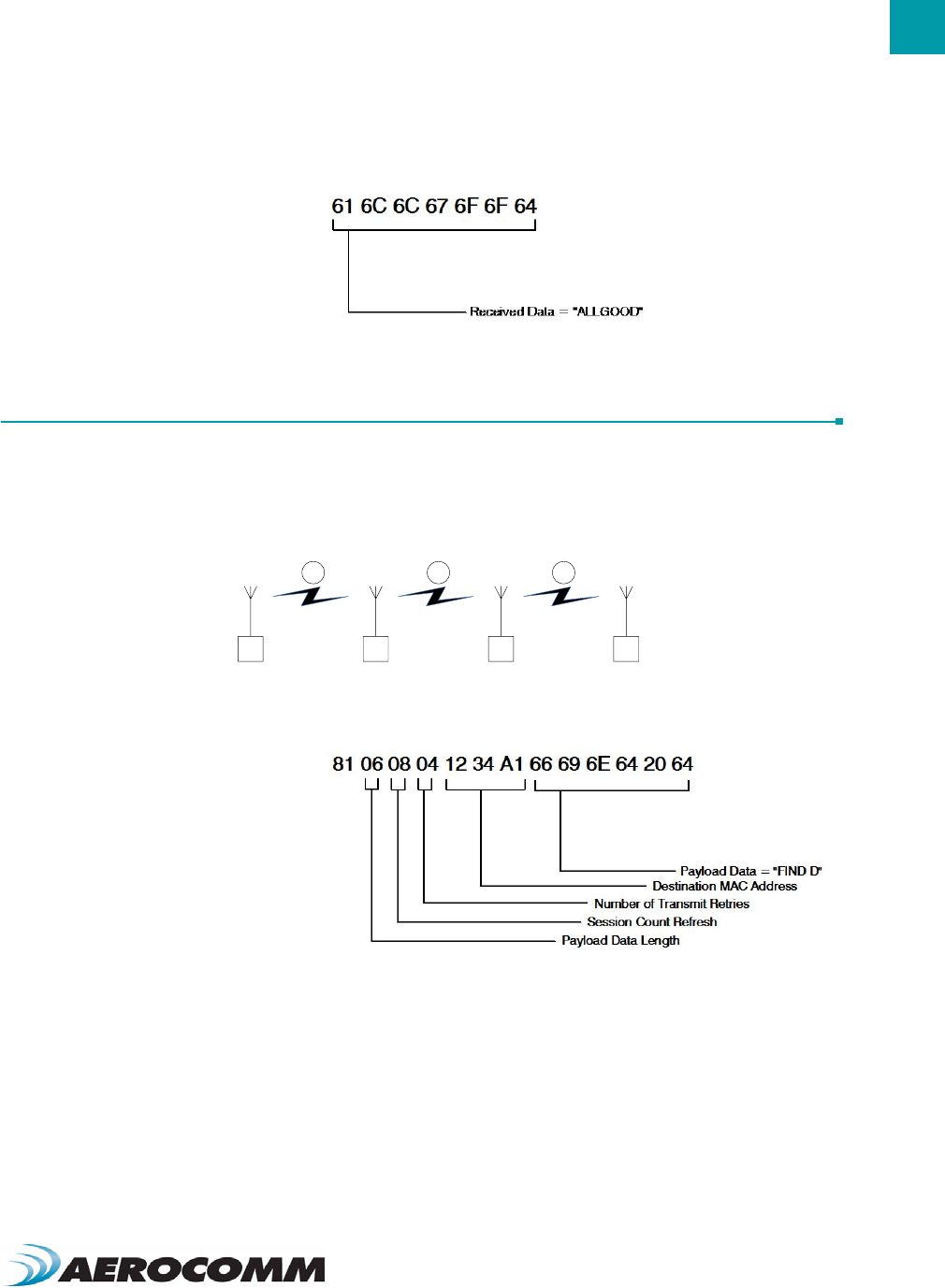
51
APPENDIX III - API
www.aerocomm.com
Normal Receive Mode (non-API)
If Receive API is not enabled, the transceiver will receive the reply data only (i.e. “ALLGOOD”) from each transceiver.
DAISY CHAIN / REPEATER NETWORK
For applications spanning long distances and cases where the desired radio is not within range of the sending radio,
a daisy chaing type network can be implemented. With the use of API commands, a processor and external buffer, a
daisy chain or repeater can easily be implemented to store and forward the data to the desired radio. The example
below assumes that radio A has a packet which needs to be received by radio D (far right).
1Radio A transmits the string “FIND D” to Radio B using the Transmit API command.
MAC 12 34 56 MAC 12 34 A3MAC 12 34 A2MAC 12 34 A1
1 2 3
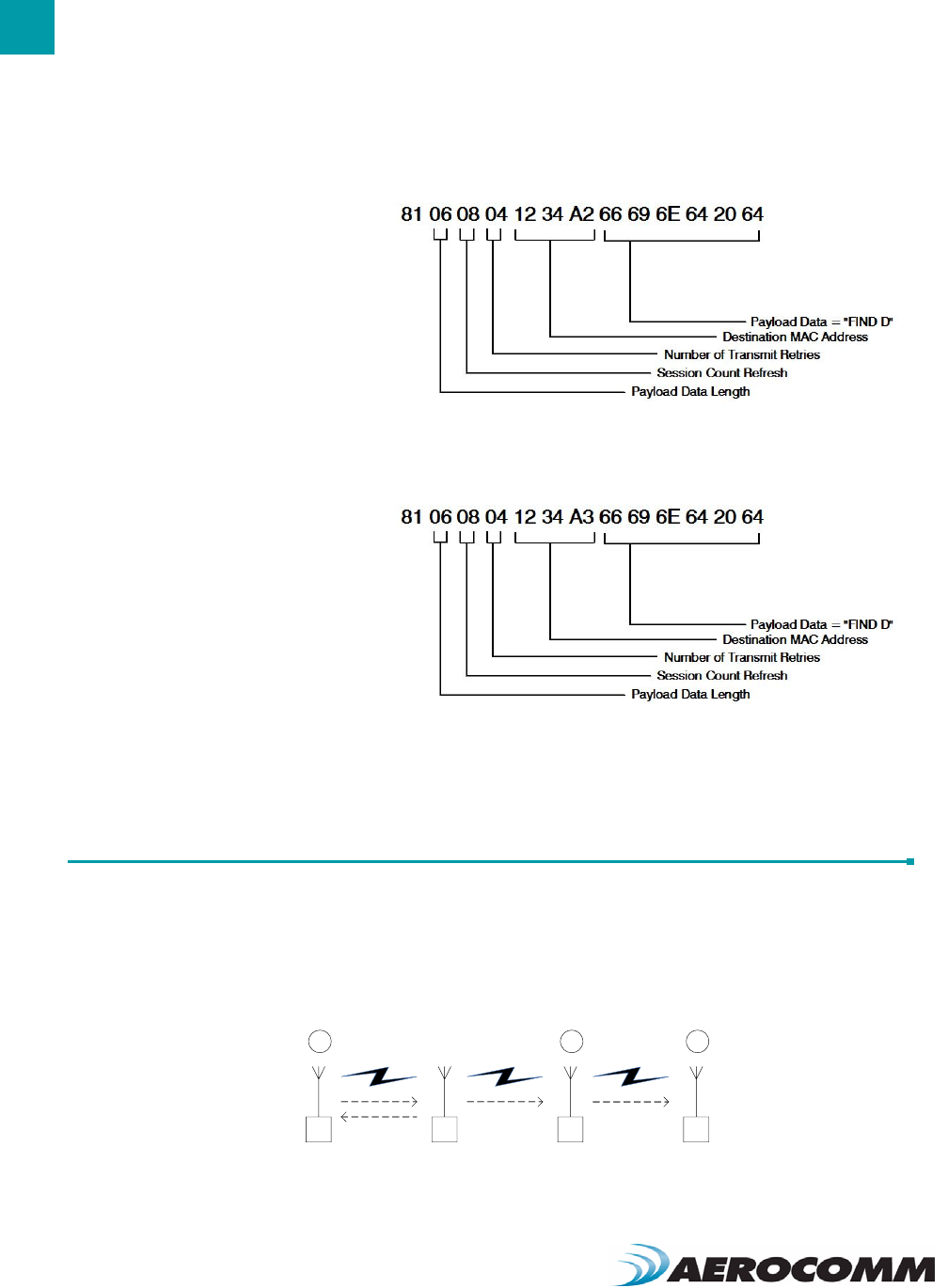
APPENDIX III - API
52
2Radio B receives the packet “FIND D”, and stores it in the buffer until the current session with Radio
A has ended. Once the current session ends, Radio B forwards the packet from its buffer to Radio
C.
3Radio C receives the packet “FIND D”, and stores it in the buffer until the current session with Radio
B has ended. Once the current session ends, Radio C forwards the packet from its buffer to Radio
D.
4Radio D receives the packet “FIND D” and sends the appropriate response back down the line to
Radio A.
LOOPBACK REPEATER
The simplest repeater to implement is a loopback repeater. A loopback repeater can be created by connecting the
transceiver’s RXD and TXD lines together. When the radio receives data, it will retransmit the data to all available
transceivers on the network. It is important not to have two loopback repeaters in range of each other as they will
continuously transmit data back and forth.
MAC 12 34 56 MAC 12 34 A3MAC 12 34 A2MAC 12 34 A1
Loopback Repeater
A B C
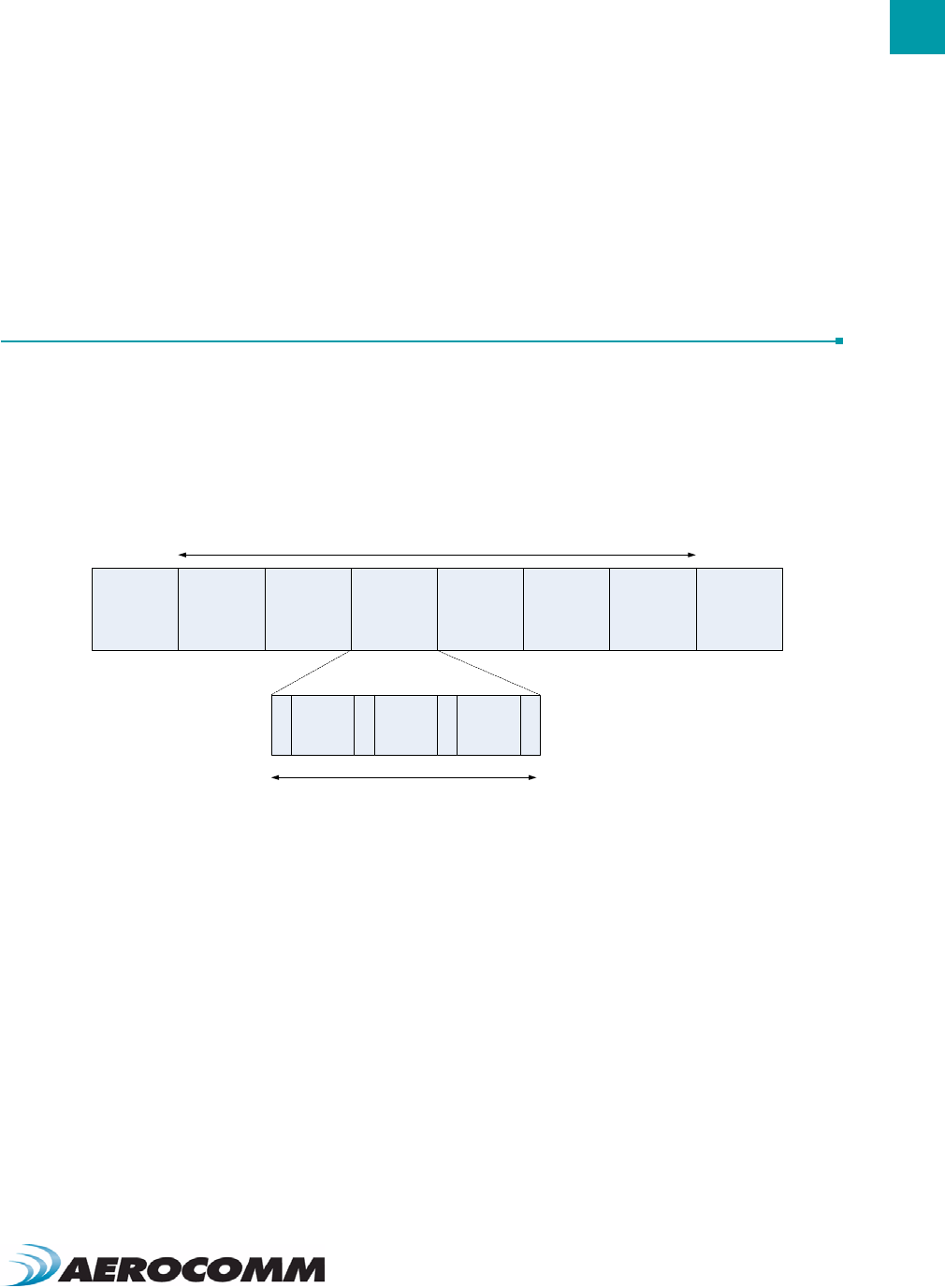
53
APPENDIX III - API
www.aerocomm.com
If radios B & C in the above picture are not within range of radio A, they will not be able to receive or respond to
communications from radio A. A loopback repeater can be added between the three such that it is in range of both
radio A and radios B & C. When the repeater receives a packet from radio A, it will transmit the packet out to radios B
& C. If the repeater is set to Broadcast mode, radio A will receive a copy of each packet that it sends. If the repeater
has a specific destination address (i.e. 12 34 A2), then radio A will not receive the packet as its MAC address will not
match the specified destination address.
TIME DIVISION MULTIPLE ACCESS NETWORK
For a more intelligent network, a TDMA system can be implemented. In this system various radios transmit data to a
Shared Access Point (SAP) during an assigned time interval. The system is synchronous so that only one radio is
transmitting at a time and has full access to the SAP’s bandwidth. In a TDMA network, each radio must store its data
for the amount of time between its transmissions or bursts. A typical format for data passing through a SAP is shown
below. A frame consists of arriving bursts from remote radios and each frame is then divided into multiple time slots.
The bursts can be of varying lengths and can be longer for heavy-traffic stations. To prevent overlaps, guard intervals
can be inserted to absorb small timing errors in burst arrivals.
Example:
•Shared Access Point (SAP) sends broadcast packet which includes a sync pulse
•Remote radios hear the sync pulse and join the session
•Radio A transmits during time interval t = 1
•Radio B transmits during time interval t = 2
•Radio N transmits during time interval t = N - 1
This type of implementation requires careful planning and should allow enough time for retries if necessary. When full
duplex is enabled, the radio which initiated the Session (SAP) will transmit during the even numbered hops and the
remote radios will transmit only during odd numbered hops.
123456
GB1 Radio A Data GB2 Radio B Data GB3 GB4Radio C Data
6 1
TDMA Frame
1 Timeslot
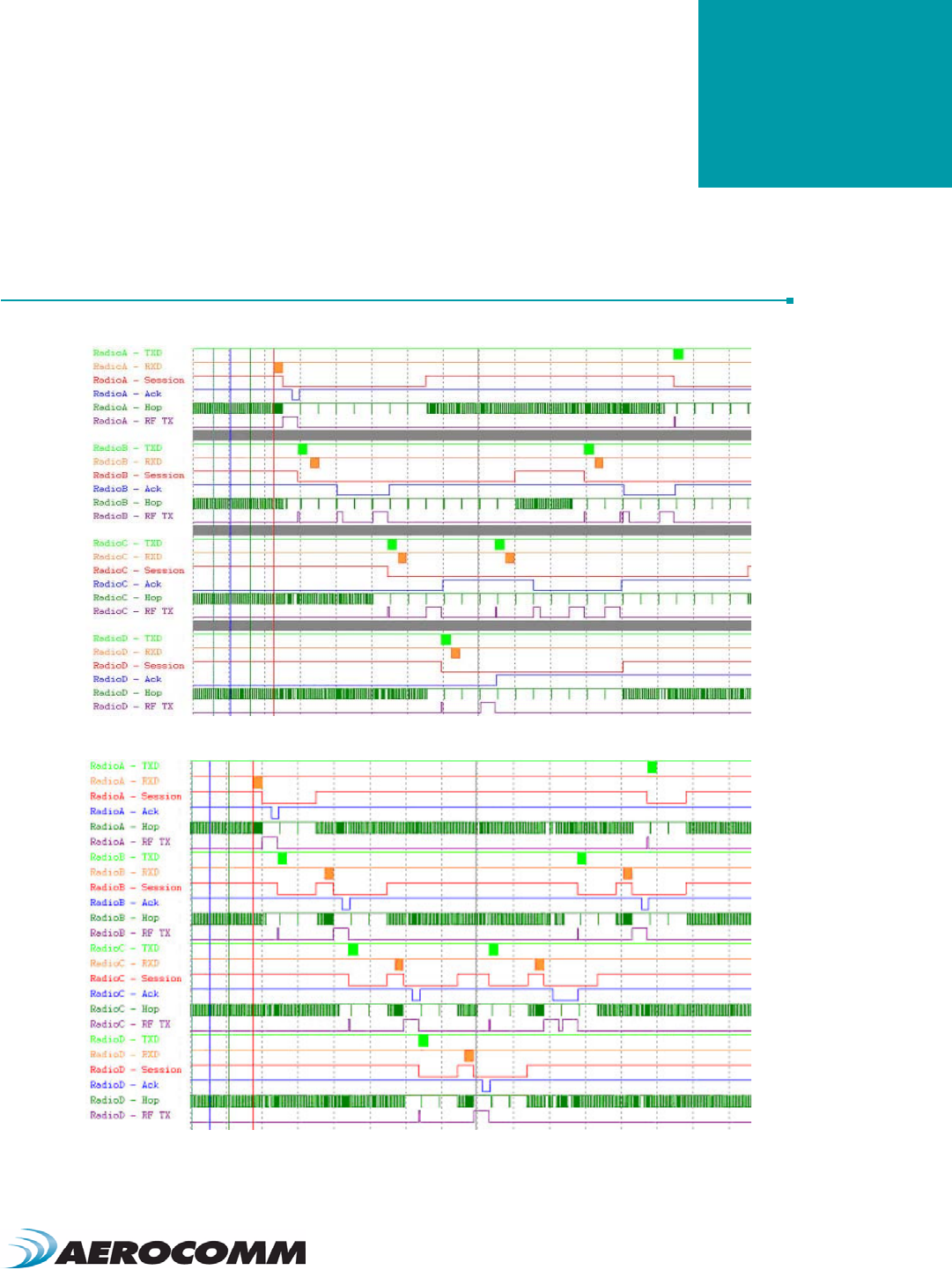
www.aerocomm.com
APPENDIX IV - API TIMING DIAGRAMS
IV
TIMING DIAGRAMS
Session Count = 8, Retries = 3
Session Count = 3, Retries = 3
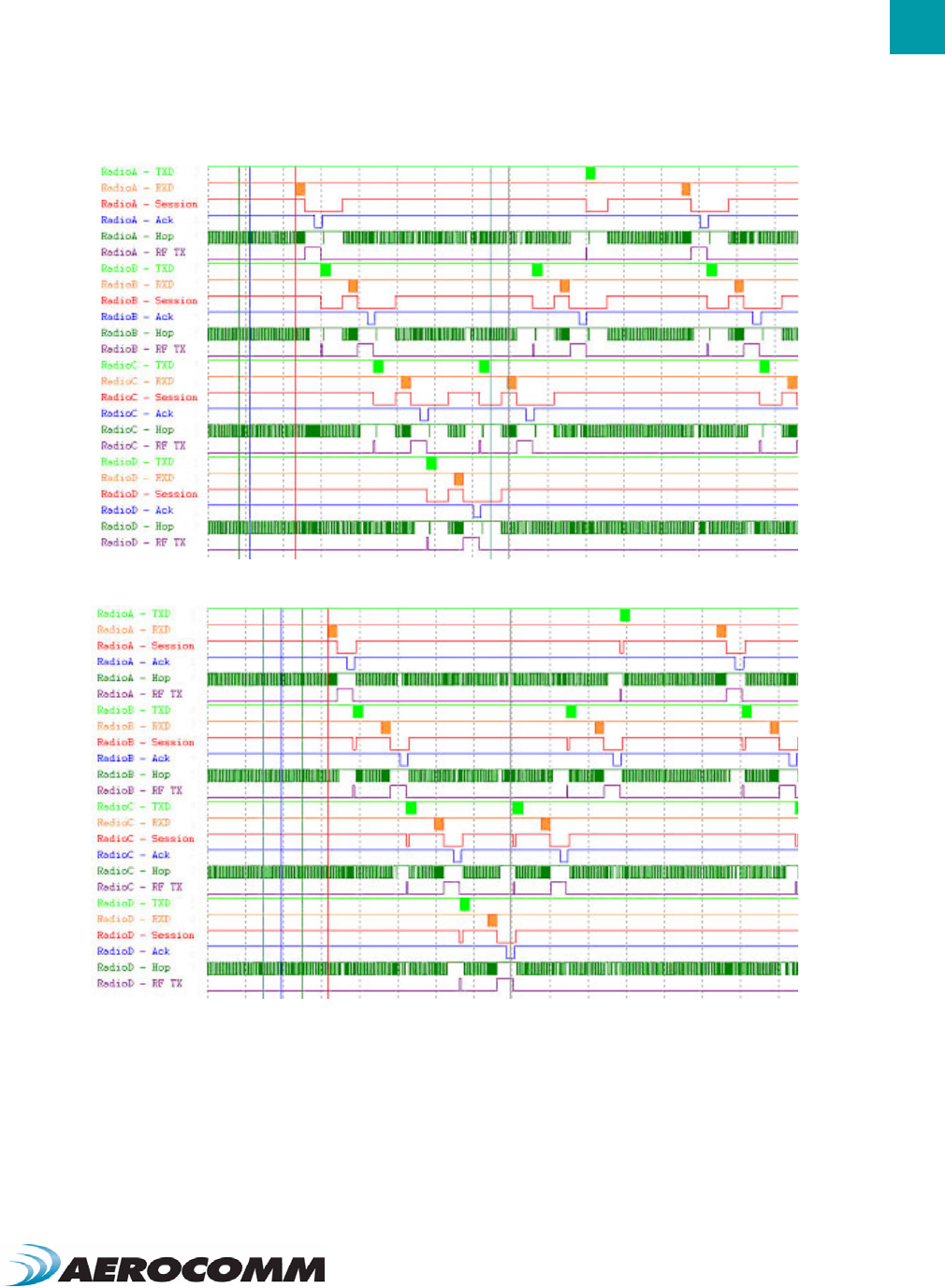
55
APPENDIX IV - API TIMING DIAGRAMS
www.aerocomm.com
Session Count = 2, Retries = 2
Session Count = 1, Retries = 1